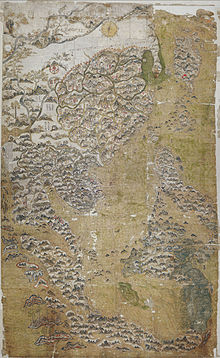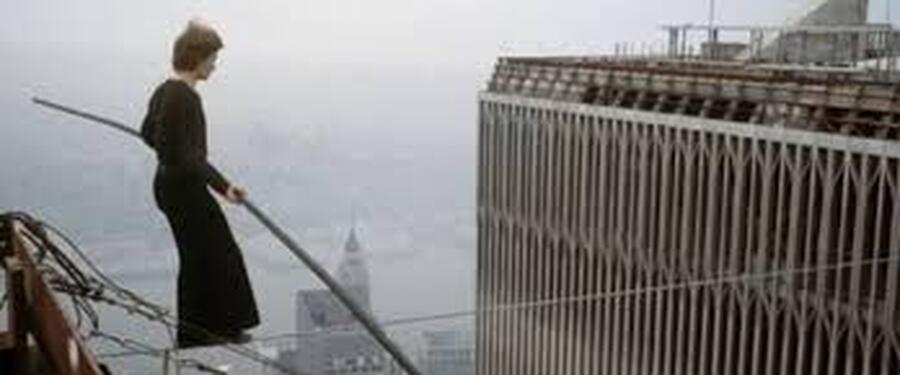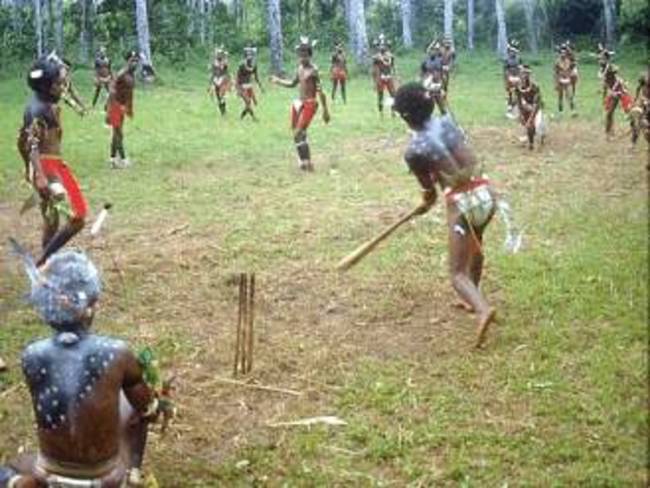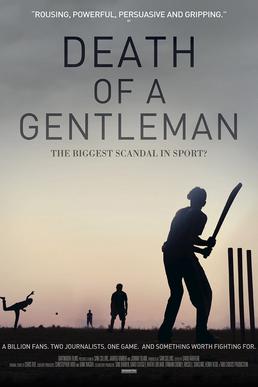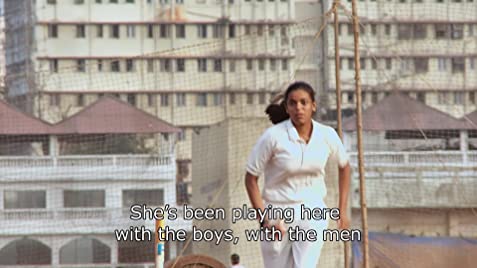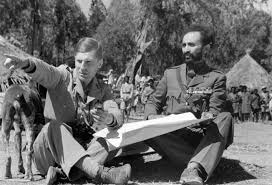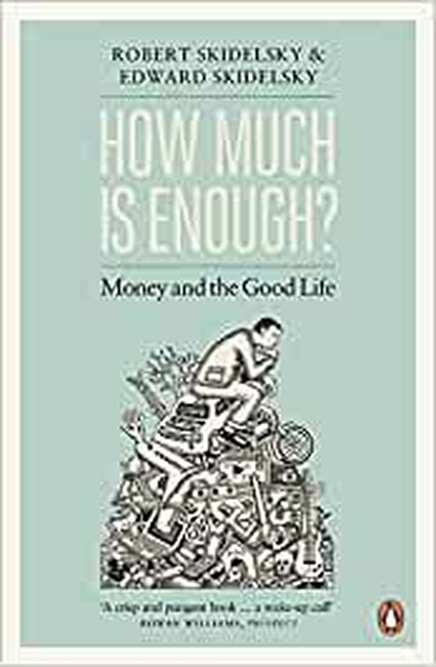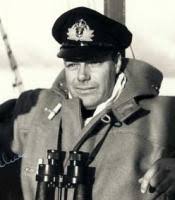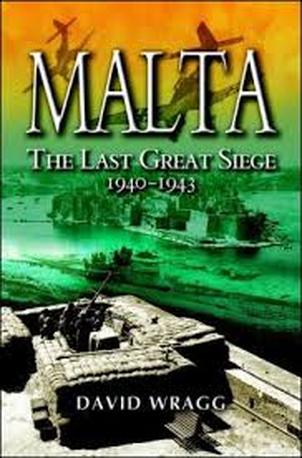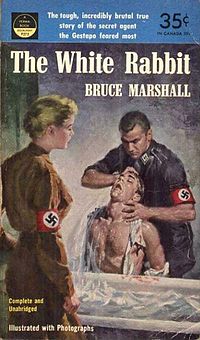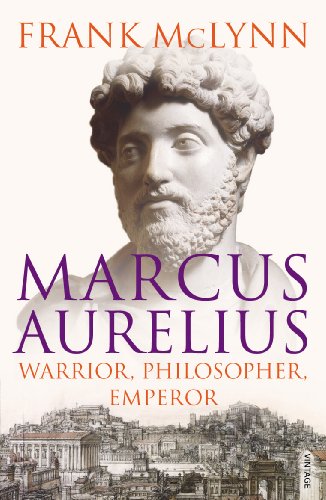
Marcus Aurelius: A Life: Warrior, Philosopher Emperor Book by Frank McLynn
Marcus Aurelius, Roman Emperor from 161 to 180, is now most famous for his collection of Stoic philosophy mantras and philosophical observations, or pithy aphorisms depending on your bent, called ‘Meditations’. A collection of works he never intended for publication, but now 1,800 years later, it is a consistent best seller, appearing in most top 100 book lists. Aurelius was also considered one of the last ‘great’ emperors and the last of the rulers known as the ‘Five Good Emperors’. With the advantage of hindsight, there were cracks appearing in the age of relative peace and stability for the Roman Empire and his was still a zenith, even if it may not have felt like it at the time. The Empire was ravaged by a severe plague, and conflict with German tribes deflected a lot of the benefits of the empire, but also exacerbated the disparity in wealth between rich and poor (an interesting echo in our ‘post covid’ world).
This book is very detailed if a little verbose, covering over 600 pages on the man himself evidence for whom is quite scant in part given the time elapsed. McLynn is clearly a fan of his subject but offers little new and often his own opinion, formulated in a large part by current scholarship. Marcus Aurelius is the undisputed hero and although slightly polemic within the text by Mclynn his hero can do no wrong and merely makes the best in a bad situation. Whilst villains in the form of his co emperor Lucius (?) Or the con artist who duped a kind Anthony of Abonoteichus are almost evil personified in Mclynn’s sometimes caricatured presentation. He is happy at points to piece together some events and even wildly speculate with limited evidence, then in other instances say we cannot speculate due to lack of evidence. But the the biggest failing is that the text fails to get to grips with the pragmatist versus the idealist within the man, and his surviving texts versus his actions on and off the battlefield. Our protagonist is portrayed as having little agency but reacting as things spiralled – the hindsight of history playing a major role.
All authors have to be discerning but because it suits his narrative at points McLynn is happy to take the outlandish Historia Augusta as “generally reliable for Marcus Aurelius reign” then quote it for the reign of Commodus as well. Having said that, this book is thoroughly researched though and despite its massive size, an enjoyable read that never gets tedious: a compliment in itself. It balances well the biography that we (can) know along with the obvious reliance on ‘Meditations’ the main surviving text of his era of course. With a book of this size there is an obvious danger that any repetition is not necessary and merely to fatten out the text so it is disappointing that there are a few repetitions of specific killing and of the important Jewish revolts we know of but neither happened during the reign of Marcus Aurelius. While context of early Christianity and it's detractors is near superfluous but given over to 2 chapters. There are also too many asides or digressions which take this away from merely a dry narrative – but might add to knowledge for the era but don’t tell us more about the individual under scrutiny. More on his decisions where we know them and less on the background to the events under previous rulers might help focus this and reduce the 600 pages to something slightly more digestible and sharper.
McLynn also offers a brilliant and consistent narrative on the influences of Marcus on later writers and thinkers from Augustine then after 1000 year gap to Thomas a Kempis onwards. Compelling and well presented it includes reference to Goethe and Kant building to the 19th century Zenith including context alongside Nietzsche complimented nicely by John Stuart Mill’s maudlin outlook (1806 – 1873) and John Henry Newman (1801 – 1890) though at points we do get more biography about these individuals than is really necessary resulting in sometimes tenuous links back to his main subject. McLynn also seems to confuse at points the reality that as well as never intending to publish his own Meditations at all let alone as the collections that they are now; he also never wrote anything approaching an autobiography (unlike many of the thinkers cited above). But this does comment more on the British Empire of 19th century desperately looking for historic justification and intellectualizing Imperialism. Like Marcus Aurelius’s inability to balance his meditations with the gritty realities of running a dysfunctional Empire in a constant state of conflict.
As we get closer to the modern era McLynn rightly comments how Marcus low opinion of indulgence of any form goes against 20th century individualism and self interest – but he appeals because of his pithy soundbites often taken out of context to suit 21st century mores and the fact that they were written 20 centuries ago enforces some naïve belief that antiquity somehow guarantees authenticity. This is not the case. Although what Aurelius says seems in no way to be supported by his day to day life as an Emperor – is nonetheless considered and enthralling.
On a more practical note – towards the end the editors eye seems to have tapered off – the editor could have been sharper on culling early on and keener on correcting spelling / typing late on. So, in conclusions, this book is in some ways a great over view of the era and less a great biography. This is a fallible opus, but an opus nonetheless and a good starting point or springboard to the original texts referencing an idiosyncratic Emperor and human being. Not perfect but a well presented flowing read.
Marcus Aurelius, Roman Emperor from 161 to 180, is now most famous for his collection of Stoic philosophy mantras and philosophical observations, or pithy aphorisms depending on your bent, called ‘Meditations’. A collection of works he never intended for publication, but now 1,800 years later, it is a consistent best seller, appearing in most top 100 book lists. Aurelius was also considered one of the last ‘great’ emperors and the last of the rulers known as the ‘Five Good Emperors’. With the advantage of hindsight, there were cracks appearing in the age of relative peace and stability for the Roman Empire and his was still a zenith, even if it may not have felt like it at the time. The Empire was ravaged by a severe plague, and conflict with German tribes deflected a lot of the benefits of the empire, but also exacerbated the disparity in wealth between rich and poor (an interesting echo in our ‘post covid’ world).
This book is very detailed if a little verbose, covering over 600 pages on the man himself evidence for whom is quite scant in part given the time elapsed. McLynn is clearly a fan of his subject but offers little new and often his own opinion, formulated in a large part by current scholarship. Marcus Aurelius is the undisputed hero and although slightly polemic within the text by Mclynn his hero can do no wrong and merely makes the best in a bad situation. Whilst villains in the form of his co emperor Lucius (?) Or the con artist who duped a kind Anthony of Abonoteichus are almost evil personified in Mclynn’s sometimes caricatured presentation. He is happy at points to piece together some events and even wildly speculate with limited evidence, then in other instances say we cannot speculate due to lack of evidence. But the the biggest failing is that the text fails to get to grips with the pragmatist versus the idealist within the man, and his surviving texts versus his actions on and off the battlefield. Our protagonist is portrayed as having little agency but reacting as things spiralled – the hindsight of history playing a major role.
All authors have to be discerning but because it suits his narrative at points McLynn is happy to take the outlandish Historia Augusta as “generally reliable for Marcus Aurelius reign” then quote it for the reign of Commodus as well. Having said that, this book is thoroughly researched though and despite its massive size, an enjoyable read that never gets tedious: a compliment in itself. It balances well the biography that we (can) know along with the obvious reliance on ‘Meditations’ the main surviving text of his era of course. With a book of this size there is an obvious danger that any repetition is not necessary and merely to fatten out the text so it is disappointing that there are a few repetitions of specific killing and of the important Jewish revolts we know of but neither happened during the reign of Marcus Aurelius. While context of early Christianity and it's detractors is near superfluous but given over to 2 chapters. There are also too many asides or digressions which take this away from merely a dry narrative – but might add to knowledge for the era but don’t tell us more about the individual under scrutiny. More on his decisions where we know them and less on the background to the events under previous rulers might help focus this and reduce the 600 pages to something slightly more digestible and sharper.
McLynn also offers a brilliant and consistent narrative on the influences of Marcus on later writers and thinkers from Augustine then after 1000 year gap to Thomas a Kempis onwards. Compelling and well presented it includes reference to Goethe and Kant building to the 19th century Zenith including context alongside Nietzsche complimented nicely by John Stuart Mill’s maudlin outlook (1806 – 1873) and John Henry Newman (1801 – 1890) though at points we do get more biography about these individuals than is really necessary resulting in sometimes tenuous links back to his main subject. McLynn also seems to confuse at points the reality that as well as never intending to publish his own Meditations at all let alone as the collections that they are now; he also never wrote anything approaching an autobiography (unlike many of the thinkers cited above). But this does comment more on the British Empire of 19th century desperately looking for historic justification and intellectualizing Imperialism. Like Marcus Aurelius’s inability to balance his meditations with the gritty realities of running a dysfunctional Empire in a constant state of conflict.
As we get closer to the modern era McLynn rightly comments how Marcus low opinion of indulgence of any form goes against 20th century individualism and self interest – but he appeals because of his pithy soundbites often taken out of context to suit 21st century mores and the fact that they were written 20 centuries ago enforces some naïve belief that antiquity somehow guarantees authenticity. This is not the case. Although what Aurelius says seems in no way to be supported by his day to day life as an Emperor – is nonetheless considered and enthralling.
On a more practical note – towards the end the editors eye seems to have tapered off – the editor could have been sharper on culling early on and keener on correcting spelling / typing late on. So, in conclusions, this book is in some ways a great over view of the era and less a great biography. This is a fallible opus, but an opus nonetheless and a good starting point or springboard to the original texts referencing an idiosyncratic Emperor and human being. Not perfect but a well presented flowing read.
Desert Queen: The extraordinary life of Gertrude Bell Janet Wallach
This recent biography is an engaging read. A well written, well researched, flowing story of the polymath Gertrude Bell, even if it is a little speculative at points. The text shows Bell’s life as a series of perceived successes and failures in equal measure. A formidable lady without a doubt, she was awash of contradictions – a spinster (and many of the derogatory connotations that go with that in the early 20th Century), but also lauded as ‘the woman’ in many Arabic and Iraqi circles. A legend who’s name still has revered status a century later. The text of this biography is at points very much in character when it uses floral language but also uses American spelling through unquoted text. This is distracting but not problematic. What is problematic is the continued misunderstanding of the distinction between British and English, including factual inaccuracies. For example it is certainly not exclusively ‘English’ soldiers captured in the skirmish in 24th July 1920 at Hillah – although mostly a Manchester regiment at least some of these were almost definitely Indian Sikh’s and more broadly British medical corps.
Gertrude Bell would have been a formidable lady. Often classified as the colonial 'mother' of modern Iraq she was increasingly sympathetic and pro-Iraqi, despite also working for the British Empire's interests. One of her longest term establishments for posterity was the creation of the Baghdad Archaeological Museum, what is now called the Iraqi Museum. She was both a hugely accomplished archaeologist as well as adept politician. Repeatedly she is the only woman in conferences and treaty discussions and a key player for her contribution to the dialogue and smoothing of relations. Tactful but also as strong willed as many of her colleagues, she was able to shape future events – the legacy of which we are still living with. Her intention initially for the benefits of the British Empire evolved more into the Arab minorities she was in close contact with and treated as equals.
Though, perhaps inescapably, she was a woman of her era. The climbing in her 20s was admirable and progressive – but the camping around Arabia in her 30s, whilst admirable, was not alone but involved hired help as broad as a book; a maid and a gunmen as well as a huge trail of camels. Hardly a solo effort and completely funded by her father’s business successes. Although that does not detract from the sheer volume of land she travelled across from Turkey down to Egypt and further east across Persia on a camel exploring, documenting ancient sites and meeting the key Arab and Sheik players of the early 20th century. These contacts proved key in her later political career.
Through these pages the subject comes across as Charismatic and engaging, but she seldom tolerated fools and anyone who veered too far from her opinion on matters relating to the middle east. She also sought to promote the interests of the British Empire more than current trends would see as acceptable. ….
This recent biography is an engaging read. A well written, well researched, flowing story of the polymath Gertrude Bell, even if it is a little speculative at points. The text shows Bell’s life as a series of perceived successes and failures in equal measure. A formidable lady without a doubt, she was awash of contradictions – a spinster (and many of the derogatory connotations that go with that in the early 20th Century), but also lauded as ‘the woman’ in many Arabic and Iraqi circles. A legend who’s name still has revered status a century later. The text of this biography is at points very much in character when it uses floral language but also uses American spelling through unquoted text. This is distracting but not problematic. What is problematic is the continued misunderstanding of the distinction between British and English, including factual inaccuracies. For example it is certainly not exclusively ‘English’ soldiers captured in the skirmish in 24th July 1920 at Hillah – although mostly a Manchester regiment at least some of these were almost definitely Indian Sikh’s and more broadly British medical corps.
Gertrude Bell would have been a formidable lady. Often classified as the colonial 'mother' of modern Iraq she was increasingly sympathetic and pro-Iraqi, despite also working for the British Empire's interests. One of her longest term establishments for posterity was the creation of the Baghdad Archaeological Museum, what is now called the Iraqi Museum. She was both a hugely accomplished archaeologist as well as adept politician. Repeatedly she is the only woman in conferences and treaty discussions and a key player for her contribution to the dialogue and smoothing of relations. Tactful but also as strong willed as many of her colleagues, she was able to shape future events – the legacy of which we are still living with. Her intention initially for the benefits of the British Empire evolved more into the Arab minorities she was in close contact with and treated as equals.
Though, perhaps inescapably, she was a woman of her era. The climbing in her 20s was admirable and progressive – but the camping around Arabia in her 30s, whilst admirable, was not alone but involved hired help as broad as a book; a maid and a gunmen as well as a huge trail of camels. Hardly a solo effort and completely funded by her father’s business successes. Although that does not detract from the sheer volume of land she travelled across from Turkey down to Egypt and further east across Persia on a camel exploring, documenting ancient sites and meeting the key Arab and Sheik players of the early 20th century. These contacts proved key in her later political career.
Through these pages the subject comes across as Charismatic and engaging, but she seldom tolerated fools and anyone who veered too far from her opinion on matters relating to the middle east. She also sought to promote the interests of the British Empire more than current trends would see as acceptable. ….
Life: A Natural History of the First Four Billion Years of Life on Earth Paperback – Illustrated, 7 Sept. 1999 by Richard Fortey (Author)
Given the broad and potentially dull subject matter it is amazing that I finished this 400-page opus on the history of life on this planet! But I did and enjoyed every page. There are snippets of fascinating information and threads that run through the whole text to keep you attentive and fascinated throughout. Richard Fortey is an authority on Palaeontology and Palaeobiology but also a skilled writer. He combines biology and the broader sciences with ease dealing with the chronology with a healthy dose of personal autobiography injected in, charting his own career of discovery alongside the broader four billion years. Also, given the heavy content, Fortey deserved due praise for his entertaining presentation manner. Fortey has a charismatic almost amiable writing style and warmth as well as ability to bring in personal anecdotes without killing the narrative of this biography on of evolution of life on the planet Earth. There are certainly a lot of assumptions and generalisations - many of which will prove out of date as new research methods increase accuracy and our knowledge, as the author himself acknowledges but this is certainly a fascinating snapshot of how we see the first four billion years of life on this planet.
Given the broad and potentially dull subject matter it is amazing that I finished this 400-page opus on the history of life on this planet! But I did and enjoyed every page. There are snippets of fascinating information and threads that run through the whole text to keep you attentive and fascinated throughout. Richard Fortey is an authority on Palaeontology and Palaeobiology but also a skilled writer. He combines biology and the broader sciences with ease dealing with the chronology with a healthy dose of personal autobiography injected in, charting his own career of discovery alongside the broader four billion years. Also, given the heavy content, Fortey deserved due praise for his entertaining presentation manner. Fortey has a charismatic almost amiable writing style and warmth as well as ability to bring in personal anecdotes without killing the narrative of this biography on of evolution of life on the planet Earth. There are certainly a lot of assumptions and generalisations - many of which will prove out of date as new research methods increase accuracy and our knowledge, as the author himself acknowledges but this is certainly a fascinating snapshot of how we see the first four billion years of life on this planet.
Aye Ready: Rangers War Heroes Paul Smith
This book was a little bit of a disappointment. It seemed, from the subject matter, to offer a lot for me specifically. I am a military history reader and a Rangers fan. The book, despite the claims of the title though, offered little of either beyond tenuous links between major conflicts back to the Ibrox club. Chronologically we begin with the First World War - it doesn’t mention the Boar war. It is very much centred around the contribution of a whole host of Rangers players who made the contribution to the Second World War effort. But the real gemstone Smith thinks he has is the extra information on the now famous Walter Tull – once this is dealt with we move to 2nd chapter about Finlay Speedie – a periphery figure at Ibrox and by the time he answered the call he was playing for Ayr. We get the best part of 2000 words about auctioning medals and yet Speedie’s are lost so the discussion is not particularly relevant to this War Hero. Likewise, there are quotes from Battles which individuals who played for Rangers may have been present. However, the book does include some interesting snapshots, like how Plymouth Argyle got their name. It was though a bit tenuous to dedicate the opening and largest chapter to Walter Tull – who never actually joined Rangers. There is some evidence he may have signed for Rangers just before he was killed at the Somme and the book confirms some interesting family links, but seems to be a more political statement, especially as the lead chapter.
After the first few longer ones - the chapters settle into 10 pages on each person – easier to whizz through. Paul Smith's writing does not flow and is not always interesting. He chooses tangential and anecdotal examples when perhaps more research, if possible, would be better. At points overly verbose and tenuous giving the impression they are selected to fill out to a full length book when a collection of shorter sharper essays may have been more interesting and more relevant to the title. This, along with other stylistic and content choices, means the book feels like a slightly cobbled together hotchpotch of 'former Rangers who played military roles in the 20th century'. The jingoistic triumphalism that recurs throughout the text is in some ways commendable, but in some ways hollow tripe. You get the feeling the author desperately wants Rangers to be one of those clubs who signed up en masse in early winter 1914 and ended up mindlessly slaughtered – all 'dead by Christmas'.
There is though a brilliantly enthralling and well written bridging chapter to act as a link between the First and Second World Wars which is done with aplomb and in no small part redeems the text. Indeed overall there are some write ups of merit, some sections of the text are banal in the extreme at points - Rangers and Ibrox revel in Armed Forces day (as Smith acknowledges) so pithy statements like “The end of the Second World War did not sever the Rangers links with the forces” are lazy and legions of Rangers fans may well lap it up – it is aimed at selling for the Rangers fan to have on his book shelf – but doesn’t benefit from Jock Wallace’s time in Jungles of Malaya.
Most Rangers military fans will already have read this and made up there minds, although the book will not really have a broader appeal but that was probably not the authors intention. This will go down in history as a good reference for selection of certain names who served quite literally Club and Country.
This book was a little bit of a disappointment. It seemed, from the subject matter, to offer a lot for me specifically. I am a military history reader and a Rangers fan. The book, despite the claims of the title though, offered little of either beyond tenuous links between major conflicts back to the Ibrox club. Chronologically we begin with the First World War - it doesn’t mention the Boar war. It is very much centred around the contribution of a whole host of Rangers players who made the contribution to the Second World War effort. But the real gemstone Smith thinks he has is the extra information on the now famous Walter Tull – once this is dealt with we move to 2nd chapter about Finlay Speedie – a periphery figure at Ibrox and by the time he answered the call he was playing for Ayr. We get the best part of 2000 words about auctioning medals and yet Speedie’s are lost so the discussion is not particularly relevant to this War Hero. Likewise, there are quotes from Battles which individuals who played for Rangers may have been present. However, the book does include some interesting snapshots, like how Plymouth Argyle got their name. It was though a bit tenuous to dedicate the opening and largest chapter to Walter Tull – who never actually joined Rangers. There is some evidence he may have signed for Rangers just before he was killed at the Somme and the book confirms some interesting family links, but seems to be a more political statement, especially as the lead chapter.
After the first few longer ones - the chapters settle into 10 pages on each person – easier to whizz through. Paul Smith's writing does not flow and is not always interesting. He chooses tangential and anecdotal examples when perhaps more research, if possible, would be better. At points overly verbose and tenuous giving the impression they are selected to fill out to a full length book when a collection of shorter sharper essays may have been more interesting and more relevant to the title. This, along with other stylistic and content choices, means the book feels like a slightly cobbled together hotchpotch of 'former Rangers who played military roles in the 20th century'. The jingoistic triumphalism that recurs throughout the text is in some ways commendable, but in some ways hollow tripe. You get the feeling the author desperately wants Rangers to be one of those clubs who signed up en masse in early winter 1914 and ended up mindlessly slaughtered – all 'dead by Christmas'.
There is though a brilliantly enthralling and well written bridging chapter to act as a link between the First and Second World Wars which is done with aplomb and in no small part redeems the text. Indeed overall there are some write ups of merit, some sections of the text are banal in the extreme at points - Rangers and Ibrox revel in Armed Forces day (as Smith acknowledges) so pithy statements like “The end of the Second World War did not sever the Rangers links with the forces” are lazy and legions of Rangers fans may well lap it up – it is aimed at selling for the Rangers fan to have on his book shelf – but doesn’t benefit from Jock Wallace’s time in Jungles of Malaya.
Most Rangers military fans will already have read this and made up there minds, although the book will not really have a broader appeal but that was probably not the authors intention. This will go down in history as a good reference for selection of certain names who served quite literally Club and Country.
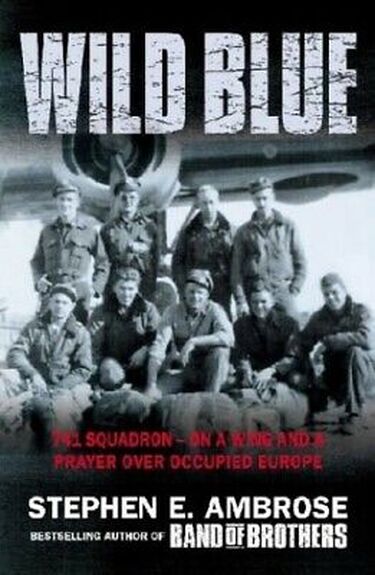
Wild Blue: 741 Squadron - On a Wing and a Prayer over Occupied Europe. Stephen E. Ambrose.
I really enjoy Ambrose's style of writing. From what I have read the formula is always the same. He takes a number of oral testimonies and recounted stories alongside contemporary sources and weaves an intricate chronology charting the period 1939 - 1945. Ambrose presents within all his books an enthusiasm, reverence, respect and admiration for all belligerents - the natives and the incoming Yanks, though the US protagonists of course loom largest. Previously it was his enthralling Band of Brothers, Citizen Soldiers and the harrowing D-Day. This one is the crews of the B-24 'Liberator' planes, certainly not the most glamourous or popular planes of the era. Yet again the text is a fast moving, flowing read over 250 pages. As with all Ambrose books it is crammed fascinating facts and brimming with information to complement the various narrators. This is the well woven stories of the key players - to tell the story of the whole squadron Ambrose focuses on and around the 35 missions flown by George McGovern - later a presidential candidate.
Until 1944 the plane he and they flew, the B-24, was the biggest plane in the American fleet, the plane used more aluminium than any other craft. Ambrose also injects the right level of contents and assumed knowledge for every reader. He doesnt shy away from offering basic knowledge (Tail end Charlie) to detailed experience like reassembling an M2 .50 caliber Browning machine gun blindfolded in winter gloves. Personal anecdotes abound - some fascinating like the pilot who could win arms wrestles with his left hand post war - having help the planes steering wheels in it. His jingoistic rhetoric can sometimes wear a little thin - when declaring the US role in victory of WWII as "one of mankind's greatest triumphs" but it is always informative and well presented. It captures not just the futility of war and fights against it jingoisticaly - but also the random nature of chance when these were planes flying into flak and enemy guns. If military history books based in fact and opinion are your thing this should be high on your reading list.
I really enjoy Ambrose's style of writing. From what I have read the formula is always the same. He takes a number of oral testimonies and recounted stories alongside contemporary sources and weaves an intricate chronology charting the period 1939 - 1945. Ambrose presents within all his books an enthusiasm, reverence, respect and admiration for all belligerents - the natives and the incoming Yanks, though the US protagonists of course loom largest. Previously it was his enthralling Band of Brothers, Citizen Soldiers and the harrowing D-Day. This one is the crews of the B-24 'Liberator' planes, certainly not the most glamourous or popular planes of the era. Yet again the text is a fast moving, flowing read over 250 pages. As with all Ambrose books it is crammed fascinating facts and brimming with information to complement the various narrators. This is the well woven stories of the key players - to tell the story of the whole squadron Ambrose focuses on and around the 35 missions flown by George McGovern - later a presidential candidate.
Until 1944 the plane he and they flew, the B-24, was the biggest plane in the American fleet, the plane used more aluminium than any other craft. Ambrose also injects the right level of contents and assumed knowledge for every reader. He doesnt shy away from offering basic knowledge (Tail end Charlie) to detailed experience like reassembling an M2 .50 caliber Browning machine gun blindfolded in winter gloves. Personal anecdotes abound - some fascinating like the pilot who could win arms wrestles with his left hand post war - having help the planes steering wheels in it. His jingoistic rhetoric can sometimes wear a little thin - when declaring the US role in victory of WWII as "one of mankind's greatest triumphs" but it is always informative and well presented. It captures not just the futility of war and fights against it jingoisticaly - but also the random nature of chance when these were planes flying into flak and enemy guns. If military history books based in fact and opinion are your thing this should be high on your reading list.

Target Tirpitz: X-Craft, Agents and dambusters - the Epic Quest to destroy Hitler’s Mightiest Warship by Patrick Bishop
Patrick Bishop approaches another famous Second World War event and institution. He has previously written in detail about the RAF’s Fighters, Bombers and much more. He is an authority who is able to write with a fluidity and skill that keeps the narrative flowing throughout. Target Tirpitz tells in various detail the story of the assorted missions to sink probably the most famous Battleship of the Second World War between 1940 and its final success in late 1944 - by which time she was a much weakened floating pin cushion but still loomed large in the political imagination and psyche.
She was nearly a generation ahead of her British equivalents (battleships which had not been greatly updated since the perceived successes of World War I). The pride of Hitler’s navy, she became especially important politically and figuratively after the sinking of her sister ship the Bismarck in May 1941. Bishop gives a good flowing narrative of the warships building and launch - though little on her design and creation. He skips through the background on her limited missions but also how she became little short of an obsession for Churchill as a political entity in and of itself, and how her very existence tied up many more allied ships on the Russian convoys than were really necessary. He tells of the special mini submarine operations, the battleship confrontations and the ultimate aerial bombing which all weakened the myth around the ‘unsinkable’ Battleship. But stuck in dock for months at a time she eventually became a liability. Hitler argued at one point for her melting down - valuing her more as scrap metal than a battleship - but Donitz persuaded him otherwise. She was the flagship and poster boy of the navy after all. But she was also a burden and her defence and upkeep proved hugely expensive. Itself an advantage to the British given her limited military significance. Bishop tells the story with passion and fervour and a genuine sympathy for both sides - highlighting all the absurdities in both the ships (limited) duties and the expensive and often pointless efforts to sink her. The personal asides and letters of the sailors on board and the submariners sent to destroy her are touching and add to the emotional value of a costly story - in both 1000s of lives and not least the damage to the eco system of the Norwegian Fjords.
From a personal perspective I most enjoyed reading about the mini submarine training and expeditions - but ultimately it was Barnes Wallis’ tallboy bombs carried by the famous 617 Squadron and No. 9 Squadron of the RAF which did for the ship in the end. A fascinating if slightly jingoist story of all too familiar bravery in the face of near certain death!
Patrick Bishop approaches another famous Second World War event and institution. He has previously written in detail about the RAF’s Fighters, Bombers and much more. He is an authority who is able to write with a fluidity and skill that keeps the narrative flowing throughout. Target Tirpitz tells in various detail the story of the assorted missions to sink probably the most famous Battleship of the Second World War between 1940 and its final success in late 1944 - by which time she was a much weakened floating pin cushion but still loomed large in the political imagination and psyche.
She was nearly a generation ahead of her British equivalents (battleships which had not been greatly updated since the perceived successes of World War I). The pride of Hitler’s navy, she became especially important politically and figuratively after the sinking of her sister ship the Bismarck in May 1941. Bishop gives a good flowing narrative of the warships building and launch - though little on her design and creation. He skips through the background on her limited missions but also how she became little short of an obsession for Churchill as a political entity in and of itself, and how her very existence tied up many more allied ships on the Russian convoys than were really necessary. He tells of the special mini submarine operations, the battleship confrontations and the ultimate aerial bombing which all weakened the myth around the ‘unsinkable’ Battleship. But stuck in dock for months at a time she eventually became a liability. Hitler argued at one point for her melting down - valuing her more as scrap metal than a battleship - but Donitz persuaded him otherwise. She was the flagship and poster boy of the navy after all. But she was also a burden and her defence and upkeep proved hugely expensive. Itself an advantage to the British given her limited military significance. Bishop tells the story with passion and fervour and a genuine sympathy for both sides - highlighting all the absurdities in both the ships (limited) duties and the expensive and often pointless efforts to sink her. The personal asides and letters of the sailors on board and the submariners sent to destroy her are touching and add to the emotional value of a costly story - in both 1000s of lives and not least the damage to the eco system of the Norwegian Fjords.
From a personal perspective I most enjoyed reading about the mini submarine training and expeditions - but ultimately it was Barnes Wallis’ tallboy bombs carried by the famous 617 Squadron and No. 9 Squadron of the RAF which did for the ship in the end. A fascinating if slightly jingoist story of all too familiar bravery in the face of near certain death!
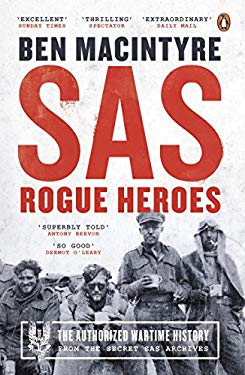
SAS:Rogue Heroes Ben Macintyre ….. “The Authorised Wartime History, from the Secret SAS Archives”
This was always going to a be fascinating book - written by one of the most eloquent, popular and entertaining writers of warfare - Ben Macintyre - about one of the most revered regiments in the British Army, the SAS. Fluid and well researched the text deals with 1941 to 1945, from its emergence as a rabble in North Africa doing a handful of novel attacks behind enemy lines to a regiment across Europe performing critical co-ordinated operations in an attempt to destabilize retreating German lines. Though some of the post-war archives reads like a cursory google was done in conjunction with the reunions that is not the emphasis of this book - instead using the SAS archive it is a commentary on the operations performed by this select band of soldiers. Macintyre writes well and uses the dramatic and exciting well - but also has a critical eye where necessary. He is not afraid to paint some characters as borderline psychopath - be that before the war or created by a host of traumatic events in conflict. All are given a heroic albeit often flawed status in the jingoistic, sympathetic write up.
The book is divided into 3 phases as he sees SAS: initial formation and operations in North Africa, followed by critical work in Italy and France before being dropped into final frontier of Germany. Though ever decreasing details of coverage means that operations in Germany only merit 20 pages - “as the men recalled the slog into Germany in a series of bloody vignettes” p291. But it does not shy away from the controversy that was revenge killing and cold blooded murder of non-combatants (German solders out of uniform). MacIntyre’s ability to tell an interesting story and keep a narrative going, along with his unimpeded access to the SAS wartime archives and diaries, gives this text an informative and entertaining air. The diaries he clearly uses heavily. It should come as no surprise to the informed reader that the harsh realities are at points unpleasant. The SAS And SS are not exonerated. Modern warfare is savage and took a sharp turn for the worse with Hitler's Commando order (Kommandobefehl).
Personally I was unclear as to why 3SAS, 4SAS and 5SAS were outside the scope of this otherwise thorough book. French and Belgian units were still part of the British army until at least 6th May 1945 and would have been of interest and equally relevant - but this highlights the Anglo perspective which was only slightly disappointing. For a detailed analysis of most of the 1st SAS and 2nd SAS escapades during their first incarnation this is essential reading.
SAS:Rogue Heroes Ben Macintyre ….. “The Authorised Wartime History, from the Secret SAS Archives”
This was always going to a be fascinating book - written by one of the most eloquent, popular and entertaining writers of warfare - Ben Macintyre - about one of the most revered regiments in the British Army, the SAS. Fluid and well researched the text deals with 1941 to 1945, from its emergence as a rabble in North Africa doing a handful of novel attacks behind enemy lines to a regiment across Europe performing critical co-ordinated operations in an attempt to destabilize retreating German lines. Though some of the post-war archives reads like a cursory google was done in conjunction with the reunions that is not the emphasis of this book - instead using the SAS archive it is a commentary on the operations performed by this select band of soldiers. Macintyre writes well and uses the dramatic and exciting well - but also has a critical eye where necessary. He is not afraid to paint some characters as borderline psychopath - be that before the war or created by a host of traumatic events in conflict. All are given a heroic albeit often flawed status in the jingoistic, sympathetic write up.
The book is divided into 3 phases as he sees SAS: initial formation and operations in North Africa, followed by critical work in Italy and France before being dropped into final frontier of Germany. Though ever decreasing details of coverage means that operations in Germany only merit 20 pages - “as the men recalled the slog into Germany in a series of bloody vignettes” p291. But it does not shy away from the controversy that was revenge killing and cold blooded murder of non-combatants (German solders out of uniform). MacIntyre’s ability to tell an interesting story and keep a narrative going, along with his unimpeded access to the SAS wartime archives and diaries, gives this text an informative and entertaining air. The diaries he clearly uses heavily. It should come as no surprise to the informed reader that the harsh realities are at points unpleasant. The SAS And SS are not exonerated. Modern warfare is savage and took a sharp turn for the worse with Hitler's Commando order (Kommandobefehl).
Personally I was unclear as to why 3SAS, 4SAS and 5SAS were outside the scope of this otherwise thorough book. French and Belgian units were still part of the British army until at least 6th May 1945 and would have been of interest and equally relevant - but this highlights the Anglo perspective which was only slightly disappointing. For a detailed analysis of most of the 1st SAS and 2nd SAS escapades during their first incarnation this is essential reading.
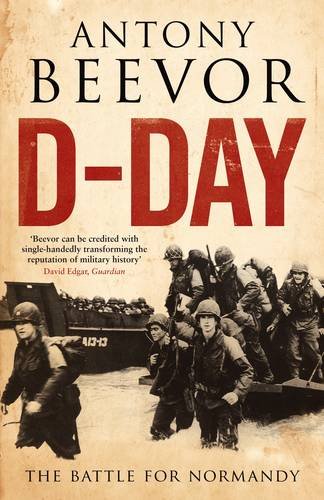
D:Day: The Battle for Normandy Anthony Beevor (Penguin Viking 2009)
There are only a few great contemporary popular war writers who can maintain an interesting narrative whilst presenting dry historical fact. Anthony Beever alongside perhaps Ben MacIntrye and Partick Bishop manage to combine and present, in an easy fashion, vast volumes of information in an informative and comprehensive but clear manner. This skill takes a lot of work. Here Beevor weaves a myriad of strands into creating the story of D-Day - the events leading to it, the context where relevant and the day’s activities as well as the weeks that followed. Very basically the months of June, July and August 1944 as the Allies gained a critical foothold in Western Europe (having already landed in Italy the summer before). The book contains level headed opinion where others had perhaps been over stated, for example the horrific death toll of soldiers from Bedford Virginia (p112) or number of Panzer Tanks destroyed in a single action (p176). One minor criticism - Beever is obsessed, to the point of meticulousness, about recording the nationalities of all divisions and as far a possible down to individuals involved - Polish, French contingents on the Allied side and Russian prisoners fighting on the Axis. But this level of detail is not extended to Republic of Ireland soldiers serving in the British Army - a strange omission that echoes the dangerous catch all of Irish/British dichotomy ('sure they're British anyway'). A minor oversight - but a lazy British agenda that is too often omitted and a hangover from an Imperial arrogance. But this is a minor detail of little direct influence on the overall history. More importantly this book is a reminder of just how immense the D-Day landings were in volume and how they were, despite their success, a gargantuan failure, especially when compared to objectives. They achieved their ultimate aim - in obtaining a foothold in Europe but some locations were held by the Germans for days and even weeks after their objective dates and these often had critical consequences. The sheer volume of deaths of Allied and especially Axis soldiers at points greatly exceeded the horrific Eastern Front - running up to 2,500 a month for some divisions. Some of these could have been avoided given the misinformation and human error, but these are observations from after the heat of battle. It is frightening though how much the German narrative of ‘pushing the Allies back into the sea’ featured in contemporary dialogue at the expense of pragmatism. We see the early signs of Hitler’s eventual collapse into myth and fiction as his mental state crumbled. This period also coincided with the Von Stauffenberg plot which only heightened Hitler’s distrust of his generals.
Beevor is partisan, despite attempts to offer a balanced narrative, he gives the Allies a more sympathetic write up - but he is not shy to point out possible and indeed definite war crimes on both sides during the conflict. The Allied forward lines were physically not able to take prisoners if the desired 'blitz' speed of the campaign was to continue without stalling, whilst the German hand was forced by the need to stem the constant onslaught. However, both received official sanction with the vague take no prisoner instructions for Allies and Hitler’s unambiguous Kommandobefehl - which was of course mercifully not always enforced.
This book is a thorough, detailed and informative study of one of the key events and campaigns of the Second World War and set to be a popular standard on the events for decades to come.
There are only a few great contemporary popular war writers who can maintain an interesting narrative whilst presenting dry historical fact. Anthony Beever alongside perhaps Ben MacIntrye and Partick Bishop manage to combine and present, in an easy fashion, vast volumes of information in an informative and comprehensive but clear manner. This skill takes a lot of work. Here Beevor weaves a myriad of strands into creating the story of D-Day - the events leading to it, the context where relevant and the day’s activities as well as the weeks that followed. Very basically the months of June, July and August 1944 as the Allies gained a critical foothold in Western Europe (having already landed in Italy the summer before). The book contains level headed opinion where others had perhaps been over stated, for example the horrific death toll of soldiers from Bedford Virginia (p112) or number of Panzer Tanks destroyed in a single action (p176). One minor criticism - Beever is obsessed, to the point of meticulousness, about recording the nationalities of all divisions and as far a possible down to individuals involved - Polish, French contingents on the Allied side and Russian prisoners fighting on the Axis. But this level of detail is not extended to Republic of Ireland soldiers serving in the British Army - a strange omission that echoes the dangerous catch all of Irish/British dichotomy ('sure they're British anyway'). A minor oversight - but a lazy British agenda that is too often omitted and a hangover from an Imperial arrogance. But this is a minor detail of little direct influence on the overall history. More importantly this book is a reminder of just how immense the D-Day landings were in volume and how they were, despite their success, a gargantuan failure, especially when compared to objectives. They achieved their ultimate aim - in obtaining a foothold in Europe but some locations were held by the Germans for days and even weeks after their objective dates and these often had critical consequences. The sheer volume of deaths of Allied and especially Axis soldiers at points greatly exceeded the horrific Eastern Front - running up to 2,500 a month for some divisions. Some of these could have been avoided given the misinformation and human error, but these are observations from after the heat of battle. It is frightening though how much the German narrative of ‘pushing the Allies back into the sea’ featured in contemporary dialogue at the expense of pragmatism. We see the early signs of Hitler’s eventual collapse into myth and fiction as his mental state crumbled. This period also coincided with the Von Stauffenberg plot which only heightened Hitler’s distrust of his generals.
Beevor is partisan, despite attempts to offer a balanced narrative, he gives the Allies a more sympathetic write up - but he is not shy to point out possible and indeed definite war crimes on both sides during the conflict. The Allied forward lines were physically not able to take prisoners if the desired 'blitz' speed of the campaign was to continue without stalling, whilst the German hand was forced by the need to stem the constant onslaught. However, both received official sanction with the vague take no prisoner instructions for Allies and Hitler’s unambiguous Kommandobefehl - which was of course mercifully not always enforced.
This book is a thorough, detailed and informative study of one of the key events and campaigns of the Second World War and set to be a popular standard on the events for decades to come.
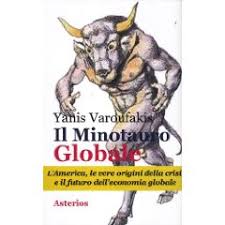
The Global Minotaur: America, Europe and the Future of the Global Economy
by Yanis Varoufakis
An economics book by university economist and former Minister of Finance for Greece Yanis Varoufakis.
In ancient mythology the Minotaur is a creature kept in a labyrinth by King Minos on the island of Crete. The beast was, according to the tradition, regularly fed sacrificial offerings of humans to keep him alive. Invariably the live sacrifices were of Athenian youngsters. Athens was a competitor city state to the island of Crete.
On the other hand the Global Minotaur Yanis Varoufakis refers to in his main metaphor is, for him, an economic ‘creature’ that lived from 1950 to 2008, on the sacrificial offerings to the United States’ Wall Street. Varoufakis gives a history lesson in dealing with a global surplus redistribution system which requires this excess to survive and continues to endlessly consume in order to survive. The recurring (correct) condemnation of capitalism is clear and compelling. Varoufakis' story is in part a history and the first half at least is a traditional narrative. Though the classical references do wear thin. If this comparison is correct, where is the Theseus (the saviour!), even in speculative conclusion? Indeed one small gripe on the classical theme: There are too many metaphors - Minotaur yes, but Dragon, Mountaineers, Europa and Helen and Odysseus. All make sense but make for a lot to take in without clearly tying in all the threads.
The book takes its starting point as the 1944's ‘Bretton Woods’ agreement which made the Dollar the world's reserve currency. That led to the period from 1950 to 1971, where the United States acted as a surplus nation under a 'Global Plan' - with the Gold Standard as its bastion or rock to hold firm by. However by 1971, and in part the effect of the Vietnam War, leads to 1971s departure from the Gold standard and its effectual slow death of this Minotaur.
From 1971 to 2008 the US is a deficit nation but with the global minotaur survives thanks to tribute of surplus - Wall street invented new ways of creating and increasing surplus private cash for 'all', encouraged in the 1980s by Reagan and Thatcher’s economic policies. Then comes the great crash of 2008 where rather than creating a new system, politicians globally backed up the old ones...with public money of course! Failing to recognize or allow for the drastic changes Varoufakis felt were needed. He classifies the period post the 2008 global crash as 'Bankruptocracy'. The phrase gets a bit boring after a while, reading more like he is desperate to create a new buzz word. Being Greek and educated - he wants to leave his mark on history!
This book is polarized as well. The personality cult of modern politics is inescapable (Varoufakis was a finance minister in 2015 Greek government and not untarnished in the political establishment reaction) – Varoufakis’ book is basically a slanted history lesson on fiat money created once America moved off the gold standard in 1971. Though Varoufakis does say he doesn't know where the answer comes from he has framed the situation well. An interesting if at points misguided narrative of economics of the late 20th century. Flowing read early on though stilted towards the end as he seeks to wrap the text up.
by Yanis Varoufakis
An economics book by university economist and former Minister of Finance for Greece Yanis Varoufakis.
In ancient mythology the Minotaur is a creature kept in a labyrinth by King Minos on the island of Crete. The beast was, according to the tradition, regularly fed sacrificial offerings of humans to keep him alive. Invariably the live sacrifices were of Athenian youngsters. Athens was a competitor city state to the island of Crete.
On the other hand the Global Minotaur Yanis Varoufakis refers to in his main metaphor is, for him, an economic ‘creature’ that lived from 1950 to 2008, on the sacrificial offerings to the United States’ Wall Street. Varoufakis gives a history lesson in dealing with a global surplus redistribution system which requires this excess to survive and continues to endlessly consume in order to survive. The recurring (correct) condemnation of capitalism is clear and compelling. Varoufakis' story is in part a history and the first half at least is a traditional narrative. Though the classical references do wear thin. If this comparison is correct, where is the Theseus (the saviour!), even in speculative conclusion? Indeed one small gripe on the classical theme: There are too many metaphors - Minotaur yes, but Dragon, Mountaineers, Europa and Helen and Odysseus. All make sense but make for a lot to take in without clearly tying in all the threads.
The book takes its starting point as the 1944's ‘Bretton Woods’ agreement which made the Dollar the world's reserve currency. That led to the period from 1950 to 1971, where the United States acted as a surplus nation under a 'Global Plan' - with the Gold Standard as its bastion or rock to hold firm by. However by 1971, and in part the effect of the Vietnam War, leads to 1971s departure from the Gold standard and its effectual slow death of this Minotaur.
From 1971 to 2008 the US is a deficit nation but with the global minotaur survives thanks to tribute of surplus - Wall street invented new ways of creating and increasing surplus private cash for 'all', encouraged in the 1980s by Reagan and Thatcher’s economic policies. Then comes the great crash of 2008 where rather than creating a new system, politicians globally backed up the old ones...with public money of course! Failing to recognize or allow for the drastic changes Varoufakis felt were needed. He classifies the period post the 2008 global crash as 'Bankruptocracy'. The phrase gets a bit boring after a while, reading more like he is desperate to create a new buzz word. Being Greek and educated - he wants to leave his mark on history!
This book is polarized as well. The personality cult of modern politics is inescapable (Varoufakis was a finance minister in 2015 Greek government and not untarnished in the political establishment reaction) – Varoufakis’ book is basically a slanted history lesson on fiat money created once America moved off the gold standard in 1971. Though Varoufakis does say he doesn't know where the answer comes from he has framed the situation well. An interesting if at points misguided narrative of economics of the late 20th century. Flowing read early on though stilted towards the end as he seeks to wrap the text up.
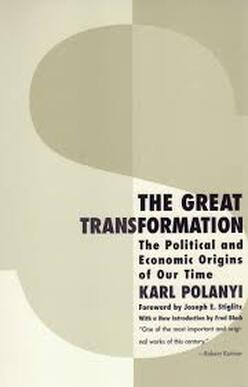
Karl Polanyi. The Great Transformation: The Political and Economic Origins of our time.
“A generation is born into history when it becomes aware of its calling. ….. Should it not recognise the task uniquely set out for it, should it not take that task upon itself it will meet the fate of the wicked and slothful servant who buried his talent in the earth. … Such generations never came to life, for they failed to recognise the task that would have been their life… “ This rally call is perhaps even more relevant now than it was when Karl Polanyi first typed these words during wartime in “The Calling of This Generation” (1918). His generation though largely ignored his calls and comments.
And Polanyi himself didn’t make a particularly loud or relevant call until later in life. After the Second World War he let out another call for his generation that took another century to gain momentum. Polanyi wrote his most famous work “The Great Transformation” in America at the tail end of the Second World War – when the same waste and carnage, obliquely referenced above, happened all over again! But it was the years he spent in England (1933 – 1940 between mainland Europe and the States) which shape him most profoundly. Arriving in England his new home made an immediate and powerful impression. He saw first-hand the “cultural deprivations of the working classes” as he perceived it. As economist-cum-anthropologist and historian David Cayley has said elsewhere (http://www.davidcayley.com/podcasts/2014/11/26/8rgod4irv00ac77zl1d8rxtmbkbkgi) : “For Polanyi England was a revelation – in the wounded landscape and in the demoralisation of the working class he saw something that would prove crucial to his later work – a vision of the enduring cultural trauma that industrial capitalism had produced in its first home land – but his first challenge was just to establish himself [in his new home]”
Until recently Karl Polanyi was a relatively obscure post war sociologist and historian, whose views were ignored at the time and dismissed subsequently as inconsistent and apparently disjointed. Those assertions remain true, not helped by the much discussed fact that the book itself was rushed for publication in the immediate post war era. However, since the turn of 21st century many of his assertions have been vindicated and more importantly found support. Arguing, as he did, that we have moved away from our ‘natural’ inclination in what was a post-industrial ‘great transformation’ in thinking, culture and action. In just one example he argues forcefully that now poverty is a crime rewarded with starvation, whereas in the past "as a rule, the individual in primitive society is not threatened by starvation unless the community as a whole is in a like predicament". Rampant self-interested individualism and today’s neo liberal Capitalism on the other hand allows starvation: Modern British foodbanks being a pertinent case in point. And it is the absence of the threat of individual starvation which makes primitive society, in a sense, more humane than market society and at the same time less economic. (p172). The book is not flawless and it becomes a bit repetitive – here for example as if to hammer home a point about starvation - but many valid and relevant as well as important points are made throughout. Instead we are now more inculcated into the mind-set of "satisfy the requirements of a real-estate market [which] was a pivotal part of the utopian concept of a market economy."(p187) and it is in this field of modern colonization that modern concept of land is created.
Polanyi puts forward an interesting, persuasive case for the misdirection the western world (and those who follow it) have taken since the start of the industrial revolution. In doing this he helps to question the popular assumption that the current economic model we base our 'freedoms' on has become. This book convincingly challenges many of our 'common sense' assumptions - it is at points itself utopian and overly theoretical, but compelling nonetheless. The edition that I read also benefits from both a clear and eloquent foreword and introduction from Joe Stiglitz and Fred Block, justifying investment in this new edition. These and Polanyi’s resurgence are complimented by an emerging field of scholarship since the late 20th Century. Polanyi, and through him Gray, Klein and Graeber amongst others, offer a healthy dynamic of questioning 20thC assumption and consumption - most of which draws its influence from 18th and 19th Centuries.
Polanyi though, in my opinion, overlooks the nuance for concentric loyalties instead portraying polemics / polarised ambition and self-interest. He fails also to recognise the nuances of urban Greek and Roman land ownership. There are also some slight ‘errors’ when trying to portray labour as not a commodity he is overlooking, as it suits his purpose, the same could be said of raw materials, whilst the movement in the book from micro to macro feels clunky and not fluid, from Speenhamland to world trade and gunboat diplomacy. Errors and oversimplifications though are minor compared to the compelling and realistic premise put forward in this great book which should act as a clarion call for realignment in the 21st Century. This economic anthropological tract is thoroughly readable, completely believable but also intricate, sometimes verbose and often polemic, but also a good length and detailed, with not overly daunting chapters. Pick it up and broaden your mind.
“A generation is born into history when it becomes aware of its calling. ….. Should it not recognise the task uniquely set out for it, should it not take that task upon itself it will meet the fate of the wicked and slothful servant who buried his talent in the earth. … Such generations never came to life, for they failed to recognise the task that would have been their life… “ This rally call is perhaps even more relevant now than it was when Karl Polanyi first typed these words during wartime in “The Calling of This Generation” (1918). His generation though largely ignored his calls and comments.
And Polanyi himself didn’t make a particularly loud or relevant call until later in life. After the Second World War he let out another call for his generation that took another century to gain momentum. Polanyi wrote his most famous work “The Great Transformation” in America at the tail end of the Second World War – when the same waste and carnage, obliquely referenced above, happened all over again! But it was the years he spent in England (1933 – 1940 between mainland Europe and the States) which shape him most profoundly. Arriving in England his new home made an immediate and powerful impression. He saw first-hand the “cultural deprivations of the working classes” as he perceived it. As economist-cum-anthropologist and historian David Cayley has said elsewhere (http://www.davidcayley.com/podcasts/2014/11/26/8rgod4irv00ac77zl1d8rxtmbkbkgi) : “For Polanyi England was a revelation – in the wounded landscape and in the demoralisation of the working class he saw something that would prove crucial to his later work – a vision of the enduring cultural trauma that industrial capitalism had produced in its first home land – but his first challenge was just to establish himself [in his new home]”
Until recently Karl Polanyi was a relatively obscure post war sociologist and historian, whose views were ignored at the time and dismissed subsequently as inconsistent and apparently disjointed. Those assertions remain true, not helped by the much discussed fact that the book itself was rushed for publication in the immediate post war era. However, since the turn of 21st century many of his assertions have been vindicated and more importantly found support. Arguing, as he did, that we have moved away from our ‘natural’ inclination in what was a post-industrial ‘great transformation’ in thinking, culture and action. In just one example he argues forcefully that now poverty is a crime rewarded with starvation, whereas in the past "as a rule, the individual in primitive society is not threatened by starvation unless the community as a whole is in a like predicament". Rampant self-interested individualism and today’s neo liberal Capitalism on the other hand allows starvation: Modern British foodbanks being a pertinent case in point. And it is the absence of the threat of individual starvation which makes primitive society, in a sense, more humane than market society and at the same time less economic. (p172). The book is not flawless and it becomes a bit repetitive – here for example as if to hammer home a point about starvation - but many valid and relevant as well as important points are made throughout. Instead we are now more inculcated into the mind-set of "satisfy the requirements of a real-estate market [which] was a pivotal part of the utopian concept of a market economy."(p187) and it is in this field of modern colonization that modern concept of land is created.
Polanyi puts forward an interesting, persuasive case for the misdirection the western world (and those who follow it) have taken since the start of the industrial revolution. In doing this he helps to question the popular assumption that the current economic model we base our 'freedoms' on has become. This book convincingly challenges many of our 'common sense' assumptions - it is at points itself utopian and overly theoretical, but compelling nonetheless. The edition that I read also benefits from both a clear and eloquent foreword and introduction from Joe Stiglitz and Fred Block, justifying investment in this new edition. These and Polanyi’s resurgence are complimented by an emerging field of scholarship since the late 20th Century. Polanyi, and through him Gray, Klein and Graeber amongst others, offer a healthy dynamic of questioning 20thC assumption and consumption - most of which draws its influence from 18th and 19th Centuries.
Polanyi though, in my opinion, overlooks the nuance for concentric loyalties instead portraying polemics / polarised ambition and self-interest. He fails also to recognise the nuances of urban Greek and Roman land ownership. There are also some slight ‘errors’ when trying to portray labour as not a commodity he is overlooking, as it suits his purpose, the same could be said of raw materials, whilst the movement in the book from micro to macro feels clunky and not fluid, from Speenhamland to world trade and gunboat diplomacy. Errors and oversimplifications though are minor compared to the compelling and realistic premise put forward in this great book which should act as a clarion call for realignment in the 21st Century. This economic anthropological tract is thoroughly readable, completely believable but also intricate, sometimes verbose and often polemic, but also a good length and detailed, with not overly daunting chapters. Pick it up and broaden your mind.
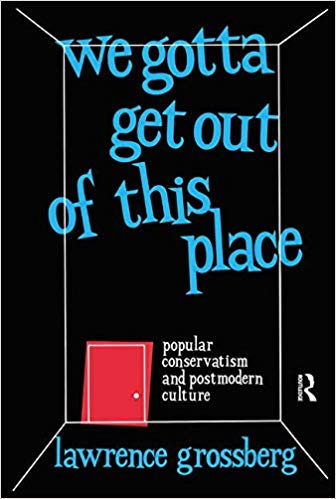
We Gotta Get Out of this Place: Popular Conservatism and post modern Culture.
Grossberg, Lawrence, Routledge 1992
If I devote most of this review to criticism it is because my instinctive response in most places is to agree with this book and I enjoyed its contents. The execution here is overall brilliant. But, be prepared. If you are planning to read this volume it is heavy going. It is, though, worth wading through all the jargon and analysis to reach your own conclusion. It is rewarding in the form of a leftist look at the rights repeated successes - both how the right places itself within the mind-set of conservatism and how in some ways it ensures stasis through change. (You still with me?!)
Overall the premise is pressing, prescient and worth a read (As well as a worthy read!). There are so many great things in the text - notably in Grossberg’s use and acknowledging more nuanced role of the all-pervasive Christianity on culture. Also his understanding of England and Britain is accurate - showing complete cognisance of their coexistence - an awareness seldom seen in American authors. The text raises some important points and analyses them well - with a healthy dose of pessimism at the success of the right - often with negative results on other peoples’ bodies and the environment. But at points there are a lot of non sequiturs or unclear references: “Consequently” (see p159, p160 and p171 amongst many) is not always an obvious ‘consequence’. It is also compelling in presenting capitalism’s construction of consensus. Though it is also a little too simplistic - to imply that it is novel that no generation wants to replicate its parents completely(p144) is true of at least the classical era onwards. The author also over simplifies the development and teenage years (p178). Similarly Grossberg’s personal anecdotes about animal rights, as well as too simplistic, also seem to allow no room for nuance - a very lack of nuance which at other points he condemns.
A slight bug bear as well, the book is structured somewhat unconvincingly around the concept of Rock Formations - without offering either a structure for this or a continuous solid analogy (pun intended). But what is indisputable is that Rock, in the form of music, is ‘under siege’ from the right. Just as at no point does Grossberg really express how Rock is of no time or place - it is surely from 1950s onwards at the earliest? Also this book was written in the pre internet era and so has a few points that are perhaps less relevant than they were for earlier generations (others more so) . Historians though work on and with facts - cold hard, albeit sometimes contentious, facts. Not abstractions - but this is a cultural studies book not a history. Grossberg is right to assert that “the centre of life - political, social and cultural - has shifted to the right”. Is this as we try and hold on to what we have? Surely it is because in the past there was less material to cling on to.
Grossberg also says the new primary unit of social function is the family - I am not sure i agree. Perhaps in the 1990s it was - but now it is more like accelerated individualism - or your facebook group perhaps. I am not alone there. In 1998 John Gray in his brilliant False Dawn went as far as to state “Families are weaker in America than in any other country” (p2 False Dawn). Grossberg conflates political pragmatism and necessity with political deviance and retrograde action and prohibitive conservatism. Also in his assessment of war and conflict, like the media he condemns, Grossberg seems to make no allowance for nuance - a bird covered in oil need not be comparable with a Kurdish massacre - but more creatures died in the oil leak as well. Overall - a bit preachy - or perhaps i am just already too cynical!
Whilst it is thorough and detailed, this publication is far from perfect. At points it is over reliant on its sources or conceptual framework and sometimes then only one (Deleuze and Guattari). Though others did add to the overall picture - notably Stuart Hall and Meaghan Morris (both of whom the author counts as friends). Frustratingly, this sometimes means that Grossberg offers little or no new evidence - but he does warn us from the outset when he says in jest he might aim to create a book made up exclusively of quotes. His own input is well researched and important in the analysis of popular conservatism and modern culture.
Grossberg, Lawrence, Routledge 1992
If I devote most of this review to criticism it is because my instinctive response in most places is to agree with this book and I enjoyed its contents. The execution here is overall brilliant. But, be prepared. If you are planning to read this volume it is heavy going. It is, though, worth wading through all the jargon and analysis to reach your own conclusion. It is rewarding in the form of a leftist look at the rights repeated successes - both how the right places itself within the mind-set of conservatism and how in some ways it ensures stasis through change. (You still with me?!)
Overall the premise is pressing, prescient and worth a read (As well as a worthy read!). There are so many great things in the text - notably in Grossberg’s use and acknowledging more nuanced role of the all-pervasive Christianity on culture. Also his understanding of England and Britain is accurate - showing complete cognisance of their coexistence - an awareness seldom seen in American authors. The text raises some important points and analyses them well - with a healthy dose of pessimism at the success of the right - often with negative results on other peoples’ bodies and the environment. But at points there are a lot of non sequiturs or unclear references: “Consequently” (see p159, p160 and p171 amongst many) is not always an obvious ‘consequence’. It is also compelling in presenting capitalism’s construction of consensus. Though it is also a little too simplistic - to imply that it is novel that no generation wants to replicate its parents completely(p144) is true of at least the classical era onwards. The author also over simplifies the development and teenage years (p178). Similarly Grossberg’s personal anecdotes about animal rights, as well as too simplistic, also seem to allow no room for nuance - a very lack of nuance which at other points he condemns.
A slight bug bear as well, the book is structured somewhat unconvincingly around the concept of Rock Formations - without offering either a structure for this or a continuous solid analogy (pun intended). But what is indisputable is that Rock, in the form of music, is ‘under siege’ from the right. Just as at no point does Grossberg really express how Rock is of no time or place - it is surely from 1950s onwards at the earliest? Also this book was written in the pre internet era and so has a few points that are perhaps less relevant than they were for earlier generations (others more so) . Historians though work on and with facts - cold hard, albeit sometimes contentious, facts. Not abstractions - but this is a cultural studies book not a history. Grossberg is right to assert that “the centre of life - political, social and cultural - has shifted to the right”. Is this as we try and hold on to what we have? Surely it is because in the past there was less material to cling on to.
Grossberg also says the new primary unit of social function is the family - I am not sure i agree. Perhaps in the 1990s it was - but now it is more like accelerated individualism - or your facebook group perhaps. I am not alone there. In 1998 John Gray in his brilliant False Dawn went as far as to state “Families are weaker in America than in any other country” (p2 False Dawn). Grossberg conflates political pragmatism and necessity with political deviance and retrograde action and prohibitive conservatism. Also in his assessment of war and conflict, like the media he condemns, Grossberg seems to make no allowance for nuance - a bird covered in oil need not be comparable with a Kurdish massacre - but more creatures died in the oil leak as well. Overall - a bit preachy - or perhaps i am just already too cynical!
Whilst it is thorough and detailed, this publication is far from perfect. At points it is over reliant on its sources or conceptual framework and sometimes then only one (Deleuze and Guattari). Though others did add to the overall picture - notably Stuart Hall and Meaghan Morris (both of whom the author counts as friends). Frustratingly, this sometimes means that Grossberg offers little or no new evidence - but he does warn us from the outset when he says in jest he might aim to create a book made up exclusively of quotes. His own input is well researched and important in the analysis of popular conservatism and modern culture.
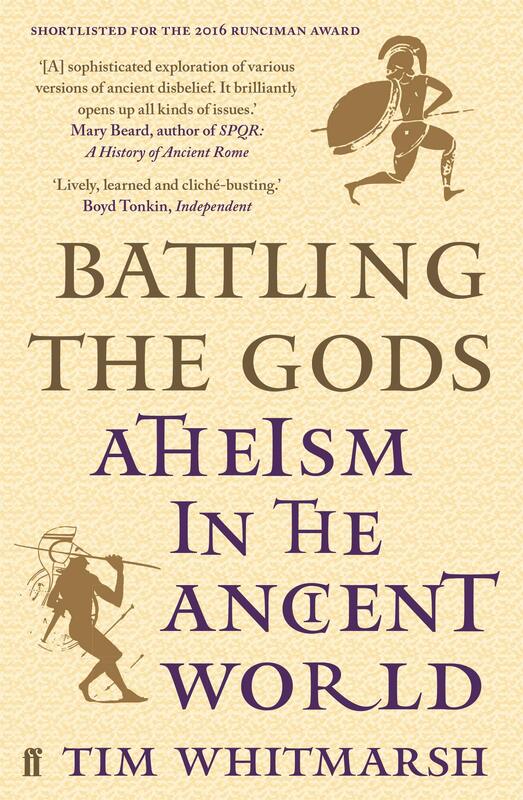
Battling the Gods: Atheism in the Ancient World Tim Whitmarsh 2015
This book is an in-depth look at Ancient Greek and Roman atheism and the absence of religion in the scant surviving texts and material remains of the eras. A detailed scholarship aimed at the lay reader is always a risky endeavour, but the author succeeds here. He takes a number of ‘leaps of faith’ (pun intended) which often involve using the evidence to its full scope. Using the limited surviving sources on the relatively blank canvas of the ancient world is a dangerous task. Some speculate that as little as one percent of ancient literature has survived. We always bring our own assumptions to the palette. Although he never defines atheism beyond broadly non-belief in ‘gods’ Whitmarsh often blends scepticism, agnosticism and atheism rather than out and out non-belief. It is of course one thing to mock or doubt organised state religion but another to not believe at all (atheism). He also allows for doubt; Doubt within religious faith may be as old as religion as Whitmarsh reiterates but of course doubt can lead to open rejection.
Is religion embedded in society or an innate human need to impose some kind of all-powerful deified being? Whether or not there is one true religion, in the ancient world there was, it is safe to say, little scope for personal communion with deities. When this occurred you moved into the realms of demi God from mythical Heracles to the very real Alexander the Great. The Greeks also lacked specific sacred, sacrosanct texts. Homer and Hesiod filled this void... so no one true scripture existed. Gods were also interchangeable across the geography of Greek speaking world and had many different aspects and traits applied to them by different communities or poleis. The polytheistic world allowed for even regional versions of the same God
Although because of its size (c.250 pages) and that it is aiming for accessibility, the book is by necessity a survey not detailed analysis. It is, though, well-presented and chronologically set out over 4 parts from Ancient Greece to a lesser extent Rome, the final Christian chapter felt rushed but an overall thorough book.
Some awareness of the era would put the reader at an advantage, but not essential though context isn’t always explained. Whitmarsh writes well. Clear concise with few wasted flourishes yet still understandable, factoring in a low level of awareness with enough 'facts' but also detail where required.
A few factual errors annoy. Larnaka is not the capital of Cyprus, alongside misdating decree against Diagoras of Melos (415bc) (there may be many more beyond my own ken). Also, my opinion is that the Material Cosmos chapter (4), with its unrecognised God gene parallels, would benefit from being earlier in the book. But overall these are minor gripes, it is fun and informative text and an easy read. By consequence it also acts as a useful guide to the myriad of myths and motifs that make up the pantheon of Greek gods. This is a good book but misinterprets and at other points overlooks Lucian’s nuance and puts the emphasis elsewhere. Clearly Whitmarsh gives no credence to Lucian being early sci-fi.
I have seen the conclusions in this book described elsewhere as tentative but bold, as well as nuanced interpretations of events and texts other say it's a brilliantly original reading. I would tend to agree. Novel but possibly correct. Drawing firm conclusions from scant archaeological and literary evidence is hard and Whitmarsh uses the evidence to its furthest extremes at points. Lots of conclusions are conditional upon you agreeing with his earlier hypothesis, which are sometimes against popular convention. They may well be correct but he can overegg the conclusions. But the joy of this book is it can be taken at face value or interrogated and analyzed to a great level of detail. I at least chose the former and enjoyed the journey.
This book is an in-depth look at Ancient Greek and Roman atheism and the absence of religion in the scant surviving texts and material remains of the eras. A detailed scholarship aimed at the lay reader is always a risky endeavour, but the author succeeds here. He takes a number of ‘leaps of faith’ (pun intended) which often involve using the evidence to its full scope. Using the limited surviving sources on the relatively blank canvas of the ancient world is a dangerous task. Some speculate that as little as one percent of ancient literature has survived. We always bring our own assumptions to the palette. Although he never defines atheism beyond broadly non-belief in ‘gods’ Whitmarsh often blends scepticism, agnosticism and atheism rather than out and out non-belief. It is of course one thing to mock or doubt organised state religion but another to not believe at all (atheism). He also allows for doubt; Doubt within religious faith may be as old as religion as Whitmarsh reiterates but of course doubt can lead to open rejection.
Is religion embedded in society or an innate human need to impose some kind of all-powerful deified being? Whether or not there is one true religion, in the ancient world there was, it is safe to say, little scope for personal communion with deities. When this occurred you moved into the realms of demi God from mythical Heracles to the very real Alexander the Great. The Greeks also lacked specific sacred, sacrosanct texts. Homer and Hesiod filled this void... so no one true scripture existed. Gods were also interchangeable across the geography of Greek speaking world and had many different aspects and traits applied to them by different communities or poleis. The polytheistic world allowed for even regional versions of the same God
Although because of its size (c.250 pages) and that it is aiming for accessibility, the book is by necessity a survey not detailed analysis. It is, though, well-presented and chronologically set out over 4 parts from Ancient Greece to a lesser extent Rome, the final Christian chapter felt rushed but an overall thorough book.
Some awareness of the era would put the reader at an advantage, but not essential though context isn’t always explained. Whitmarsh writes well. Clear concise with few wasted flourishes yet still understandable, factoring in a low level of awareness with enough 'facts' but also detail where required.
A few factual errors annoy. Larnaka is not the capital of Cyprus, alongside misdating decree against Diagoras of Melos (415bc) (there may be many more beyond my own ken). Also, my opinion is that the Material Cosmos chapter (4), with its unrecognised God gene parallels, would benefit from being earlier in the book. But overall these are minor gripes, it is fun and informative text and an easy read. By consequence it also acts as a useful guide to the myriad of myths and motifs that make up the pantheon of Greek gods. This is a good book but misinterprets and at other points overlooks Lucian’s nuance and puts the emphasis elsewhere. Clearly Whitmarsh gives no credence to Lucian being early sci-fi.
I have seen the conclusions in this book described elsewhere as tentative but bold, as well as nuanced interpretations of events and texts other say it's a brilliantly original reading. I would tend to agree. Novel but possibly correct. Drawing firm conclusions from scant archaeological and literary evidence is hard and Whitmarsh uses the evidence to its furthest extremes at points. Lots of conclusions are conditional upon you agreeing with his earlier hypothesis, which are sometimes against popular convention. They may well be correct but he can overegg the conclusions. But the joy of this book is it can be taken at face value or interrogated and analyzed to a great level of detail. I at least chose the former and enjoyed the journey.
.
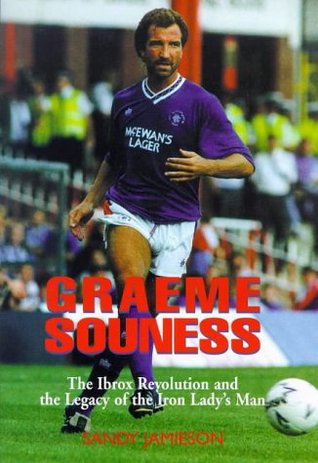
Graeme Souness: The Ibrox Revolution and the Legacy of the Iron Lady's
by Sandy Jamieson
This book is a brief analysis of the Souness era at Glasgow Rangers - 1986 to 1991. A phenomenally successful era that stopped the seemingly endless downwards spiral of the club rot and set in place the foundations of Rangers ‘9 in a row’ dominance in the league. What Souness brought to the club was both good and bad, though by far the former. Jamieson analyses this through the prism of Margaret Thatcher's politics and economic policies. He used his grit and her model, namely her economic policies and the primacy of a free market and competition to give the club 3 titles out of 4 and a winning formula that had eluded the club for decades. Jamieson correctly highlights how Souness glowed with pride at the Iron Lady's visit to Ibrox in March 1990. Twelve months later though Souness had left Rangers for Liverpool - perhaps in some ways a move up - but one he at first rebuffed and with hindsight may have regretted. He had nearly all he needed in Glasgow Rangers. And they weren't banned from Europe, which at the time Liverpool were. Liverpool's glory days were behind them and Souness couldn't reverse that trend. His success at Ibrox was, of course, relative. Winning the Scottish League never translated to progress in Europe, but at neither club could he seem to create the perfect formula for European success - which he so greatly craved as validation of his abilities.
Jamiesons book is convincing but it is not a biography of Souness time at Ibrox, nor does it claim to be. It is highlighting how Scotland changed. A small minority took Thatcherism to heart and ‘prospered’, others stuck to Scotland’s more socialist history. To cover his in a football book requires many assumptions and a tall order when trying to fit too much into its 230 pages. The text though offers thorough, albeit very subjective, analysis and opinion on the factors that influenced many of Souness's decisions and actions - from the victimisation by the SFA to the introduction of the first modern Catholic in the Rangers ranks. The bigotry of their non-Catholic 'policy' was a dinosaur hangover from an arcane past. Jamieson would have done well to bring in more contemporary politics into the conversation - beyond the hackneyed 'And what about the vegetables?' powerplay. Thatcher's brand of 'conservatism' and boot strap self-determination went against all Scotland socialist leanings.
Souness, it seems, believed in at least 2 fundamental principles of Thatcherism - primacy of market forces and the lack of sentimentality. These two factors, according to Jamieson, drove him to update the outmoded football club and reinstate it as one of the pillars of Scottish society and establishment, but riding it of many of its stuffy prejudices. Heritage can be lauded but culture moves on. The outmoded imperial and racist mind sets were brushed aside in the interests of success. Jamieson is right in his assertion that this boy from Edinburgh, with largely English sensibilities, was the only person strong enough, but sufficiently removed to carry these updates off and left the club in a far better position both in terms of results and attendance.
OK - so reading this over 20 years after its release makes this book an interesting read on another level. It was inconceivable at the time that Rangers would be in the same financial straits that Celtic suffered in the mid-1990s and going into administration in 2012 then bounced back to attracted attendances back in the 50,000's and successful runs in Europe before the end of the decade. This book celebrates Souness's contribution to a great club without glossing over some shameful incidents, events and out dated mindsets, whilst acknowledging that the 'other' side of Glasgow is in no way exonerated from its equal share in the shame. A shame which casts a long shadow for both clubs.
This book is flowingly written, an easy read over 24 short chapters giving a healthy overview of the West of Scotland and a Scottish institution which was in seemingly unstoppable decline before Souness came in. Bringing with him, as well as the English connection (Butcher, Stevens, Hateley et al) also the investor in the form of the now maligned David Murray. Assuming the generally popular myths that they were Hearts and Ayr United fans respectively reinforce the fact that these two were hard noses professionals who treated this sporting investment as a business venture not an act of devotion which of course every football fan wants. But this investment proved to be lucrative for both investors (including Souness to the tune of a few million by 1991) and fans alike in the form of trophies.
by Sandy Jamieson
This book is a brief analysis of the Souness era at Glasgow Rangers - 1986 to 1991. A phenomenally successful era that stopped the seemingly endless downwards spiral of the club rot and set in place the foundations of Rangers ‘9 in a row’ dominance in the league. What Souness brought to the club was both good and bad, though by far the former. Jamieson analyses this through the prism of Margaret Thatcher's politics and economic policies. He used his grit and her model, namely her economic policies and the primacy of a free market and competition to give the club 3 titles out of 4 and a winning formula that had eluded the club for decades. Jamieson correctly highlights how Souness glowed with pride at the Iron Lady's visit to Ibrox in March 1990. Twelve months later though Souness had left Rangers for Liverpool - perhaps in some ways a move up - but one he at first rebuffed and with hindsight may have regretted. He had nearly all he needed in Glasgow Rangers. And they weren't banned from Europe, which at the time Liverpool were. Liverpool's glory days were behind them and Souness couldn't reverse that trend. His success at Ibrox was, of course, relative. Winning the Scottish League never translated to progress in Europe, but at neither club could he seem to create the perfect formula for European success - which he so greatly craved as validation of his abilities.
Jamiesons book is convincing but it is not a biography of Souness time at Ibrox, nor does it claim to be. It is highlighting how Scotland changed. A small minority took Thatcherism to heart and ‘prospered’, others stuck to Scotland’s more socialist history. To cover his in a football book requires many assumptions and a tall order when trying to fit too much into its 230 pages. The text though offers thorough, albeit very subjective, analysis and opinion on the factors that influenced many of Souness's decisions and actions - from the victimisation by the SFA to the introduction of the first modern Catholic in the Rangers ranks. The bigotry of their non-Catholic 'policy' was a dinosaur hangover from an arcane past. Jamieson would have done well to bring in more contemporary politics into the conversation - beyond the hackneyed 'And what about the vegetables?' powerplay. Thatcher's brand of 'conservatism' and boot strap self-determination went against all Scotland socialist leanings.
Souness, it seems, believed in at least 2 fundamental principles of Thatcherism - primacy of market forces and the lack of sentimentality. These two factors, according to Jamieson, drove him to update the outmoded football club and reinstate it as one of the pillars of Scottish society and establishment, but riding it of many of its stuffy prejudices. Heritage can be lauded but culture moves on. The outmoded imperial and racist mind sets were brushed aside in the interests of success. Jamieson is right in his assertion that this boy from Edinburgh, with largely English sensibilities, was the only person strong enough, but sufficiently removed to carry these updates off and left the club in a far better position both in terms of results and attendance.
OK - so reading this over 20 years after its release makes this book an interesting read on another level. It was inconceivable at the time that Rangers would be in the same financial straits that Celtic suffered in the mid-1990s and going into administration in 2012 then bounced back to attracted attendances back in the 50,000's and successful runs in Europe before the end of the decade. This book celebrates Souness's contribution to a great club without glossing over some shameful incidents, events and out dated mindsets, whilst acknowledging that the 'other' side of Glasgow is in no way exonerated from its equal share in the shame. A shame which casts a long shadow for both clubs.
This book is flowingly written, an easy read over 24 short chapters giving a healthy overview of the West of Scotland and a Scottish institution which was in seemingly unstoppable decline before Souness came in. Bringing with him, as well as the English connection (Butcher, Stevens, Hateley et al) also the investor in the form of the now maligned David Murray. Assuming the generally popular myths that they were Hearts and Ayr United fans respectively reinforce the fact that these two were hard noses professionals who treated this sporting investment as a business venture not an act of devotion which of course every football fan wants. But this investment proved to be lucrative for both investors (including Souness to the tune of a few million by 1991) and fans alike in the form of trophies.
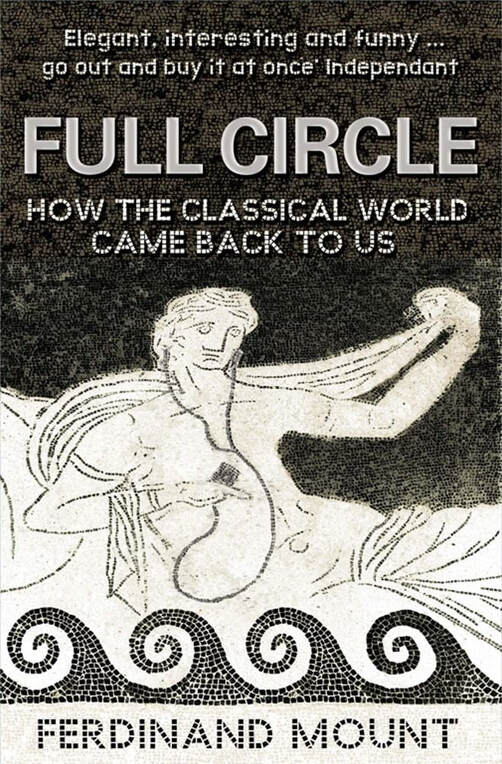
Full Circle: How the Classical World came back to us. Mount, Ferdinand.
The crux of this book is stated on p323 when Mount declared “now everything in human life was to be subject to the last judgement - Along with the bath and the gym and haute cuisine and the joy of sex, art disappeared as an independent force in human life”. What is clear from the outset though is that Mount is referring to a very Western perspective. For his readers, we are all western white males. I agree completely that we have come full circle - and that progress over time is neither from closed to open nor a pendulum - but it does overlook the dangers in the interests of convenience of making a compelling narrative.
As a piece of global history this book is pleasant but largely pointless. The opening words to this book are cringeworthy and Dawkin-eque but, despite being deliberately polemic, it in some ways set the tone for this light hearted look back across 3000 years: “God’s long funeral is over, and we are back where we started”. The sentiment I struggle to disagree with, but this setting up of such an easy target (in the form of religion), in order to knock it, seems to be the recurring theme through this book – but at no point is this edifice – on either side of the chronology, 100% convincing. Seemingly a collection of anecdotes (see for example p144 Fish soup from Naples in the 1950s), early on it seems to disingenuously overlook the influence of the Victorian era though the Victorians created the parameters of the debate, as he acknowledges later. He raises some interesting points, like now we have eras divided into decades – something that did not exist he claims before 1890s and even eloquently dissecting anti-religious polemics (p200) but this is a collection of essays not a book.
Although at points Mount doesn’t analyse obvious contradictions of his text – God is now dead like in the Ancient Era – yet the Baths under discussion are dedicated to Sulis Minerva (P36). The book rightly revels in the demise of religion (though it ultimately means only Christianity and then only in the west – I believe ‘religion’ in the rest of the world is on the rise)Indeed early on it reads almost like a tract against religion. He is also cherry picking from over 1000 years of history without completely acknowledging the wide span he is selecting from (500BC to 500AD - Would you include 1018 in modern day examples?). The book begins with some banal and mundane, but possibly essential observations - “we are the heirs of all the ages”. “We claim to be so unprecedentedly new and we tend to regard our modernity as a culmination. we are now hard wired to expect history to deliver progress, …jerky, flawed etc – but progress nonetheless.” All of which is true but some observations are laughable - P14 Mount “Swindon is Victorian Britain’s answer to Roman Ostia” although possibly meant as pithy and ironic is overlooking the history of this industrial port of the Roman era. Similarly when discussing Pop Stars and Eastern religion (eg. Beatles and Krishna) “Like the Mithraists, their rites were first celebrated in underground caverns, most famously that of the Beatles in Liverpool.” (p237) Mount seems to think that the “Modern itch to turn the past into a usable story” is an act of national piety and edification is somehow new or novel. I would say that this dates back to at least the time of Thucydides. “Our conversion to the cause of self-pampering” is another theme of his book. In celebrating this Mount presents his belief that Christianity was a blip in hedonist human mission. This is a worrying implication. Overall an interesting read, but not enthralling and certainly not convincing.
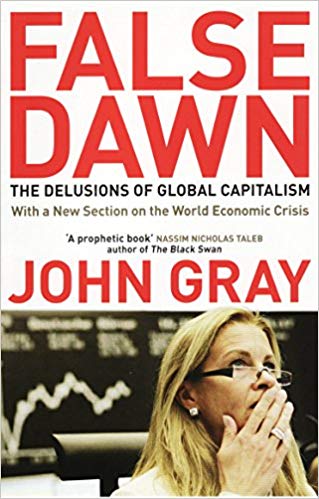
WARNING - Hagiography !
False Dawn: The delusions of Global Capitalism, Gray, John
What a phenomenal read. Enthralling, easy to follow, easy to pick up and hard to put down. Whilst it is not 100% convincing throughout on its premise, this book is compelling and Gray’s writing style makes for a fun journey. The book is a pointed, articulate and largely (for my ha’pennies worth) a correct attack on the current direction of Global Capitalism. Current in that it was published in the late 1990s (1998) but revised for the 21st Century and was prescient in its prediction of a global crisis - even if the ultimate power brokers of world governments again underpinned the pillars of capitalism at the expense of its peoples: An age of austerity and the experiments of quantitative easing became bye words for ‘people have to suffer in-order to maintain the credibility of the economic professions in the form of bankers and fund managers’.
Gray (according to other sources) is a former darling of the right and Thatcher - but over the last 3 decades has drastically changes his opinion based, I would assume, upon overwhelming evidence. Republished on a number of occasions since then (sometimes revised, sometimes with an additional foreword) the edition I read (2008) was compelling and frightening in its direct and relevant use of facts, figures and examples. In our post fact era such a collection of material is even more relevant and important that when it was first published. Over the last few decades more than any previous era we have had prophecies about the end of capitalism, against an apparently ‘common sense’ approach that it is instead the logical end of history. Each time a possible crisis points, for naysayers, to an alternative, we seem to be confounded as we head instead unabated and with added vigour towards hyper capitalism, which only seems to further destroy the planet at a faster rate than we could have imaged previously.
Ultimately the origins of our current catastrophe lay “in the Utopian endeavour of economic liberalism to set up a self-regulating market system”. Without a doubt markets have always been an essential tool for man to flourish and are indeed ancient establishments to facilitate trade, but until recently they only sought to supply what could practically be sourced to the highest bidder. Now with the deadly combination of improved technology meeting the moral vacuum of capitalism the possibilities of supply meeting demand, in the short term at least, are limitless. Gray comments on all of this and offers possible answers - but those answers, or other correct answers, need to be implemented as soon as possible to leave future generations with any hope of enjoying fruitful lives with the same qualities we have experienced in the 20th and early 21st Centuries.
Of the two apparent most recent enlightenment Utopias (there were many possible options) bastardised Communism and corrupted Capitalism ultimately won out in the early 20th century. Russia ‘lost’ and therefore to the victor go the spoils - America was perceived as ‘winning’. But the American free market economy was a hugely flawed system as well. Global democratic capitalism is as unrealizable a condition as world-wide communism. Gray, relying heavily on Karl Polanyi, makes a compelling argument that this is definitely the case. Read this book, be entertained and learn.
False Dawn: The delusions of Global Capitalism, Gray, John
What a phenomenal read. Enthralling, easy to follow, easy to pick up and hard to put down. Whilst it is not 100% convincing throughout on its premise, this book is compelling and Gray’s writing style makes for a fun journey. The book is a pointed, articulate and largely (for my ha’pennies worth) a correct attack on the current direction of Global Capitalism. Current in that it was published in the late 1990s (1998) but revised for the 21st Century and was prescient in its prediction of a global crisis - even if the ultimate power brokers of world governments again underpinned the pillars of capitalism at the expense of its peoples: An age of austerity and the experiments of quantitative easing became bye words for ‘people have to suffer in-order to maintain the credibility of the economic professions in the form of bankers and fund managers’.
Gray (according to other sources) is a former darling of the right and Thatcher - but over the last 3 decades has drastically changes his opinion based, I would assume, upon overwhelming evidence. Republished on a number of occasions since then (sometimes revised, sometimes with an additional foreword) the edition I read (2008) was compelling and frightening in its direct and relevant use of facts, figures and examples. In our post fact era such a collection of material is even more relevant and important that when it was first published. Over the last few decades more than any previous era we have had prophecies about the end of capitalism, against an apparently ‘common sense’ approach that it is instead the logical end of history. Each time a possible crisis points, for naysayers, to an alternative, we seem to be confounded as we head instead unabated and with added vigour towards hyper capitalism, which only seems to further destroy the planet at a faster rate than we could have imaged previously.
Ultimately the origins of our current catastrophe lay “in the Utopian endeavour of economic liberalism to set up a self-regulating market system”. Without a doubt markets have always been an essential tool for man to flourish and are indeed ancient establishments to facilitate trade, but until recently they only sought to supply what could practically be sourced to the highest bidder. Now with the deadly combination of improved technology meeting the moral vacuum of capitalism the possibilities of supply meeting demand, in the short term at least, are limitless. Gray comments on all of this and offers possible answers - but those answers, or other correct answers, need to be implemented as soon as possible to leave future generations with any hope of enjoying fruitful lives with the same qualities we have experienced in the 20th and early 21st Centuries.
Of the two apparent most recent enlightenment Utopias (there were many possible options) bastardised Communism and corrupted Capitalism ultimately won out in the early 20th century. Russia ‘lost’ and therefore to the victor go the spoils - America was perceived as ‘winning’. But the American free market economy was a hugely flawed system as well. Global democratic capitalism is as unrealizable a condition as world-wide communism. Gray, relying heavily on Karl Polanyi, makes a compelling argument that this is definitely the case. Read this book, be entertained and learn.
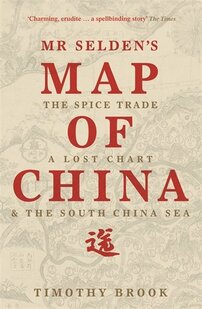
Timothy Brook, Mr. Selden's Map of China (New York: Bloomsbury, October 2013)
This is an interesting, and entertaining study (part speculation) on the life and journey of one of Oxford’s Bodleian Library’s many curious possessions. A 16th Century map and one of the first Chinese maps to reach Europe. It came to the Library in 1659 from the estate of the London lawyer John Selden, who in turn must have acquired it by at least 1653. Centred around a sea (the South China Sea) the map itself is a curiosity not just for China but also the whole of East and Southeast Asia. Earlier and most later maps depicted China not only as the centre of the known world, but as occupying almost its entire area. By contrast China occupies less than one half of the area of the Selden Map.
But the book is also of interest beyond Brooks narrative about the map and speculation on its origin and contents. The book is as relevant today as the era which it purports to study and analyse. Not least the rise of the global entity that is China, but also the racism, presumptions and the increasing morale vacuum that is business today. Indeed "in the moral vacuum of business the appearance of 'gravitie' was everything" (p70) Brook quotes in the book. These words are as relevant now at the end of modern Capitalism as they were at its English beginnings. Such quotes, alongside things like the HMS Victory (1737) reports on Newspapers of 1740's, shows the same greed and all consuming avarice are still true but in the modern age / generation we 'assume' we are 'beyond' a lot of things. We fool ourselves more than we care to acknowledge. Where large corporations are bailed out by governments (from banks like the Royal Bank of Scotland in 2008 or the trainline losing money like East Coast Main Line 2018). Governments will uphold the pillars of the flawed free market economy at the expense of benefits. This ties nicely with the East India Companies exploits, expansion and actions in the spreading of British corporations in the area.
The text acts as a timely and contemporarily comment on as much or as little as you choose to interpret from a random possibly commonplace map: An interesting read and for me at least a timely reminder.
This is an interesting, and entertaining study (part speculation) on the life and journey of one of Oxford’s Bodleian Library’s many curious possessions. A 16th Century map and one of the first Chinese maps to reach Europe. It came to the Library in 1659 from the estate of the London lawyer John Selden, who in turn must have acquired it by at least 1653. Centred around a sea (the South China Sea) the map itself is a curiosity not just for China but also the whole of East and Southeast Asia. Earlier and most later maps depicted China not only as the centre of the known world, but as occupying almost its entire area. By contrast China occupies less than one half of the area of the Selden Map.
But the book is also of interest beyond Brooks narrative about the map and speculation on its origin and contents. The book is as relevant today as the era which it purports to study and analyse. Not least the rise of the global entity that is China, but also the racism, presumptions and the increasing morale vacuum that is business today. Indeed "in the moral vacuum of business the appearance of 'gravitie' was everything" (p70) Brook quotes in the book. These words are as relevant now at the end of modern Capitalism as they were at its English beginnings. Such quotes, alongside things like the HMS Victory (1737) reports on Newspapers of 1740's, shows the same greed and all consuming avarice are still true but in the modern age / generation we 'assume' we are 'beyond' a lot of things. We fool ourselves more than we care to acknowledge. Where large corporations are bailed out by governments (from banks like the Royal Bank of Scotland in 2008 or the trainline losing money like East Coast Main Line 2018). Governments will uphold the pillars of the flawed free market economy at the expense of benefits. This ties nicely with the East India Companies exploits, expansion and actions in the spreading of British corporations in the area.
The text acts as a timely and contemporarily comment on as much or as little as you choose to interpret from a random possibly commonplace map: An interesting read and for me at least a timely reminder.

WARNING - Hagiography ! I make no apology - the time is NOW.
Capitalist Realism, Fisher, Mark
I for one really enjoyed this pamphlet - I think it would be a bit disingenuous to call it a book. ‘Pamphlet’ for me is reminiscent as well of a the 17th and 18th century rally communications of the same name which could act as a call for a change in the way we act or think (See for example the 17th Century Pamphlet Wars!). And in the way we treat sacrosanct common sense. As has been pointed out in the past up until what we now arrogantly call the early modern era the divine right of kings was common sense and unassailable in its sacrosanct place in the mindset of all who thought about it. Things can and do change in the popular perception and hopefully this essay is one of the earliest indicators that things are changing, potentially for the better.
This is not a review but a call to arms - read this pamphlet and I hope you will change your outlook.
We, humanity, are standing on a tightrope ..... and might just be falling off........
Capitalist Realism, Fisher, Mark
I for one really enjoyed this pamphlet - I think it would be a bit disingenuous to call it a book. ‘Pamphlet’ for me is reminiscent as well of a the 17th and 18th century rally communications of the same name which could act as a call for a change in the way we act or think (See for example the 17th Century Pamphlet Wars!). And in the way we treat sacrosanct common sense. As has been pointed out in the past up until what we now arrogantly call the early modern era the divine right of kings was common sense and unassailable in its sacrosanct place in the mindset of all who thought about it. Things can and do change in the popular perception and hopefully this essay is one of the earliest indicators that things are changing, potentially for the better.
This is not a review but a call to arms - read this pamphlet and I hope you will change your outlook.
We, humanity, are standing on a tightrope ..... and might just be falling off........
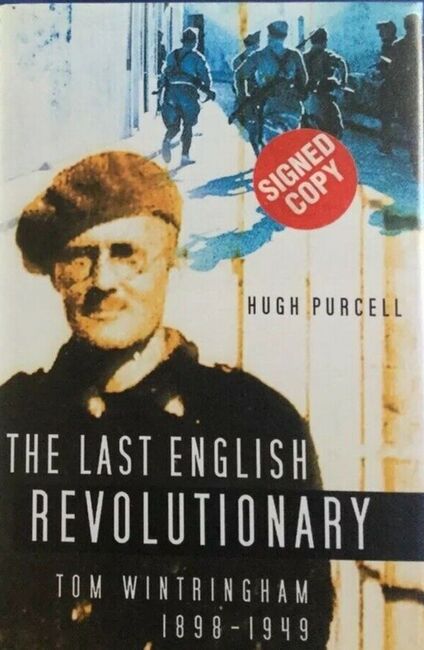
The Last English Revolutionary: Tom Wintringham 1898-1949 (2004) by Hugh Purcell
Before reading this book I knew nothing about Tom Wintringham. And frustratingly, beyond a passing interest in mid-20th Century Socialism, I do not know why this book appeared on my list of possible reads. Anyway - the book finally appeared on Ebay at a nice price just as I was finishing another – so I picked it up for the princely sum of £3. The rest, as they say, is history. Suffice to say that Wintringham was an important workhorse behind both the Communist Party of Great Britain and a pivotal character in the emergence of the Home Guard, or dad's army as it is more popularly known nowadays (thanks in no small part to the TV programme), as well as author of two hugely popular 1940 books ‘New Ways of War’ and ‘Armies of Freemen’. The pages of this very sympathetic biography portray a fascinating character with an intellectual demeanour and rigour but a simple and sincere outlook, as well as an amiable, hardworking man and prolific writer. From the outset this narrative tries pointedly not to be a simplistic chronological narrative journey but, for me, falls into a slightly superficial journey without the intricacies of the wider historical context. Purcell’s main area of knowledge is the Spanish Civil War - and it is here that he is in his element - not falling foul of base speculation, but informed judgement. It is presumably his awareness of Wintringham from his important role in this conflict that led to the book. And it is this period that brings the book beyond a simple dull biography. The Spanish Civil War, in conjunction with his First World War experience, was also formative in Wintringham’s later emergence as a respected writer and card carrying communist.
Whilst this is largely sensitive portrayal of Wintringham, who passed away prematurely in 1949, it doesn’t shy away from either Wintringham’s misguided devotion to Stalin or his rampant philandering and his ability to ride roughshod over his early trysts. This is a quaint portrayal - both informative but partial to the character an elitist public school philander who was also a devoted Communist – despite expulsion from the party (for the above philandering!).
One disappointing aspect which I cannot correct or add to is when Purcell claims the protagonist was a good poet, is the use of other poets feature nearly as much as Wintringham's own .... an indictment on the quality of his poetry! But the merits of any poetry is well beyond my ken. Overall a pleasant and easy to read review of a life, but this is not a particularly critical biography, important largely because it is the only book length study about this influential and important mid-20th century figure. Useful for me at least in informing me about someone I knew nothing about.
Before reading this book I knew nothing about Tom Wintringham. And frustratingly, beyond a passing interest in mid-20th Century Socialism, I do not know why this book appeared on my list of possible reads. Anyway - the book finally appeared on Ebay at a nice price just as I was finishing another – so I picked it up for the princely sum of £3. The rest, as they say, is history. Suffice to say that Wintringham was an important workhorse behind both the Communist Party of Great Britain and a pivotal character in the emergence of the Home Guard, or dad's army as it is more popularly known nowadays (thanks in no small part to the TV programme), as well as author of two hugely popular 1940 books ‘New Ways of War’ and ‘Armies of Freemen’. The pages of this very sympathetic biography portray a fascinating character with an intellectual demeanour and rigour but a simple and sincere outlook, as well as an amiable, hardworking man and prolific writer. From the outset this narrative tries pointedly not to be a simplistic chronological narrative journey but, for me, falls into a slightly superficial journey without the intricacies of the wider historical context. Purcell’s main area of knowledge is the Spanish Civil War - and it is here that he is in his element - not falling foul of base speculation, but informed judgement. It is presumably his awareness of Wintringham from his important role in this conflict that led to the book. And it is this period that brings the book beyond a simple dull biography. The Spanish Civil War, in conjunction with his First World War experience, was also formative in Wintringham’s later emergence as a respected writer and card carrying communist.
Whilst this is largely sensitive portrayal of Wintringham, who passed away prematurely in 1949, it doesn’t shy away from either Wintringham’s misguided devotion to Stalin or his rampant philandering and his ability to ride roughshod over his early trysts. This is a quaint portrayal - both informative but partial to the character an elitist public school philander who was also a devoted Communist – despite expulsion from the party (for the above philandering!).
One disappointing aspect which I cannot correct or add to is when Purcell claims the protagonist was a good poet, is the use of other poets feature nearly as much as Wintringham's own .... an indictment on the quality of his poetry! But the merits of any poetry is well beyond my ken. Overall a pleasant and easy to read review of a life, but this is not a particularly critical biography, important largely because it is the only book length study about this influential and important mid-20th century figure. Useful for me at least in informing me about someone I knew nothing about.
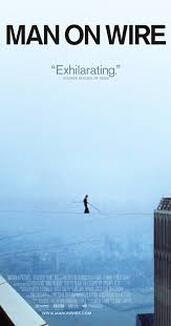
Man on a Wire Documentary 2008 Director: James Marsh
This is a witty, well presented documentary about one man’s ambition to walk a tightrope across the now infamous twin towers in New York. He had walked Notre Dame (69m high) amongst other lofty - though more realistic – landmarks. For the Twin Towers (415m) he had to overcome heavy security and armed officers before wiring a line and guide lines across the two towers (using an ever reliable bow and arrow!). The film is endearingly anti-American, touching and human. The story is both fascinating and enthralling, made even more poignant by what was to follow later in the life of the two super structures. This is a true freedom fries story of courage, insecurity and new world conservatism all bundled together in a fast food community – the easy to watch documentary puts all the effort in behind the scenes - you can just enjoy the results. But you are also emotionally invested in the results and perhaps cheering for the underdog - at the same time just praying he doesn't fall off!
What must not be forgotten though is Philippe Petit was treated like a celebrity (which he was) but his assistants and partners in crime treated like criminals (and deported!). A damning indictment of celebrity culture we have immersed ourselves in in the post-War West: adhering to the American Dream framework. Perhaps it is this vacuous worship of just the man at the top that ultimately led to the demolition of the two edifices: We are encouraged to chase a dream, without realising that often working together is the only way we can achieve art, expression or the spectable.
This is a witty, well presented documentary about one man’s ambition to walk a tightrope across the now infamous twin towers in New York. He had walked Notre Dame (69m high) amongst other lofty - though more realistic – landmarks. For the Twin Towers (415m) he had to overcome heavy security and armed officers before wiring a line and guide lines across the two towers (using an ever reliable bow and arrow!). The film is endearingly anti-American, touching and human. The story is both fascinating and enthralling, made even more poignant by what was to follow later in the life of the two super structures. This is a true freedom fries story of courage, insecurity and new world conservatism all bundled together in a fast food community – the easy to watch documentary puts all the effort in behind the scenes - you can just enjoy the results. But you are also emotionally invested in the results and perhaps cheering for the underdog - at the same time just praying he doesn't fall off!
What must not be forgotten though is Philippe Petit was treated like a celebrity (which he was) but his assistants and partners in crime treated like criminals (and deported!). A damning indictment of celebrity culture we have immersed ourselves in in the post-War West: adhering to the American Dream framework. Perhaps it is this vacuous worship of just the man at the top that ultimately led to the demolition of the two edifices: We are encouraged to chase a dream, without realising that often working together is the only way we can achieve art, expression or the spectable.
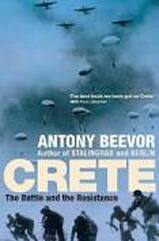
Crete: The Battle and the Resistance Book by Antony Beevor
A good book, but very slanted towards a military history rather than a people’s history it implies it covers.
Crete was strategically critical to both Axis and Allied plans in the early years of the Second World War. Once Nazi Germany realised that Italian advances begun in October 1940 were not efficient she the lead power stepped in to ensure the surprisingly quick fall of Greece. With mainland Greece lost, alongside the tide of events such as the Fall of Dunkirk (June 1940), the pattern across Europe was clear. British and allied ineptitude, differing priorities, and misinformation combined with miscommunication all played a role. However, the Allies wanted to hold Crete at all costs as it could prove strategically critical as both a jumping off point for North Africa and aerial access to the oil fields of Romania. In order to take the island, the German airborne divisions launched the largest ever mounted expedition and expected a smooth success and to easily overrun the island. Instead it resulted in huge bloodshed and a close run thing which could have gone either way. The Nazi invaders were also genuinely surprised not just at the level of British resistance but also at the native populations hostile reaction both during invasion and the subsequent occupation. It was never an ‘easy’ occupation, when compared to other sites across Europe.
This book covers the period from the fall of the Greek mainland through to Crete’s liberation in 1944. But its focus is less on the local population and more on the British troops and their actions, and influence. Perhaps the local has been done justice in the Cretan runner. (George Psychoundakis). This is a strange book. It has all the hallmarks of a classic Anglo-centric history book about the fight to hold Crete in 1941 but also tries, albeit less convincingly, to deal with the native Cretan resistance to Nazi occupation on the island as well. It also includes both research on German data and interviews. This though is a very good book from a British military record point of view dealing with the characters involved and events which occurred on the island from 1941 to 1944. One obvious flaw is that this is not a detailed chronological narrative across days, weeks and months but instead is full of anecdotes at the expense of specific stories. This leads to the information being patchy and confusing at points, especially when Beevor tries to describe Cretan resistance. It is concluded that a number of people are thrown into wells and caves, but the islanders also have a tendency to exaggerate their stories as the years have passed. Whilst repetition at points is unavoidable is well handled. These risks Beevor acknowledges and mitigates where he can, but one feels that he instead chooses to focus on the British role both for the battle (understandably) and the resistance because it is better documented and sources are more readily available. Though the book whether intentional or not does capture the depressing realities of man’s inhumanity to man. Many people died merely as collateral on both sides of this campaign.
In focusing disproportionately on the British role at points it proffers more questions than it answers. When food was at an absolute premium, how did the Cretan’s enable or facilitate specific people to live secretly for months and years safely on the island without starving? (The simple answer is of course by huge sacrifice). Another consequence of focusing on the British though is that Beevor highlights the many absurdities and the inspiration for Evelyn Waugh’s Officers and Gentleman and many of his other thinly veiled caricatures. Crete was lost in no small part due to incompetence and miscommunication, but resisted in part thanks to astounding bravery of SOE (And US OSS) but also the astounding strength of character and willing contribution, despite at points the horrific cost, of the local population.
A good book, but very slanted towards a military history rather than a people’s history it implies it covers.
Crete was strategically critical to both Axis and Allied plans in the early years of the Second World War. Once Nazi Germany realised that Italian advances begun in October 1940 were not efficient she the lead power stepped in to ensure the surprisingly quick fall of Greece. With mainland Greece lost, alongside the tide of events such as the Fall of Dunkirk (June 1940), the pattern across Europe was clear. British and allied ineptitude, differing priorities, and misinformation combined with miscommunication all played a role. However, the Allies wanted to hold Crete at all costs as it could prove strategically critical as both a jumping off point for North Africa and aerial access to the oil fields of Romania. In order to take the island, the German airborne divisions launched the largest ever mounted expedition and expected a smooth success and to easily overrun the island. Instead it resulted in huge bloodshed and a close run thing which could have gone either way. The Nazi invaders were also genuinely surprised not just at the level of British resistance but also at the native populations hostile reaction both during invasion and the subsequent occupation. It was never an ‘easy’ occupation, when compared to other sites across Europe.
This book covers the period from the fall of the Greek mainland through to Crete’s liberation in 1944. But its focus is less on the local population and more on the British troops and their actions, and influence. Perhaps the local has been done justice in the Cretan runner. (George Psychoundakis). This is a strange book. It has all the hallmarks of a classic Anglo-centric history book about the fight to hold Crete in 1941 but also tries, albeit less convincingly, to deal with the native Cretan resistance to Nazi occupation on the island as well. It also includes both research on German data and interviews. This though is a very good book from a British military record point of view dealing with the characters involved and events which occurred on the island from 1941 to 1944. One obvious flaw is that this is not a detailed chronological narrative across days, weeks and months but instead is full of anecdotes at the expense of specific stories. This leads to the information being patchy and confusing at points, especially when Beevor tries to describe Cretan resistance. It is concluded that a number of people are thrown into wells and caves, but the islanders also have a tendency to exaggerate their stories as the years have passed. Whilst repetition at points is unavoidable is well handled. These risks Beevor acknowledges and mitigates where he can, but one feels that he instead chooses to focus on the British role both for the battle (understandably) and the resistance because it is better documented and sources are more readily available. Though the book whether intentional or not does capture the depressing realities of man’s inhumanity to man. Many people died merely as collateral on both sides of this campaign.
In focusing disproportionately on the British role at points it proffers more questions than it answers. When food was at an absolute premium, how did the Cretan’s enable or facilitate specific people to live secretly for months and years safely on the island without starving? (The simple answer is of course by huge sacrifice). Another consequence of focusing on the British though is that Beevor highlights the many absurdities and the inspiration for Evelyn Waugh’s Officers and Gentleman and many of his other thinly veiled caricatures. Crete was lost in no small part due to incompetence and miscommunication, but resisted in part thanks to astounding bravery of SOE (And US OSS) but also the astounding strength of character and willing contribution, despite at points the horrific cost, of the local population.
|
|
|

Trobriand Cricket: An Ingenious Response to Colonialism (Filmed 1973-4)
54 minutes #
For fans of Cricket and anthropology (which includes me) this is an exciting and interesting premise and brilliantly executed: An anthropological documentary about the people of the Trobriand Islands and their unique innovations to the game of cricket after its introduction by the (well meaning?) British colonial forces of Church and State. The film was made by Gary Kildea, under the direction of anthropologist Jerry Leach. It shows the truly fascinating evolution of the gentleman’s game on a small collection of islands off the east coast of New Guinea.
Cricket itself already (even by the 1970s when the film was made) had many incarnations - from the traditional Test cricket through One Day and Limited Overs to the more playground orientated French Cricket. In Trobriand, like the more informal French Cricket, the numbers seem limited only by the number of male members of the tribes involved. The plumage, performance and theatrical aspects are taken to absurd ends - as is the presence of faux ‘western tourists’ with camera’s and colourful shirts!
The film itself is an optimistic, possibly patronising, analysis of the effects of colonialism and it's enactment and implementation of its traditions on local populations. Without English (or British) settlers and missionaries Trobriand would not be playing cricket, but how they adopted and applied it politically and practically is engaging, informative and enlightening. It is far more frenetic than IPL20/20 but also far more complicated. In inverting the rules it helps also to highlight the political machinations amongst and about the teams. This is one colonial tool or instrument that seems to be loved by the locals but has been adopted to one's own ends. Well worth watching to form your own opinions.
54 minutes #
For fans of Cricket and anthropology (which includes me) this is an exciting and interesting premise and brilliantly executed: An anthropological documentary about the people of the Trobriand Islands and their unique innovations to the game of cricket after its introduction by the (well meaning?) British colonial forces of Church and State. The film was made by Gary Kildea, under the direction of anthropologist Jerry Leach. It shows the truly fascinating evolution of the gentleman’s game on a small collection of islands off the east coast of New Guinea.
Cricket itself already (even by the 1970s when the film was made) had many incarnations - from the traditional Test cricket through One Day and Limited Overs to the more playground orientated French Cricket. In Trobriand, like the more informal French Cricket, the numbers seem limited only by the number of male members of the tribes involved. The plumage, performance and theatrical aspects are taken to absurd ends - as is the presence of faux ‘western tourists’ with camera’s and colourful shirts!
The film itself is an optimistic, possibly patronising, analysis of the effects of colonialism and it's enactment and implementation of its traditions on local populations. Without English (or British) settlers and missionaries Trobriand would not be playing cricket, but how they adopted and applied it politically and practically is engaging, informative and enlightening. It is far more frenetic than IPL20/20 but also far more complicated. In inverting the rules it helps also to highlight the political machinations amongst and about the teams. This is one colonial tool or instrument that seems to be loved by the locals but has been adopted to one's own ends. Well worth watching to form your own opinions.
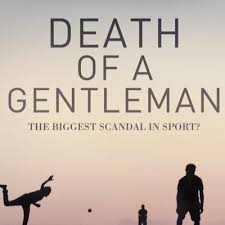
Death of a Gentleman: The Biggest Scandal in Sport 2015 documentary 1h 40 mins
The various tags lines for this film included ‘A billion fans, two journalists, one game, and something worth fighting for’. And “Two cricket journalists stumble upon one of the biggest sporting scandals ever.” But in true glitzy glamour style of our media age these are both grand overstatements. There is no doubt that Cricket - like Rugby and Football before it - is going the way of other major sports and sporting event. Whilst the investigations (and cricket more generally) do reek of corruption, this documentary offers little in the way of solid evidence - and is merely speculation. I could find a lot of ungentlemanly conduct - but came away a little unmoved and apathetic rather than the desired apoplectic and frustrated. I for one will keep following test cricket and fight the battles I might win. It is now about exploiting the money making opportunities over the perceived pleasure of the game or indeed the audience. And for Cricket the three at the top of the money tree are India, Australia and England. The rest risk being left behind or hanging onto their coat tails. If we assume, or acknowledge, that cash is king and surrender to late capitalisms victory (over communism if there has to be an ‘other’ ) then the IPL and the faster less complex form of entertainment over the chess tactics of 5 day tests means the victory of this instant gratification format, and with it the cash of larger more easily fleeced crowd for instant satisfaction, these crowds are what cricket authorities today court.
Using Ed Cowan’s late career as parallel for corruption of the sport the producers decry the “half built monument to global success …” but seem to not acknowledge that to the victors go the spoils. My own depressing take is that the whole things is corrupt and long may it rot! But the public will pay to watch spectacles and always have! Looking back in 50 years when test cricket is firmly outmoded and even more quaint this film will act as a reminder just how powerless individuals are in a sea of supply and demand. Powerless to make a difference but at least they recorded the whole journey. Lalot Modi’s IPL 20 20 is of course endemic of the immediate gratification aspect but he is gone and instead is accusing his successors of exploiting this opportunity. Who the money is going to is not really answered - individuals or the big three national organisations. But ultimately that is not the question, and the answer will remain unknown perhaps until it is too late.
The various tags lines for this film included ‘A billion fans, two journalists, one game, and something worth fighting for’. And “Two cricket journalists stumble upon one of the biggest sporting scandals ever.” But in true glitzy glamour style of our media age these are both grand overstatements. There is no doubt that Cricket - like Rugby and Football before it - is going the way of other major sports and sporting event. Whilst the investigations (and cricket more generally) do reek of corruption, this documentary offers little in the way of solid evidence - and is merely speculation. I could find a lot of ungentlemanly conduct - but came away a little unmoved and apathetic rather than the desired apoplectic and frustrated. I for one will keep following test cricket and fight the battles I might win. It is now about exploiting the money making opportunities over the perceived pleasure of the game or indeed the audience. And for Cricket the three at the top of the money tree are India, Australia and England. The rest risk being left behind or hanging onto their coat tails. If we assume, or acknowledge, that cash is king and surrender to late capitalisms victory (over communism if there has to be an ‘other’ ) then the IPL and the faster less complex form of entertainment over the chess tactics of 5 day tests means the victory of this instant gratification format, and with it the cash of larger more easily fleeced crowd for instant satisfaction, these crowds are what cricket authorities today court.
Using Ed Cowan’s late career as parallel for corruption of the sport the producers decry the “half built monument to global success …” but seem to not acknowledge that to the victors go the spoils. My own depressing take is that the whole things is corrupt and long may it rot! But the public will pay to watch spectacles and always have! Looking back in 50 years when test cricket is firmly outmoded and even more quaint this film will act as a reminder just how powerless individuals are in a sea of supply and demand. Powerless to make a difference but at least they recorded the whole journey. Lalot Modi’s IPL 20 20 is of course endemic of the immediate gratification aspect but he is gone and instead is accusing his successors of exploiting this opportunity. Who the money is going to is not really answered - individuals or the big three national organisations. But ultimately that is not the question, and the answer will remain unknown perhaps until it is too late.
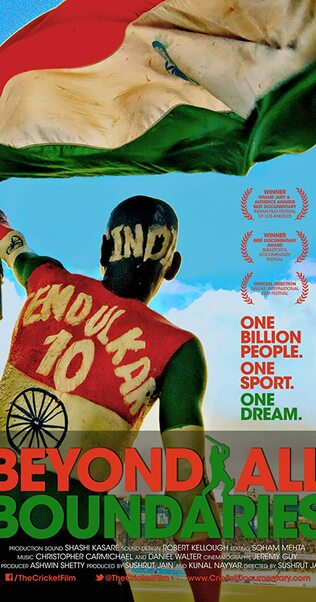
Beyond All Boundaries Documentary 2013
A fascinating documentary notionally about 2011 Cricket World Cup but also at the same time very much about 1 billion people. Built around the heroic figure of Sashin Tendulkar, it is hard to underrate his influence across the subcontinent: 1 Billion people worship him as a genius cricketer and brilliant combatant. Consistently rated as the Second greatest one day and test batsmen of all time (behind 2 different front runners in Don Bradman and Viv Richards respectively).
Through the prism of this greatness the film follows three Indian characters. In this aspect it is pleasant but a bit too focused on the romantic stories of joy and success. However reality is never far away. Shanty town and slums vie for attention and screen time with glamorous Indian cricket team. Following a female cricketer hoping for success in the under 19 squad, an 11 year boy old who's passionate and invested father was hoping for success and a fanatical cyclist and Sachin Tendulcar follower just enjoying the success of the Indian national team. In many ways all 3 succeed, can that be true of 1 billion people? Spiritually though you get the impression the whole country could be carried along.
Interesting and enjoyable. Worth watching for cricket fans.
A fascinating documentary notionally about 2011 Cricket World Cup but also at the same time very much about 1 billion people. Built around the heroic figure of Sashin Tendulkar, it is hard to underrate his influence across the subcontinent: 1 Billion people worship him as a genius cricketer and brilliant combatant. Consistently rated as the Second greatest one day and test batsmen of all time (behind 2 different front runners in Don Bradman and Viv Richards respectively).
Through the prism of this greatness the film follows three Indian characters. In this aspect it is pleasant but a bit too focused on the romantic stories of joy and success. However reality is never far away. Shanty town and slums vie for attention and screen time with glamorous Indian cricket team. Following a female cricketer hoping for success in the under 19 squad, an 11 year boy old who's passionate and invested father was hoping for success and a fanatical cyclist and Sachin Tendulcar follower just enjoying the success of the Indian national team. In many ways all 3 succeed, can that be true of 1 billion people? Spiritually though you get the impression the whole country could be carried along.
Interesting and enjoyable. Worth watching for cricket fans.
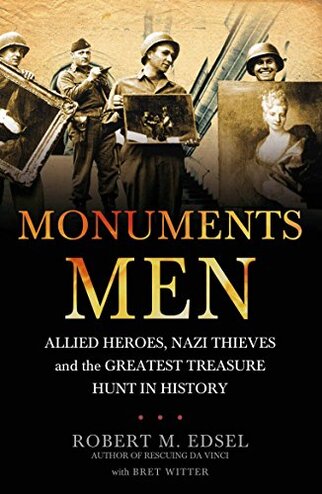
Book review: Monuments Men: Allied Heroes, Nazi thieves and the greatest treasure hunt in History. Robert Edsel
The story presented here is of Allied soldiers saving culturally important artefacts from loss and destruction in mid 1940s Europe. Despite the subtitle (Allied Heroes) this is a very American centric book. The text makes repeated reference to men and women of 13 allied countries but only focuses its stories on American efforts during the war. Geoffrey Webb the MFAA commanding officer for Western Europe for example barely merits two passing mentions. Perhaps his efforts were not as practical on the ground, but context and background and his efforts would have added value and gravitas to this narrative. It also only goes up to July 1945 despite the fact that MFAA was officially disbanded in 1946 and there were (as stated in the book synopsis!) at least another 6 years of work, though of course the returns continued until well into the 21st Century. Instead it felt like soldiers under fire hunting treasure - which in no way detracts from their valuable work - or that of their French ally Rose Valland whose underground work takes up much of the text. Their efforts involved finding and returning art and being under fire!
What cannot be questioned is that the Americans undoubtedly made the largest contribution to the efforts to save artefacts both destroyed and confiscated by Nazi action. French and British priorities seldom had the time to entertain such cultural luxuries - despite Churchill’s famous (probably falsely attributed) quote that it was a war for the culture and “the Arts”. Their French and British allies feature here as little more than footnotes. This is, though, a well laid out book - at least early on - jumping between chronology of Lt. Cdr. George Stout's MFAA formation and the Nazi directives to legitimise confiscation and appropriating amazing art - much of which is in the 21st century still missing or in the wrong hands. There is a lack of context as to who Einsatzstab Reichsleiter Rosenberg is in this framework and introductory biopics are on the main American characters though (the heroes!). As the book moves beyond first 50 pages of context we descend into an onslaught of pilfering, as Museums and private (invariably Jewish) collections all over Europe were broken up and transported to Germany. Quite freely written and flowing, the fluid style gets quite grating at points. More context on the fascinating history of the famous Ghent Altarpiece would be useful, instead Edsel overlooked that German royalty had bought part of it before the First World War - a century before in fact - but that some had been pillaged by Germany during WWI. Confidence in the absolute accuracy of this entertaining book is weak - compounded by some sloppy errors. There is even an unfortunate error on the first page - Major Balfour's middle name is spelt wrong (pxvii). Likewise i would not call Balfour's accent midlands more south east or home counties! The text often reads 'a week or two later' when proper research and cross reference of diaries may have given specific timelines. Whilst the use of the adjective 'dapper' to describe Lieutenant Stout may be fitting, it is overused (p19,21,26 and 50,88,106) and becomes almost a Homeric epithet - perhaps that is the intention! That said, all these gripes are minor for what is mean to be and succeeds in being an easy read about the meeting at one juncture of 'culture' and 'conflict'.
And some may be more conscious that I give credit for, Edsel for example makes little of, but regularly references, the moral indignation of the Monument men. Playing on the virtuous frustration of the unimpeachable allies. In clever contrast there are then a few nice paragraphs with context that highlight western hegemony and how history is only written by the winners. The Louvre was largely defined and populated by Napoleon's 1800's jaunt east, the same souvenir hunting Hitler and Göring were doing. Goebbels appears more culturally influenced. Either way both ideologies were sickening but they were also history repeating itself. In some ways a catalogue of tragic losses beyond human life are things like the manuscripts and monuments of Saint-Lô especially, but the author also balances it with perspective of the 'necessities ' of war. The restoration and restrictions of necessity and convenience are addressed well both in official scripture cited and practical realities on the ground (Monte Cassino and Normandy).
Also not overlooked, and in many ways important, is the note of irony of Germany's history and unprecedented kunstschutz which was led by a sympathetic art historian with a historic name (Count Wolff Metternich) rather than ardent nazi. The 'good german’ trope wears a bit thin however. Overall this is a thorough book but not an academic study and what it achieves is a good overview of the important work the MMFA sought to do in the final years of the war and afterwards - repairing where possible and returning works of art to their rightful owners. In the process they preserved much of the art we perceive as important for shaping our evolution as an educated, informed and peace loving species! Perhaps the WWII was just an aberration and blip, though unfortunately I suspect not.
The story presented here is of Allied soldiers saving culturally important artefacts from loss and destruction in mid 1940s Europe. Despite the subtitle (Allied Heroes) this is a very American centric book. The text makes repeated reference to men and women of 13 allied countries but only focuses its stories on American efforts during the war. Geoffrey Webb the MFAA commanding officer for Western Europe for example barely merits two passing mentions. Perhaps his efforts were not as practical on the ground, but context and background and his efforts would have added value and gravitas to this narrative. It also only goes up to July 1945 despite the fact that MFAA was officially disbanded in 1946 and there were (as stated in the book synopsis!) at least another 6 years of work, though of course the returns continued until well into the 21st Century. Instead it felt like soldiers under fire hunting treasure - which in no way detracts from their valuable work - or that of their French ally Rose Valland whose underground work takes up much of the text. Their efforts involved finding and returning art and being under fire!
What cannot be questioned is that the Americans undoubtedly made the largest contribution to the efforts to save artefacts both destroyed and confiscated by Nazi action. French and British priorities seldom had the time to entertain such cultural luxuries - despite Churchill’s famous (probably falsely attributed) quote that it was a war for the culture and “the Arts”. Their French and British allies feature here as little more than footnotes. This is, though, a well laid out book - at least early on - jumping between chronology of Lt. Cdr. George Stout's MFAA formation and the Nazi directives to legitimise confiscation and appropriating amazing art - much of which is in the 21st century still missing or in the wrong hands. There is a lack of context as to who Einsatzstab Reichsleiter Rosenberg is in this framework and introductory biopics are on the main American characters though (the heroes!). As the book moves beyond first 50 pages of context we descend into an onslaught of pilfering, as Museums and private (invariably Jewish) collections all over Europe were broken up and transported to Germany. Quite freely written and flowing, the fluid style gets quite grating at points. More context on the fascinating history of the famous Ghent Altarpiece would be useful, instead Edsel overlooked that German royalty had bought part of it before the First World War - a century before in fact - but that some had been pillaged by Germany during WWI. Confidence in the absolute accuracy of this entertaining book is weak - compounded by some sloppy errors. There is even an unfortunate error on the first page - Major Balfour's middle name is spelt wrong (pxvii). Likewise i would not call Balfour's accent midlands more south east or home counties! The text often reads 'a week or two later' when proper research and cross reference of diaries may have given specific timelines. Whilst the use of the adjective 'dapper' to describe Lieutenant Stout may be fitting, it is overused (p19,21,26 and 50,88,106) and becomes almost a Homeric epithet - perhaps that is the intention! That said, all these gripes are minor for what is mean to be and succeeds in being an easy read about the meeting at one juncture of 'culture' and 'conflict'.
And some may be more conscious that I give credit for, Edsel for example makes little of, but regularly references, the moral indignation of the Monument men. Playing on the virtuous frustration of the unimpeachable allies. In clever contrast there are then a few nice paragraphs with context that highlight western hegemony and how history is only written by the winners. The Louvre was largely defined and populated by Napoleon's 1800's jaunt east, the same souvenir hunting Hitler and Göring were doing. Goebbels appears more culturally influenced. Either way both ideologies were sickening but they were also history repeating itself. In some ways a catalogue of tragic losses beyond human life are things like the manuscripts and monuments of Saint-Lô especially, but the author also balances it with perspective of the 'necessities ' of war. The restoration and restrictions of necessity and convenience are addressed well both in official scripture cited and practical realities on the ground (Monte Cassino and Normandy).
Also not overlooked, and in many ways important, is the note of irony of Germany's history and unprecedented kunstschutz which was led by a sympathetic art historian with a historic name (Count Wolff Metternich) rather than ardent nazi. The 'good german’ trope wears a bit thin however. Overall this is a thorough book but not an academic study and what it achieves is a good overview of the important work the MMFA sought to do in the final years of the war and afterwards - repairing where possible and returning works of art to their rightful owners. In the process they preserved much of the art we perceive as important for shaping our evolution as an educated, informed and peace loving species! Perhaps the WWII was just an aberration and blip, though unfortunately I suspect not.
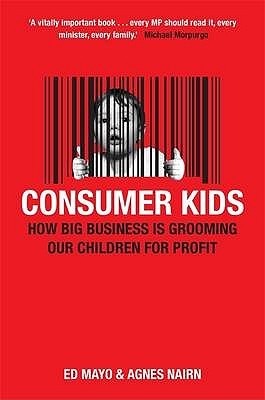
Consumer Kids: Mayo, Ed and Nairn, Agnes. 2009 Constable Press
This is an interesting 300+ page book, full of facts and details but this wealth of information is very simplistically presented, meaning the book has less impact than it could have. Consumer Kids deals largely with the threats posed by unregulated and at the time little understood advertising on the internet which is accessible to the new generation of consumer kids who have largely unlimited access. The book has a good understanding of the motives and methods of these advertisers with a firm foundation based upon (for example) Vance Packard's 1957 book The Hidden Persuaders but unfortunately this is not a text in the same league. The style is easy to read, but, despite the fact that it is only a decade old, it already reads as dated and largely irrelevant. The lessons we could learn from Myspace and Bebo may be transferable but no longer relevant and although Facebook and cookies are addressed, trackers now, in my experience, are less obvious but more invasive than pop up adverts.
What is true though is the fact that the commercial world dominates children’s time now more than ever - through the television and the internet, but to try and paint the people exploiting this as inherently evil is not correct - they are invariably simply opportunists and have the somewhat dubious everyday common sense logic that “if i dont do it someone else will”. It is of course ironic that in fighting against rabid consumerism we teach and instil others (invariably children) with a cynicism in its place. The message (manifested perhaps in part by this cynicism) is that it is all going to hell in a handbasket, but that only works on one level and the most simplistic - making it feel nothing more than an opportunistic parental scare manual - which will be read mainly by middle class parents receptive to its ideas, but already well informed about them.
None of the real implications or potential outcomes are fully explored - leaving the book feeling very relevant to 2009 but not applicable beyond then. The most obvious example here is the unhappiness or melancholia in teenagers is a concern. (p228). It is and should be. But, as The Simpson’s said of The Smashing Pumpkins ‘making teenagers depressed is like shooting fish in a barrel’. This book doesn't allow for the huge difference between mood swings and exploitation, although of course there is the potential for overlap. Perhaps the more sinister overarching implication is that deprived children are more likely to be exploited; the well-educated are exploiters (from or even at fee-paying schools) misses the point: Talking of the entrepreneur gene and collectors who sell for profit as inspiration is part of the problem of the capitalist system that the book appears to generally be condemning. Indeed, at points the book seems to be buying wholeheartedly into unquestioningly the capitalist agenda (p260) as a resignation that the genie is out of the bottle and consequently this is the only way. It need not be radical, but it could be more relevant.
These (major) gripes aside the book was interesting enough to keep me going and I at least wanted to finish it - but i was neither enthralled nor felt that anything was a revelation. Some of the observations perhaps needed making but were banal at best and the priority seemed more to err on the side of heavy scare tactics with little interrogation of the data or what it might mean for the future. The book does deal well with sexualisation of children, but never addresses directly the most damaging phenomenon of the internet for children. It is a shame that this needs to be acknowledged, but the most glaring omission from the book, and perhaps even the elephant in the room, was the all-pervading (then as now) destructive effect of pornography freely and widely available on the internet since its inception: Not just Playboy or Carry On film titillation but increasingly degrading, exploitative and sickening aspects appealing to our baser power hungry instincts and also due to its availability, crucially, catching children at a very young age. The effect of these increasingly warped attitudes and behaviours are not addressed and the subject only receives a cursory mention, the book seemingly too squeamish or middle class (and prudish) to address the problem head on.
All books are of their moment; history, social and even science books, but some have the ability to maintain a contemporary pertinence (Rachel Carson’s Silent Spring or Max Weber’s The Protestant Ethic and the Spirit of Capitalism). But this is a simple snapshot of the internet age and its exploitation of children. The book digs out cliches without the refinement needed to fully appreciate them - unlike Mark Fisher (Capitalist Realism) or John Gray (False Dawn). Protecting children is arguably more important than ever, but the goal posts have moved again and this is not a manual to help with the same goal - saving children from the ‘Child Catcher’.
This is an interesting 300+ page book, full of facts and details but this wealth of information is very simplistically presented, meaning the book has less impact than it could have. Consumer Kids deals largely with the threats posed by unregulated and at the time little understood advertising on the internet which is accessible to the new generation of consumer kids who have largely unlimited access. The book has a good understanding of the motives and methods of these advertisers with a firm foundation based upon (for example) Vance Packard's 1957 book The Hidden Persuaders but unfortunately this is not a text in the same league. The style is easy to read, but, despite the fact that it is only a decade old, it already reads as dated and largely irrelevant. The lessons we could learn from Myspace and Bebo may be transferable but no longer relevant and although Facebook and cookies are addressed, trackers now, in my experience, are less obvious but more invasive than pop up adverts.
What is true though is the fact that the commercial world dominates children’s time now more than ever - through the television and the internet, but to try and paint the people exploiting this as inherently evil is not correct - they are invariably simply opportunists and have the somewhat dubious everyday common sense logic that “if i dont do it someone else will”. It is of course ironic that in fighting against rabid consumerism we teach and instil others (invariably children) with a cynicism in its place. The message (manifested perhaps in part by this cynicism) is that it is all going to hell in a handbasket, but that only works on one level and the most simplistic - making it feel nothing more than an opportunistic parental scare manual - which will be read mainly by middle class parents receptive to its ideas, but already well informed about them.
None of the real implications or potential outcomes are fully explored - leaving the book feeling very relevant to 2009 but not applicable beyond then. The most obvious example here is the unhappiness or melancholia in teenagers is a concern. (p228). It is and should be. But, as The Simpson’s said of The Smashing Pumpkins ‘making teenagers depressed is like shooting fish in a barrel’. This book doesn't allow for the huge difference between mood swings and exploitation, although of course there is the potential for overlap. Perhaps the more sinister overarching implication is that deprived children are more likely to be exploited; the well-educated are exploiters (from or even at fee-paying schools) misses the point: Talking of the entrepreneur gene and collectors who sell for profit as inspiration is part of the problem of the capitalist system that the book appears to generally be condemning. Indeed, at points the book seems to be buying wholeheartedly into unquestioningly the capitalist agenda (p260) as a resignation that the genie is out of the bottle and consequently this is the only way. It need not be radical, but it could be more relevant.
These (major) gripes aside the book was interesting enough to keep me going and I at least wanted to finish it - but i was neither enthralled nor felt that anything was a revelation. Some of the observations perhaps needed making but were banal at best and the priority seemed more to err on the side of heavy scare tactics with little interrogation of the data or what it might mean for the future. The book does deal well with sexualisation of children, but never addresses directly the most damaging phenomenon of the internet for children. It is a shame that this needs to be acknowledged, but the most glaring omission from the book, and perhaps even the elephant in the room, was the all-pervading (then as now) destructive effect of pornography freely and widely available on the internet since its inception: Not just Playboy or Carry On film titillation but increasingly degrading, exploitative and sickening aspects appealing to our baser power hungry instincts and also due to its availability, crucially, catching children at a very young age. The effect of these increasingly warped attitudes and behaviours are not addressed and the subject only receives a cursory mention, the book seemingly too squeamish or middle class (and prudish) to address the problem head on.
All books are of their moment; history, social and even science books, but some have the ability to maintain a contemporary pertinence (Rachel Carson’s Silent Spring or Max Weber’s The Protestant Ethic and the Spirit of Capitalism). But this is a simple snapshot of the internet age and its exploitation of children. The book digs out cliches without the refinement needed to fully appreciate them - unlike Mark Fisher (Capitalist Realism) or John Gray (False Dawn). Protecting children is arguably more important than ever, but the goal posts have moved again and this is not a manual to help with the same goal - saving children from the ‘Child Catcher’.
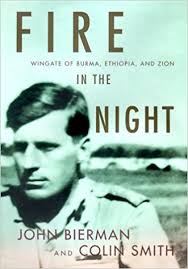
Fire in the Night: Wingate of Burma, Ethiopia and Zion. J Bierman and C Smith.
An enthralling read. Segmented together in bite size chapters this never feels staccato or short. A well structured and interesting read about one of many British military eccentrics. It is important to acknowledge both before reading this book, and more generally, that eccentricity need not be genius. But this is nonetheless an interesting read about a probable genius. Within popular culture (even more recently down to Elvis Presley or Punk music) the mainstream establishment either absorbs, and to a degree neuters, or absolutely rejects non-conformity. This book, about a non-conformist rebel, is a sympathetic biopic, (even overly so), but it paints a great and largely convincing picture of possible establishment motivations and actions for belittling and undermining the legacy of Orde Wingate. The rhetoric of being lucky doesn’t hold water either – it is amazing how the harder he worked and more experience he gained the luckier he got! Even if every step of the way he seemed to stand on someone’s toes. But Orde Wingate was a man who overall could be said to have ‘succeeded’, despite all those who wanted him to fail. It also brilliantly captures the nuanced dichotomy that was Wingate the soldier – selfish, myopic, devoted to his men, and always committed to ‘a’ cause and defined course. Exactly what that cause is / was, is at points often oblique – not just in the book but possibly within the man.
However, this book is weakened as well by a few simple errors. Not least that it is repetitive at points, some things to the point of ad nauseum. For example, Moshe Dayan doesn’t require a second introduction, whilst at beginning of Chapter 8 we are told for a second time that there were no major clashes and no major action during the period under discussion. Is that because of 2 authors or because it may have been collated from separate conference papers? Fortunately though as we get further into the book this duplication dies down and the book settles into a familiar pattern of Wingate infuriating and alienating senior officers whilst his men and a few key senior staff remained devoted to him. Overall a riveting and compelling read and worth seeking out.
An enthralling read. Segmented together in bite size chapters this never feels staccato or short. A well structured and interesting read about one of many British military eccentrics. It is important to acknowledge both before reading this book, and more generally, that eccentricity need not be genius. But this is nonetheless an interesting read about a probable genius. Within popular culture (even more recently down to Elvis Presley or Punk music) the mainstream establishment either absorbs, and to a degree neuters, or absolutely rejects non-conformity. This book, about a non-conformist rebel, is a sympathetic biopic, (even overly so), but it paints a great and largely convincing picture of possible establishment motivations and actions for belittling and undermining the legacy of Orde Wingate. The rhetoric of being lucky doesn’t hold water either – it is amazing how the harder he worked and more experience he gained the luckier he got! Even if every step of the way he seemed to stand on someone’s toes. But Orde Wingate was a man who overall could be said to have ‘succeeded’, despite all those who wanted him to fail. It also brilliantly captures the nuanced dichotomy that was Wingate the soldier – selfish, myopic, devoted to his men, and always committed to ‘a’ cause and defined course. Exactly what that cause is / was, is at points often oblique – not just in the book but possibly within the man.
However, this book is weakened as well by a few simple errors. Not least that it is repetitive at points, some things to the point of ad nauseum. For example, Moshe Dayan doesn’t require a second introduction, whilst at beginning of Chapter 8 we are told for a second time that there were no major clashes and no major action during the period under discussion. Is that because of 2 authors or because it may have been collated from separate conference papers? Fortunately though as we get further into the book this duplication dies down and the book settles into a familiar pattern of Wingate infuriating and alienating senior officers whilst his men and a few key senior staff remained devoted to him. Overall a riveting and compelling read and worth seeking out.
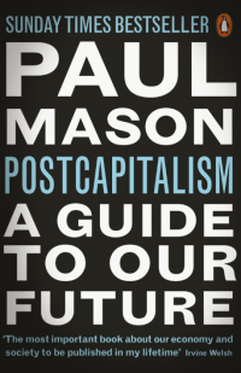
Paul Mason: Post Capitalism: A guide to our future.....
Reading this book in 2020 lockdown was certainly timely. The lockdown (or Covid 19/Corona virus more specifically) may prove a key catalyst in some of the changes towards a post capitalist world that Mason references. I do not think he is right with some things, but others seem reasonable to assume are correct and the complete upheaval of 2020 may add fuel to some of his speculation coming to fruition. Historically some of the key drivers of major transition, as Mason sees them, are the Black Death (1353), the advent of ‘Banking’ (c.1347 onwards - Medici, Fuggers), the discovery and exploitation of America (c.1503 onwards), and the advent of the Printing Press (1450 onwards). He asserts that the latter at least fuelled the rise of Protestantism, a scientific revolution and humanism more broadly. The equivalents of the mid 21st Century may prove to be COVID-19, the rapid growth of China and the Internet. Mason argues that the banking system is in tatters because of its role in the 2008 crisis: it is “an economic system in disequilibrium with its environment and insufficient to satisfy the needs of a rapidly changing humanity” (p. 262). But here Mason seems to forget the general public have short memories and are very easily contented with any status quo, however unsettled it may be, when compared to the unknown of change.
The “modern external shocks” of energy depletion, climate change, an aging population and migration have paved the way for a post capitalist future according to Mason (p. 243). Mason’s premise is that the information economy which has flourished since the advent of the internet will allow or facilitate a transition away from the current capitalist model to a more socialist and communal structure. It must be remembered that whilst Mason does not mean socialism in its political sense it is still a word that for some only has negative connotations and is only really synonymous with communism in the popular imagination of many Western states.
The author uses a complex array of sources - moving from Marx to Hoggart and Hilferding. He also discusses the cyclical movement of capitalism, arguing an ever recurring ever present theme of Kondratiev’s long-wave theory (which asserts that capitalism goes through generational cycles of stagnation and innovation) except that now - with the advent of the internet and the rapid dissemination of so much information (overlooking misinformation and fiction) we are stuck in a rut. Mason thinks in the near future he seems that "the economic problem that has defined human history will shrink or disappear" (p. 288-9). But, as much as I want to agree with him, the evidence again is scant and his speculation largely baseless. Yes capitalism is a false utopia like communism, but in the West it seems unlikely to decline any time soon (perhaps I am missing all the clues!). However Mason cites increased open source - and his favourite Wikipedia - made critical by a perfect storm created by the myriad of problems coming together now - imminent and drastic climate change, an ageing population in the Global North and a global debt crisis which is approaching. Mason claims (with limited evidence) that "IT expels labour from production" (p179). And that it will erode the link between labour and value..... Is he correct? It would seem that the job market would decline if this was the case - but this generally seems buoyant with jobs that seem ‘necessary’ within the capitalist model. This problem is not addressed head on.
The book has a lot of fascinating moments, and some great snippets. Indeed overall it fits together well and some sentiments are hard to disagree with p282 "The most immediate objective is to save globalization by killing neoliberalism" BUT there are weaknesses. And certain assumptions I don’t agree with. He near completely overlooks that information is a product that costs energy, takes up room, consumes electricity, and needs to be stored (acknowledged p165 but its geography and location are not addressed). Frustratingly as well at points it reads like a deliberately divisive polemic, "treat people kissing each other " as criminal (p175) is deliberately extreme - but in the Covid age is actually looking believable! To that end it also makes sweeping huge leaps about history that may well be correct - perhaps crushing British miners had to be done to get Facebook but are the two actually related? (I suspect yes but he needs to clarify this correlation more). These minor criticisms aside given its detailed and dense content it is an easy read - but as a reader to research much of what he says further would require deep analysis and investigation.
The Telegraph (right wing reactionary UK newspaper) called this book deeply misguided, The Guardian (Telegraphs nemesis - left wing idealist newspaper) called it a worthy successor to Marx. Unfortunately, as with all these things, when taking two extreme views of an equally polemic text, the reality is somewhere in between. This is a laudable and interesting read, at points complicated and dense, but always thought provoking. Although it is confusing and a lot to take in, it still manages for the most part to be a fluid and easy read. But it also at points seems naive or too simplistic and despite the plethora of examples needs more at points and less at others - sometimes the examples don’t ring true. Mason seems to think the GLOBAL working and middle class (99%) are going to somehow morph into networked humanity - despite the fact that perhaps 50% of the global population doesn’t even have internet access. Some very obscure 'facts' such as only 8% of CEOs have a personal Twitter account (my first thought was so what?), overlooks how many of the 8 billion people are not connected to this myriad of information or educated to take advantage of it in order to differentiate fact from propaganda. There really is much to recommend this book, especially when analysing the here and now (he is considered when discussing the failings of the current system:) but poorer on the emphasis of history and his speculation on the future 200 years show that most are preoccupied with living through or despite capitalism rather than overthrowing it (p180 but my emphasis) Is that because we know whilst it is bad it is the least bad of all forms of exchange? OR could we actually come out the other end with something new and ultimately better for all?
Reading this book in 2020 lockdown was certainly timely. The lockdown (or Covid 19/Corona virus more specifically) may prove a key catalyst in some of the changes towards a post capitalist world that Mason references. I do not think he is right with some things, but others seem reasonable to assume are correct and the complete upheaval of 2020 may add fuel to some of his speculation coming to fruition. Historically some of the key drivers of major transition, as Mason sees them, are the Black Death (1353), the advent of ‘Banking’ (c.1347 onwards - Medici, Fuggers), the discovery and exploitation of America (c.1503 onwards), and the advent of the Printing Press (1450 onwards). He asserts that the latter at least fuelled the rise of Protestantism, a scientific revolution and humanism more broadly. The equivalents of the mid 21st Century may prove to be COVID-19, the rapid growth of China and the Internet. Mason argues that the banking system is in tatters because of its role in the 2008 crisis: it is “an economic system in disequilibrium with its environment and insufficient to satisfy the needs of a rapidly changing humanity” (p. 262). But here Mason seems to forget the general public have short memories and are very easily contented with any status quo, however unsettled it may be, when compared to the unknown of change.
The “modern external shocks” of energy depletion, climate change, an aging population and migration have paved the way for a post capitalist future according to Mason (p. 243). Mason’s premise is that the information economy which has flourished since the advent of the internet will allow or facilitate a transition away from the current capitalist model to a more socialist and communal structure. It must be remembered that whilst Mason does not mean socialism in its political sense it is still a word that for some only has negative connotations and is only really synonymous with communism in the popular imagination of many Western states.
The author uses a complex array of sources - moving from Marx to Hoggart and Hilferding. He also discusses the cyclical movement of capitalism, arguing an ever recurring ever present theme of Kondratiev’s long-wave theory (which asserts that capitalism goes through generational cycles of stagnation and innovation) except that now - with the advent of the internet and the rapid dissemination of so much information (overlooking misinformation and fiction) we are stuck in a rut. Mason thinks in the near future he seems that "the economic problem that has defined human history will shrink or disappear" (p. 288-9). But, as much as I want to agree with him, the evidence again is scant and his speculation largely baseless. Yes capitalism is a false utopia like communism, but in the West it seems unlikely to decline any time soon (perhaps I am missing all the clues!). However Mason cites increased open source - and his favourite Wikipedia - made critical by a perfect storm created by the myriad of problems coming together now - imminent and drastic climate change, an ageing population in the Global North and a global debt crisis which is approaching. Mason claims (with limited evidence) that "IT expels labour from production" (p179). And that it will erode the link between labour and value..... Is he correct? It would seem that the job market would decline if this was the case - but this generally seems buoyant with jobs that seem ‘necessary’ within the capitalist model. This problem is not addressed head on.
The book has a lot of fascinating moments, and some great snippets. Indeed overall it fits together well and some sentiments are hard to disagree with p282 "The most immediate objective is to save globalization by killing neoliberalism" BUT there are weaknesses. And certain assumptions I don’t agree with. He near completely overlooks that information is a product that costs energy, takes up room, consumes electricity, and needs to be stored (acknowledged p165 but its geography and location are not addressed). Frustratingly as well at points it reads like a deliberately divisive polemic, "treat people kissing each other " as criminal (p175) is deliberately extreme - but in the Covid age is actually looking believable! To that end it also makes sweeping huge leaps about history that may well be correct - perhaps crushing British miners had to be done to get Facebook but are the two actually related? (I suspect yes but he needs to clarify this correlation more). These minor criticisms aside given its detailed and dense content it is an easy read - but as a reader to research much of what he says further would require deep analysis and investigation.
The Telegraph (right wing reactionary UK newspaper) called this book deeply misguided, The Guardian (Telegraphs nemesis - left wing idealist newspaper) called it a worthy successor to Marx. Unfortunately, as with all these things, when taking two extreme views of an equally polemic text, the reality is somewhere in between. This is a laudable and interesting read, at points complicated and dense, but always thought provoking. Although it is confusing and a lot to take in, it still manages for the most part to be a fluid and easy read. But it also at points seems naive or too simplistic and despite the plethora of examples needs more at points and less at others - sometimes the examples don’t ring true. Mason seems to think the GLOBAL working and middle class (99%) are going to somehow morph into networked humanity - despite the fact that perhaps 50% of the global population doesn’t even have internet access. Some very obscure 'facts' such as only 8% of CEOs have a personal Twitter account (my first thought was so what?), overlooks how many of the 8 billion people are not connected to this myriad of information or educated to take advantage of it in order to differentiate fact from propaganda. There really is much to recommend this book, especially when analysing the here and now (he is considered when discussing the failings of the current system:) but poorer on the emphasis of history and his speculation on the future 200 years show that most are preoccupied with living through or despite capitalism rather than overthrowing it (p180 but my emphasis) Is that because we know whilst it is bad it is the least bad of all forms of exchange? OR could we actually come out the other end with something new and ultimately better for all?
|
How Much is Enough? Money and the Good life. Robert and Edward Skidelsky.
There is a growing understanding, possibly even consensus, that we need change. In the West the right wing chooses Making America Great Again, whilst the UK chose Building Back Better. But neither is compelling - merely the same hollow rhetoric of self-interest. This book picks up on that theme (years before either of those phrases were coined) and offers its own comments and suggestions. To that end it is interesting, flowing, but not as sharp or as compelling as other similar texts. It is less a wakeup call and more a common-sense mantra calling on UK by way of example to for example focus less on GDP and more on some kind of happiness and wellbeing scale..... A political economist and a philosopher -, and father and son team, join together to bring us a simplistic look at the possibilities of a better, more contented life going forward. It is commented, in the preface to the paperback, that the book was reviewed down political left and right divide - favourably by the left less so by the right. This is predictable, as they acknowledge. The book itself doesnt really offer anything fresh or new, but is a useful read albeit largely preaching to the converted. Discussing 'Keynes's mistake', they rightly reference the explosion of astronomical 'wealth' confined to a small % of the population at the expense of the planets resources. It is a slow book with little options to offer or suggest real change. It has some useful graphs and deals well with the pressure to consume that is often created by the capitalist system and further flamed by advertising, which perpetuates that demand, invariably at the expense of finite material items on the planet. We shrug and live despite capitalism, knowingly bemoaning how it is the best of a bad set of options. This dynamic is not really given full coverage as much as it perhaps merits. Overall more of an inoffensive read that a mantra or tome. Good, well-written it takes often complex information and presents it is a clear manner. Most readers are presumably receptive so it will not break any boundaries but the text might benefit from giving the reader a little more vision. |
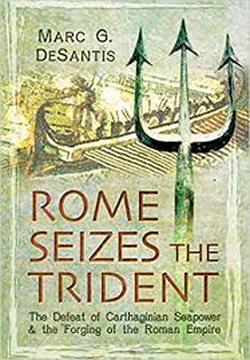
.Rome Seizes the Trident: The Defeat of Carthaginian Seapower and the Forging of the Roman Empire Book by Marc G. DeSantis
Rome’s naval power, through the various stages and ages of her empire, has always been a subject of debate. Did she even have a standing navy or was it simply that when she needed one she duly built it and then just let it fall into disrepair after the specific obstacle in question had been overcome? Without a specific requirement she seems to have left the sea to her allies (Rhodes amongst others) ensuring at the same time none got too big for their boots. One of the key defining moments of this came with her clashes with Carthage 3rd to 2nd Centuries BC. This book covers all of that period - but on a very superficial level. If you are looking for an overview of events and naval battles during the Empire’s formative years then this is right book. But Rome Seizes The Trident, somewhat simplistically, concentrates on the maritime aspects of what may have been a terrestrial problem as well, for example the problem of finding sailors from farmers and soldiers. But not least in confining itself to the sea this book is also largely unimaginative and therefore offers nothing revelatory or novel. However, that criticism aside, it is a very good introduction to the subject - being written in a pleasant and engaging manner.
Rome’s naval power, through the various stages and ages of her empire, has always been a subject of debate. Did she even have a standing navy or was it simply that when she needed one she duly built it and then just let it fall into disrepair after the specific obstacle in question had been overcome? Without a specific requirement she seems to have left the sea to her allies (Rhodes amongst others) ensuring at the same time none got too big for their boots. One of the key defining moments of this came with her clashes with Carthage 3rd to 2nd Centuries BC. This book covers all of that period - but on a very superficial level. If you are looking for an overview of events and naval battles during the Empire’s formative years then this is right book. But Rome Seizes The Trident, somewhat simplistically, concentrates on the maritime aspects of what may have been a terrestrial problem as well, for example the problem of finding sailors from farmers and soldiers. But not least in confining itself to the sea this book is also largely unimaginative and therefore offers nothing revelatory or novel. However, that criticism aside, it is a very good introduction to the subject - being written in a pleasant and engaging manner.
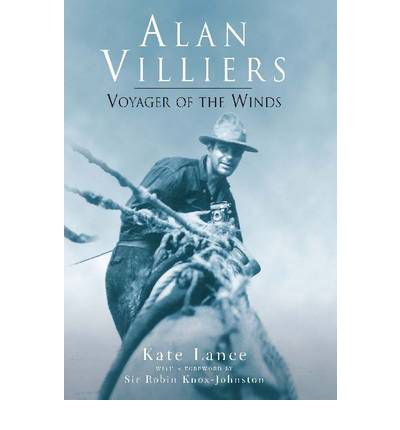
Alan Villiers: Voyager of the Winds. By Kate Lance
Alan Villiers was an Australian sailor, later social anthropologist and social commentator who wrote popular books about the dying ‘Age Of Sail’. Born in 1903 in Melbourne he sailed to England and maintained itchy wet feet until just before his death in 1982. As a result this thorough biography darts across many continents but never feels rushed or shallow. Though one major flaw is it does not offer even handed treatment -for example the lack of detail on his time on Arab dhows feels thin and could have been a lot longer. (Even if he himself had covered it in great detail in his own Sons Of Sinbad).
Overall from these pages (and my own reading more generally) it is clear that Villiers was a passionate sailor and strong personality but he also comes across as quite amiable in this well-researched text. The weaknesses and omissions I suspect stem from a lack of impartial source material. A possible criticism also is that of the remaining source materials it is clear Lance is over reliant on Villiers own diaries, as opposed to the limited critical narratives that were written. This is compounded by the amount of repetition and positive speculation where a critical eye might have drawn other conclusions.
As well as a lack of detail on his Arab sailing exploits along the Rufiji delta there is little more generally on his time in Arabia and Egypt and little on his military service - both of which would benefit from more analysis and detail.
These minor omissions aside however overall, despite being a very sympathetic biographer, Lance manages to capture an interesting and relatively thorough assessment of the man Alan Villiers, his life and times.
Alan Villiers was an Australian sailor, later social anthropologist and social commentator who wrote popular books about the dying ‘Age Of Sail’. Born in 1903 in Melbourne he sailed to England and maintained itchy wet feet until just before his death in 1982. As a result this thorough biography darts across many continents but never feels rushed or shallow. Though one major flaw is it does not offer even handed treatment -for example the lack of detail on his time on Arab dhows feels thin and could have been a lot longer. (Even if he himself had covered it in great detail in his own Sons Of Sinbad).
Overall from these pages (and my own reading more generally) it is clear that Villiers was a passionate sailor and strong personality but he also comes across as quite amiable in this well-researched text. The weaknesses and omissions I suspect stem from a lack of impartial source material. A possible criticism also is that of the remaining source materials it is clear Lance is over reliant on Villiers own diaries, as opposed to the limited critical narratives that were written. This is compounded by the amount of repetition and positive speculation where a critical eye might have drawn other conclusions.
As well as a lack of detail on his Arab sailing exploits along the Rufiji delta there is little more generally on his time in Arabia and Egypt and little on his military service - both of which would benefit from more analysis and detail.
These minor omissions aside however overall, despite being a very sympathetic biographer, Lance manages to capture an interesting and relatively thorough assessment of the man Alan Villiers, his life and times.
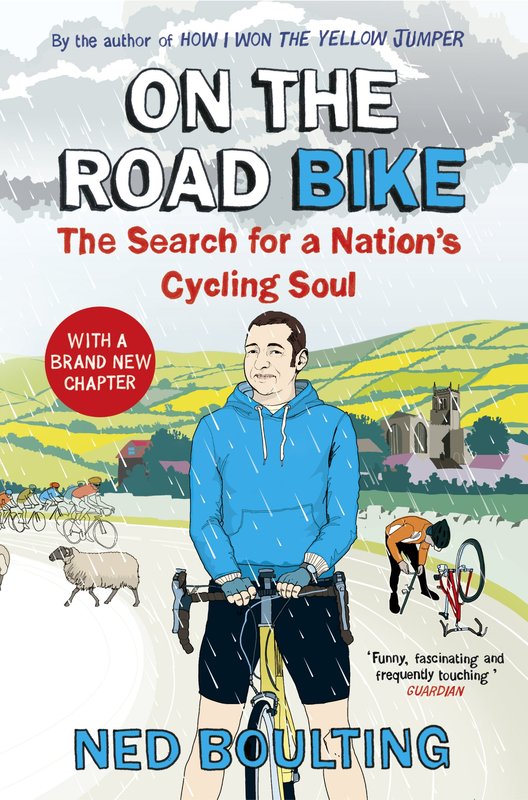
On the Road Bike by Ned Boulting
Ned Boulting is currently the go to man for light hearted commentary (more than deep analysis) in UK cycling, perhaps most famously, for the last 15 years on the Tour De France. He has also had some success within the cycling fraternity with his book ‘How I won the Yellow Jersey’. This book, a follow up of sorts, is a light hearted assessment of cycling in Britain, although not a complete homage to the 'English' or ‘British’ way and style, it does encompass and reiterate much of the quaint ‘Middle England’, his target audience. Yet at points it is a damning critique on how Britain, ultimately, has no cycling soul - just a few yearning individuals (who are often bitter and overlooked in the history of cycling more generally) and a general public who have, in the last c.5-10 years, been caught on the crest of a wave. A wave that could, and probably will, decline just as easily and quickly once messers Wiggins and Froome move slowly out of the picture. British Cycling may then retreat back to the few trusted stalwarts who kept it alive in the past. In turn every MAMIL (Middle-Aged-Man-In-Lycra) will retreat or find another expensive fad to be subsumed by.
This book is a funny and very leisurely read - easy to pop in and out of chapters covering various topics from cycling’s history, including Britons fleeing to Europe for recognition and success. Funny, witty and touching it deals with relatively obscure characters of British cycling in the past 50 years. But because of its subject matter and the context of recent British success only the book feels hollow and falling between two stools - cycling fanatics and the recent fair-weather fans. It is however aimed specifically at those more recent converts so may fulfil their desire for a light overview of the background and trendy names within this very elitist sport. These include Tommy Godwin (x2), Chris Boardman, Ron Keeble, David Millar's mum (Avril), Maurice Burton and many more little known people ‘in the biz’. Worth a read but unless you are an avid cycling fan possibly not a priority.
Ned Boulting is currently the go to man for light hearted commentary (more than deep analysis) in UK cycling, perhaps most famously, for the last 15 years on the Tour De France. He has also had some success within the cycling fraternity with his book ‘How I won the Yellow Jersey’. This book, a follow up of sorts, is a light hearted assessment of cycling in Britain, although not a complete homage to the 'English' or ‘British’ way and style, it does encompass and reiterate much of the quaint ‘Middle England’, his target audience. Yet at points it is a damning critique on how Britain, ultimately, has no cycling soul - just a few yearning individuals (who are often bitter and overlooked in the history of cycling more generally) and a general public who have, in the last c.5-10 years, been caught on the crest of a wave. A wave that could, and probably will, decline just as easily and quickly once messers Wiggins and Froome move slowly out of the picture. British Cycling may then retreat back to the few trusted stalwarts who kept it alive in the past. In turn every MAMIL (Middle-Aged-Man-In-Lycra) will retreat or find another expensive fad to be subsumed by.
This book is a funny and very leisurely read - easy to pop in and out of chapters covering various topics from cycling’s history, including Britons fleeing to Europe for recognition and success. Funny, witty and touching it deals with relatively obscure characters of British cycling in the past 50 years. But because of its subject matter and the context of recent British success only the book feels hollow and falling between two stools - cycling fanatics and the recent fair-weather fans. It is however aimed specifically at those more recent converts so may fulfil their desire for a light overview of the background and trendy names within this very elitist sport. These include Tommy Godwin (x2), Chris Boardman, Ron Keeble, David Millar's mum (Avril), Maurice Burton and many more little known people ‘in the biz’. Worth a read but unless you are an avid cycling fan possibly not a priority.

Black Athena: The Afroasiatic Roots of Classical Civilization (three volumes 1987, 1991 & 2006) by Martin Bernal.
This was a controversial text upon its initial release (1987) - but a lot of the potential controversy was tempered by the fact that it was released in 3 parts over 20 years. The premise is that Western culture and western classics has over the last 3 centuries written out much of the North African influence on what is now seen as the exclusively Greek pantheon of values including the Gods, literature, invention and the arts. Personally, I was not won over by the linguistic leaps in some places but cumulatively Bernal make a compelling case in sheer weight of volume for the underplayed influence of Egyptian culture on our Greek inheritance. 'Our' in this instance being the Western canon. Many of Bernal’s theories and assertions have since been debunked, especially linguistic ones, a lot still have more merit than the classical academic establishment are willing to accept. Ultimately Bernal's thesis need not be 100% true or accurate - but it does inject some much-needed perspective on the role and influence of North Africa on Greek ideas and their formulation. The main blessing here is that the text directly addresses the overemphasis given to Greece alone as some exceptional ('white') culture who due to some kind of exceptionalism began what we now perceive as human progress - rather than, as is more likely, this site was merely a melting pot which came together from other areas and made the literary leap which gave her legacy more permanence. One could reasonably observe how the study of Ancient Greece especially in Protestant countries has created an alliance between Greece and Protestant Christianity which tended to exclude other influences. There is no getting away from the fact that the most widely read history in general has for the most recent centuries been written by white Anglo Saxon heritage.
I found this a fascinating read.... sometimes fast and loose with things I had to date taken as gospel. The fact that we lack direct evidence in the form of archaeological presence of North Africans in Greece need not negate the accuracy or critically the spread of ideas. Bernal sees the writers of history as falling into two stark camps - the ancient and the Aryan. The second in recent centuries have been guilty through misguided assumption rather than wilful omission of literally white washing history. Especially the nineteenth-century discourse on race and origins which was prejudicial against non-European. (The arguments echo nicely the contemporary success of Ancient Alien's and the oblique racist implication within that, that ancient non-white cultures would not have been able to co-ordinate the successes we find without external factors.) Bernal sets it up as a history that has been hijacked.
It is an interesting premise which may remain that way as evidence for conclusive answers might be lost to the annals of history. Proving it in either direction, if indeed necessary, may never happen because the evidence just simply is not there anymore, washed away or ignored in for example previous archaeological digs. Bernal does though use the surviving texts to good use – Herodotus’ language and his comments do imply a deeper debt to other areas than modern history allows. Bernal’s ideas are of course given added gravitas by the 20th century's flirting with extreme Aryan ideas in the form of Eugenics and Nazism. This is a laudable effort to make us question and probably rethink the history narrative we tell people - but over 3,000 pages long it is a heavy investment of time with limited returns due to speculation at points and ultimately the lack of hard evidence upon which to pin these convincing theories.
This was a controversial text upon its initial release (1987) - but a lot of the potential controversy was tempered by the fact that it was released in 3 parts over 20 years. The premise is that Western culture and western classics has over the last 3 centuries written out much of the North African influence on what is now seen as the exclusively Greek pantheon of values including the Gods, literature, invention and the arts. Personally, I was not won over by the linguistic leaps in some places but cumulatively Bernal make a compelling case in sheer weight of volume for the underplayed influence of Egyptian culture on our Greek inheritance. 'Our' in this instance being the Western canon. Many of Bernal’s theories and assertions have since been debunked, especially linguistic ones, a lot still have more merit than the classical academic establishment are willing to accept. Ultimately Bernal's thesis need not be 100% true or accurate - but it does inject some much-needed perspective on the role and influence of North Africa on Greek ideas and their formulation. The main blessing here is that the text directly addresses the overemphasis given to Greece alone as some exceptional ('white') culture who due to some kind of exceptionalism began what we now perceive as human progress - rather than, as is more likely, this site was merely a melting pot which came together from other areas and made the literary leap which gave her legacy more permanence. One could reasonably observe how the study of Ancient Greece especially in Protestant countries has created an alliance between Greece and Protestant Christianity which tended to exclude other influences. There is no getting away from the fact that the most widely read history in general has for the most recent centuries been written by white Anglo Saxon heritage.
I found this a fascinating read.... sometimes fast and loose with things I had to date taken as gospel. The fact that we lack direct evidence in the form of archaeological presence of North Africans in Greece need not negate the accuracy or critically the spread of ideas. Bernal sees the writers of history as falling into two stark camps - the ancient and the Aryan. The second in recent centuries have been guilty through misguided assumption rather than wilful omission of literally white washing history. Especially the nineteenth-century discourse on race and origins which was prejudicial against non-European. (The arguments echo nicely the contemporary success of Ancient Alien's and the oblique racist implication within that, that ancient non-white cultures would not have been able to co-ordinate the successes we find without external factors.) Bernal sets it up as a history that has been hijacked.
It is an interesting premise which may remain that way as evidence for conclusive answers might be lost to the annals of history. Proving it in either direction, if indeed necessary, may never happen because the evidence just simply is not there anymore, washed away or ignored in for example previous archaeological digs. Bernal does though use the surviving texts to good use – Herodotus’ language and his comments do imply a deeper debt to other areas than modern history allows. Bernal’s ideas are of course given added gravitas by the 20th century's flirting with extreme Aryan ideas in the form of Eugenics and Nazism. This is a laudable effort to make us question and probably rethink the history narrative we tell people - but over 3,000 pages long it is a heavy investment of time with limited returns due to speculation at points and ultimately the lack of hard evidence upon which to pin these convincing theories.
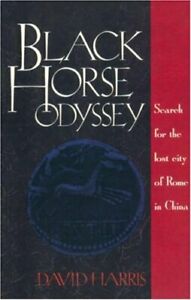
Black Horse Odyssey: Search for the Lost City of Rome in China. David Harris
The subtitle of this book is a clue to the main structure, upon which hangs, this floral retelling of David Harris’s quest to gain access and digging rights to an abandoned town with possible Roman roots. The entire premise is far-fetched, as the writer acknowledges, but the real weakness of this book is the lack of evidence proffered in support of the romantic notion that a rabble of Roman soldiers from the 1st Century were shipped across the whole Parthian Empire as prisoners (presumably against their will) and establishing a town in what is modern day China. The etymology of the towns name (‘Li-Jen’) supports the possible link, as does the ancient walls that are preserved. However its style is novelistic and autobiographical about a very real abandoned city with mythical possibilities.
Perhaps I expected a more scientific analysis of the limited evidence, instead I got a fond and tender story of Harris’s own journey from Australia to China, a marriage in the Chinese tradition and a lifetime of unrealised potential. As Harris himself says he discovered his identity “unmasked in strange places”(p70). Perhaps that really is a life well lived, but it adds very little valuable data about the lost city. As in many archaeological and historical hunts many potential or whispered strands, like the whispered existence of a Roman standard, are mentioned but come to nothing. But this is a journey of discovery – a snapshot of a potentially interesting diary. But not a well-researched, meticulous search for evidence to support the notion of the relevance of the city. An impassioned journey of discovery.
That aside to read this as a loosely fact based and limited analysed story this is a pleasant text. Largely irrelevant detours (like a backpacker's harrowing experiences in Peru) add nothing except curious tangents on and perspectives on the limited suffering of Harris with his own ultimately unsuccessful journey. Written with a lot of flourish and floral language this is a journey of discovery not an archaeology text book. There are though some fascinating cross-cultural moments. This is after all more a book about cultures and the clashes that this sometimes prompts. Again Harris recounts “I remember Toyndee said that at the meeting of civilisations there is recoil, adaptation, then synthesis”(p95). With this in mind the text is an interesting and rewarding read. As a man on the ground in the far-flung regions during the Tiananmen Square incident and as a Western insight into China in the late 1980’s this is fascinating and the main reason I preserved with reading to the end. But also a prescient awareness of how Western music is slipping into the culture in a drip drip manner – perhaps diluting the culture a droplet at a time. The power of music in contrast to the hollow role of history. That was the reward of this text. Approach with an open mind and a keenness to see beyond the purported ambition.
I sought something different, but in the end found something novel.
The subtitle of this book is a clue to the main structure, upon which hangs, this floral retelling of David Harris’s quest to gain access and digging rights to an abandoned town with possible Roman roots. The entire premise is far-fetched, as the writer acknowledges, but the real weakness of this book is the lack of evidence proffered in support of the romantic notion that a rabble of Roman soldiers from the 1st Century were shipped across the whole Parthian Empire as prisoners (presumably against their will) and establishing a town in what is modern day China. The etymology of the towns name (‘Li-Jen’) supports the possible link, as does the ancient walls that are preserved. However its style is novelistic and autobiographical about a very real abandoned city with mythical possibilities.
Perhaps I expected a more scientific analysis of the limited evidence, instead I got a fond and tender story of Harris’s own journey from Australia to China, a marriage in the Chinese tradition and a lifetime of unrealised potential. As Harris himself says he discovered his identity “unmasked in strange places”(p70). Perhaps that really is a life well lived, but it adds very little valuable data about the lost city. As in many archaeological and historical hunts many potential or whispered strands, like the whispered existence of a Roman standard, are mentioned but come to nothing. But this is a journey of discovery – a snapshot of a potentially interesting diary. But not a well-researched, meticulous search for evidence to support the notion of the relevance of the city. An impassioned journey of discovery.
That aside to read this as a loosely fact based and limited analysed story this is a pleasant text. Largely irrelevant detours (like a backpacker's harrowing experiences in Peru) add nothing except curious tangents on and perspectives on the limited suffering of Harris with his own ultimately unsuccessful journey. Written with a lot of flourish and floral language this is a journey of discovery not an archaeology text book. There are though some fascinating cross-cultural moments. This is after all more a book about cultures and the clashes that this sometimes prompts. Again Harris recounts “I remember Toyndee said that at the meeting of civilisations there is recoil, adaptation, then synthesis”(p95). With this in mind the text is an interesting and rewarding read. As a man on the ground in the far-flung regions during the Tiananmen Square incident and as a Western insight into China in the late 1980’s this is fascinating and the main reason I preserved with reading to the end. But also a prescient awareness of how Western music is slipping into the culture in a drip drip manner – perhaps diluting the culture a droplet at a time. The power of music in contrast to the hollow role of history. That was the reward of this text. Approach with an open mind and a keenness to see beyond the purported ambition.
I sought something different, but in the end found something novel.
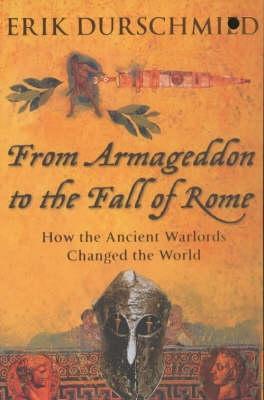
From Armageddon to the Fall of Rome, by Erik Durschmied Coronet Books, 2003
This book covers a selection of specific events and political leaders, or warlords, as Durschmied chooses to categorize these successful commanders. All are ancient military leaders. But he does not interrogate the leader's roles and personalities. Focusing on battles this book is ultimately a simple, possibly even lazy, history of about 10 keys battles and very conservative narratives around these conflicts. It is a good history of these events (the battles) and even some of the context leading up to them - but adds little to the narratives beyond traditional story - supplied by ancient authors like Polybius and Diodorus Siculus or even in many cases the far later Plutarch. None of the facts presented here about any general are particularly new or a non-traditional reading of the limited sources. Frustratingly the author also makes a few factual errors - for example he seems to imply Plato (who died roughly the same date as Alexander was born), was Alexander the Great’s tutor, where popular convention claims it was actually the equally famous philosopher Aristotle. The third of the tripartite of these greats was Socrates, Plato being the predecessors to both. Minor errors aside though - I am confused about this book. On the one hand it is a relatively unadventurous, uncontroversial overview of the key battles of a few ancient military leaders, of varying ability politically and diplomatically. On the other the subtitle purports to offer analysis on how these leaders had direct influence on history or 'changed the world'. This is just non-existent. Anyone who has read about any of these military tacticians will learn nothing new. There is no denying it is a great basic text for those with no knowledge of ancient history, as this is compact and covers all the essentials of some important ancient military leaders from traditional classical history (From the Bible through to the fall of Rome). But we learn very little of his opinion on the intentions or even personality of the various leaders - merely they were strategic military masterminds - even genius's - though Durschmied is not keen to apply this categorisation. From a historical point of view as well Durschmied’s text is a cross between modern attempts at 'History' and ancient ‘interpretive' narratives - of Plutarch and Polybius who, as our understanding of history evolved, used their own judgement and implied thoughts oblivious and what appears to them to be logical rationale on their subjects - often they had no way of knowing this - for example the mindset or logic that motivated Gaulish leader Vercingetorix. Durschmied presents them as facts rather than assumptions by ancient authors. This is a dangerous and misleading move. On top of this Durschmied misses that it is seldom winning the war but consolidating the peace that makes warlords move from tyrannical great military leaders to epoch shaping statesmen. Caesar or Augustus being most obvious examples..... Alexander did not live long enough before 4 fractious leaders fragmented into areas we now know across Eastern Europe and Asia. It is only really when dealing with the demise of Julius Caesar that he addresses how the potential Warlords changed the world. Overall a pleasant read but not a good interrogation of events or their consequences.
This book covers a selection of specific events and political leaders, or warlords, as Durschmied chooses to categorize these successful commanders. All are ancient military leaders. But he does not interrogate the leader's roles and personalities. Focusing on battles this book is ultimately a simple, possibly even lazy, history of about 10 keys battles and very conservative narratives around these conflicts. It is a good history of these events (the battles) and even some of the context leading up to them - but adds little to the narratives beyond traditional story - supplied by ancient authors like Polybius and Diodorus Siculus or even in many cases the far later Plutarch. None of the facts presented here about any general are particularly new or a non-traditional reading of the limited sources. Frustratingly the author also makes a few factual errors - for example he seems to imply Plato (who died roughly the same date as Alexander was born), was Alexander the Great’s tutor, where popular convention claims it was actually the equally famous philosopher Aristotle. The third of the tripartite of these greats was Socrates, Plato being the predecessors to both. Minor errors aside though - I am confused about this book. On the one hand it is a relatively unadventurous, uncontroversial overview of the key battles of a few ancient military leaders, of varying ability politically and diplomatically. On the other the subtitle purports to offer analysis on how these leaders had direct influence on history or 'changed the world'. This is just non-existent. Anyone who has read about any of these military tacticians will learn nothing new. There is no denying it is a great basic text for those with no knowledge of ancient history, as this is compact and covers all the essentials of some important ancient military leaders from traditional classical history (From the Bible through to the fall of Rome). But we learn very little of his opinion on the intentions or even personality of the various leaders - merely they were strategic military masterminds - even genius's - though Durschmied is not keen to apply this categorisation. From a historical point of view as well Durschmied’s text is a cross between modern attempts at 'History' and ancient ‘interpretive' narratives - of Plutarch and Polybius who, as our understanding of history evolved, used their own judgement and implied thoughts oblivious and what appears to them to be logical rationale on their subjects - often they had no way of knowing this - for example the mindset or logic that motivated Gaulish leader Vercingetorix. Durschmied presents them as facts rather than assumptions by ancient authors. This is a dangerous and misleading move. On top of this Durschmied misses that it is seldom winning the war but consolidating the peace that makes warlords move from tyrannical great military leaders to epoch shaping statesmen. Caesar or Augustus being most obvious examples..... Alexander did not live long enough before 4 fractious leaders fragmented into areas we now know across Eastern Europe and Asia. It is only really when dealing with the demise of Julius Caesar that he addresses how the potential Warlords changed the world. Overall a pleasant read but not a good interrogation of events or their consequences.
Malta – The Last Great Siege. David Wragg's book on it - a little underwhelming
|
Malta – the last great siege 1940 – 1943. David Wragg
From the very outset of the second major 20th Century European conflict it was clear that the islands across the Mediterranean, with the possible exception of Cyprus, were to play a crucial role in strategic leapfrogging both for British and Allied forces ‘back’ into mainland Europe, as well as a crucial lynch pin for Rommel’s supply lines to North Africa. Taking some of the islands for Germany and Italy had proved to be expensive in the first place. The price paid by German special forces in taking Crete shows both an underestimation of the task and the Axis recognition of the strategic importance. However, conversely the morale boost for locals and Allied propaganda cannot be under played either. With this in mind the blockade that Malta was subject to for much of World War II cannot be over emphasised. As such, the siege that Malta experienced throughout much of World War Two is of pivotal and strategic as well as of personal importance. With this in mind I was looking forward to reading this text. And there is no denying this is a thoroughly researched publication, it is just a shame that it is so badly executed. The monograph reads more like a collection of quickly collated essays (with excessive repetition and recycling) than a well put together publication as a whole. What could have been a potentially fascinating glimpse at Malta when she was enduring some of the worst privations across Europe for centuries, instead becomes a confused collection of events and isolated personal reminiscences. The author Wragg even sometimes repeating the same facts in the same paragraph, as well as other points in later chapters with little reference or context. However it does include the key facts and components. Although it was only published in 2003 I don’t think it would be unfair to expect more first hand interviews included, instead relying on IWN archive interviews. Another slight disappointment on this level is the amount of coverage given is often Anglo centric with more emphasis on the Maltese perhaps being of benefit. That said there is some great research and information here – but just at points poorly presented. That said overall worth a read for those who want to know more about the island during this period. |
|
|
|
Eye of the Storm. Just a few observations really.
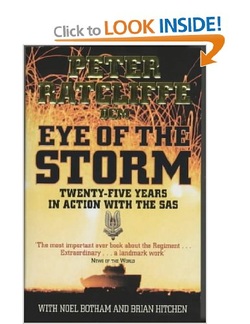
Just a few observations on this book really -
Peter Radcliffe DCM
Eye of The Storm
Whilst it is hard to differentiate and often side with the 'best ever' of the books about SAS - each offers new dynamic - this book is definitely a contender for one of the best in its scope, though perhaps less so on the execution. Radcliffe is not afraid to offer his comments on his perception of incompetences and failings in various members of the regiment. His book also highlights the obvious contradictions and exagerrations depicted in other books. I for one am of the opinion that there is truth in the middle ground. I am sure that Andy McNabb didnt tab 20km and that it was nearer 2km, but i am also sure that he and his troop had their reasons for choosing not to take vehicles in to their Bravo Two Zero operation - rather than solely stubborness.It also does brillianty in offering a picture of the personality clashes and egos at play in such a testosterone driven environment.
The writing style is perhaps more literary than many of his peers - with less of the slang and over the top Boy's Own-type adventure narrative that others have - though this may be due to long service and the seniority of his rank as an NCO and later officer. Or possibly because he has the assistance of 2 co authors! Though conversly the constant repetition in this is a bit frustrating - is that the fault of 2 co authors? Though ultimately what is said appears to to be sincere and considered.
As a commanding officer he does offer an interesting perspective on hierachy and also comments on not standing in the way of Bravo Two Zeros error of judgement (as it transpired)
It is perhaps timely that i also read this on the eve of the 20th anniversary of the Bravo 2 Zero book - which, perhaps because it is the best ever selling book of its kind, is actually being reissued in an anniversary edition.
Overall it is a well written easy read - soured only by the slight bitterness and commendable need to set the record straight on 'inaccuracies' or innocent misguided recollections from his other Special Forces writers turned authros / autbiographers.
He feels and reads sincere and trustworthy and his analysis often compounds that. It is not a revelation that the SAS make mistakes, it is how they train for such mistakes and react to them that makes them exceptional. However it tows the line to a degree and fits in comfortably to its canon - there are no earth shattering revelations - just a good honest British Army autobiography.
Peter Radcliffe DCM
Eye of The Storm
Whilst it is hard to differentiate and often side with the 'best ever' of the books about SAS - each offers new dynamic - this book is definitely a contender for one of the best in its scope, though perhaps less so on the execution. Radcliffe is not afraid to offer his comments on his perception of incompetences and failings in various members of the regiment. His book also highlights the obvious contradictions and exagerrations depicted in other books. I for one am of the opinion that there is truth in the middle ground. I am sure that Andy McNabb didnt tab 20km and that it was nearer 2km, but i am also sure that he and his troop had their reasons for choosing not to take vehicles in to their Bravo Two Zero operation - rather than solely stubborness.It also does brillianty in offering a picture of the personality clashes and egos at play in such a testosterone driven environment.
The writing style is perhaps more literary than many of his peers - with less of the slang and over the top Boy's Own-type adventure narrative that others have - though this may be due to long service and the seniority of his rank as an NCO and later officer. Or possibly because he has the assistance of 2 co authors! Though conversly the constant repetition in this is a bit frustrating - is that the fault of 2 co authors? Though ultimately what is said appears to to be sincere and considered.
As a commanding officer he does offer an interesting perspective on hierachy and also comments on not standing in the way of Bravo Two Zeros error of judgement (as it transpired)
It is perhaps timely that i also read this on the eve of the 20th anniversary of the Bravo 2 Zero book - which, perhaps because it is the best ever selling book of its kind, is actually being reissued in an anniversary edition.
Overall it is a well written easy read - soured only by the slight bitterness and commendable need to set the record straight on 'inaccuracies' or innocent misguided recollections from his other Special Forces writers turned authros / autbiographers.
He feels and reads sincere and trustworthy and his analysis often compounds that. It is not a revelation that the SAS make mistakes, it is how they train for such mistakes and react to them that makes them exceptional. However it tows the line to a degree and fits in comfortably to its canon - there are no earth shattering revelations - just a good honest British Army autobiography.
Class Conscious Victorian NIMBYs: The Suspicions of Mr Whicher ..... Summerscale - off the scale!
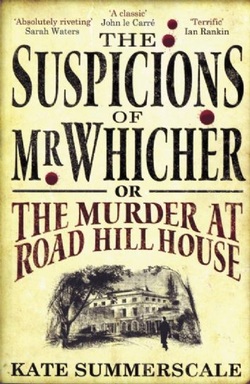
The Suspicions of Mr Whicher or the Murder at Road Hill House
Kate Summerscale
This book offers a history of the early days of the detective narrative from the perspective of one of its earliest and most sensational real-life cases. This book manages to encompass a history of Victorian social values alongside the emerging field of detective fiction of the time whilst at the same time offering a detailed analysis of a horrific country house murder in 1860. Written in the early 21st Century, but about events in the mid 1860s, this book is a crime writing history lesson master piece. The writing is often set in the style of the age by the clearly well read and well informed Summerscale. She lets out snippets of information - sometimes frustratingly little, other times jumping the gun too soon. The events narrated actually helped to shape the modern detective as well as ruining the career of one of the most promising police detectives of his generation.
In the days before Wilkie Collins and the more famous Arthur Conan Doyle the idea of detectives was a novel one at best, and often (with the benefit of hindsight) prejudiced with snobbery and judgmental attitudes. Through meticulous research, and at points tenuous assumptions and links from newspapers up and down the country, this book shows how pervasive class judgements were in the press and the assumptions that surrounded the figure of the detective, especially when he was given access to the higher social stratum who inhabited ‘the Big House’.
Some have criticised this book for being dull and analytical - reading more like an in depth essay - but that is to misunderstand and misjudge the book. For me at least, this was a riveting and easy read, though a little frustrating in its release of certain 'facts' at what I felt were the 'wrong' points in the text. – Why, for example, did Summerscale not address or even speculate as to why Constance’s half-sisters – the sisters of the murdered boy - traveled to Australia presumably with her. Surely this fact and the complicated family dynamic that surrounds it - if Constance did murder Saville (sorry to give that away) - is a huge omission. I would have even welcomed unverified speculation here, as it occasionally occurs elsewhere.
There is no denying that, whilst the text is cleverly edited, it is also at points intriguingly and sometimes disparately structured to fill out a whole book. Flitting between the Detective in London and the village the events occurred – as opposed to an evolving narrative. It does include an exciting narrative voice in parts and offers suspense and changing of pace when required. But also as a work of fact (and speculation) overall it maintains and achieves an exciting sense of urgency that is normally confined to fiction. Indeed, it just goes to prove that sometimes fact is stranger, and more fascinating, than fiction.
Kate Summerscale
This book offers a history of the early days of the detective narrative from the perspective of one of its earliest and most sensational real-life cases. This book manages to encompass a history of Victorian social values alongside the emerging field of detective fiction of the time whilst at the same time offering a detailed analysis of a horrific country house murder in 1860. Written in the early 21st Century, but about events in the mid 1860s, this book is a crime writing history lesson master piece. The writing is often set in the style of the age by the clearly well read and well informed Summerscale. She lets out snippets of information - sometimes frustratingly little, other times jumping the gun too soon. The events narrated actually helped to shape the modern detective as well as ruining the career of one of the most promising police detectives of his generation.
In the days before Wilkie Collins and the more famous Arthur Conan Doyle the idea of detectives was a novel one at best, and often (with the benefit of hindsight) prejudiced with snobbery and judgmental attitudes. Through meticulous research, and at points tenuous assumptions and links from newspapers up and down the country, this book shows how pervasive class judgements were in the press and the assumptions that surrounded the figure of the detective, especially when he was given access to the higher social stratum who inhabited ‘the Big House’.
Some have criticised this book for being dull and analytical - reading more like an in depth essay - but that is to misunderstand and misjudge the book. For me at least, this was a riveting and easy read, though a little frustrating in its release of certain 'facts' at what I felt were the 'wrong' points in the text. – Why, for example, did Summerscale not address or even speculate as to why Constance’s half-sisters – the sisters of the murdered boy - traveled to Australia presumably with her. Surely this fact and the complicated family dynamic that surrounds it - if Constance did murder Saville (sorry to give that away) - is a huge omission. I would have even welcomed unverified speculation here, as it occasionally occurs elsewhere.
There is no denying that, whilst the text is cleverly edited, it is also at points intriguingly and sometimes disparately structured to fill out a whole book. Flitting between the Detective in London and the village the events occurred – as opposed to an evolving narrative. It does include an exciting narrative voice in parts and offers suspense and changing of pace when required. But also as a work of fact (and speculation) overall it maintains and achieves an exciting sense of urgency that is normally confined to fiction. Indeed, it just goes to prove that sometimes fact is stranger, and more fascinating, than fiction.
The View From The Other Side: The One That Got Away. Burt and Leasor
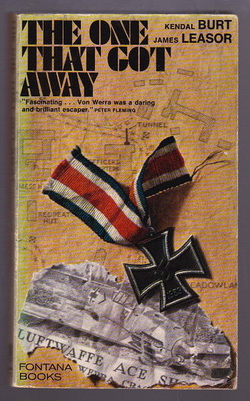
The One that got Away: The Story of Oberleutnant Franz von Werra
by Kendall Burt and James Leasor (published in 1956).
For years I thought that Chris Ryan's book of the same name (about his escapades in the first Iraqi war) was the only book called 'The One That Got Away', not realising in fact it was a nod to this earlier, downright thrilling, story. The only Axis prisoner to have escaped from POW camps in Canada - and ultimately one of only a few to make it home before hostilities ceased - Von Werra's story was never going to be dull! Countless escape attempts, extreme bluffing and heroism of an extraordinary nature all feature in this easy to read book. In this daredevil story there are some striking similarities to those that future generations in Britain and America grew up on, most obviously the audacious tunneling of The Great Escape.
Ultimately this publication will not win any prizes for highbrow literature – but this is a thoroughly brilliant book. A brisk read with mad cap Boy’s Own style of heroics is all the more interesting for being from 'the other side.' The losers in war seldom get history’s prizes for posterity. As with many wartime escapees, Von Werra himself comes across as a slightly overblown, larger than life character. This is not helped by the celebrity status possibly forced upon him by the German High Command before his capture, but also his own bit of pompousness and arrogance. All military autobiographies, and especially those published in wartime or shortly afterwards, have an edge of the The Gem or The Magnet and are a bit fantastical because, in part, the writer thinks the audience demand it (Bravo Two Zero and Sniper One are two of the most recent), but also because the characters who succeed and have a more interesting story to tell are often the more self-important and conceited. But that in no way undermines Von Werra’s sheer audacity in defying the odds, indeed there is a compelling case to say all those successful escapees on both sides fit into the same broken mould. Written in a complimentary fashion - both based upon Von Werra's own unpublished manuscript ["Meine Flucht aus England" (My Escape from England)] as well as other detailed (and more impartial) sources, this book achieves a great overarching vision of how close Von Werra was to escaping on many occasions and the dangers to Allied lines and lives if he did. A prototype Hurricane that he sat in about to take off being the most audacious. (For a more detailed but excellent synopsis - check out http://www.pegasusarchive.org/pow/franz_von_werra.htm). Even though this attempt failed by minutes, upon returning home he was a source of crucial information for the German High Command, but also a propaganda coup, which they made full use of as far as he was willing. Though it was his desire to return to the air that unfortunately ultimately cost him his life relatively early in the war.
A great riveting read full of bravado – but my slight review can’t do all the nuances of the detailed book justice. Pick it up easily and read it just as easily. Great fun – spiffing chaps and all that!
by Kendall Burt and James Leasor (published in 1956).
For years I thought that Chris Ryan's book of the same name (about his escapades in the first Iraqi war) was the only book called 'The One That Got Away', not realising in fact it was a nod to this earlier, downright thrilling, story. The only Axis prisoner to have escaped from POW camps in Canada - and ultimately one of only a few to make it home before hostilities ceased - Von Werra's story was never going to be dull! Countless escape attempts, extreme bluffing and heroism of an extraordinary nature all feature in this easy to read book. In this daredevil story there are some striking similarities to those that future generations in Britain and America grew up on, most obviously the audacious tunneling of The Great Escape.
Ultimately this publication will not win any prizes for highbrow literature – but this is a thoroughly brilliant book. A brisk read with mad cap Boy’s Own style of heroics is all the more interesting for being from 'the other side.' The losers in war seldom get history’s prizes for posterity. As with many wartime escapees, Von Werra himself comes across as a slightly overblown, larger than life character. This is not helped by the celebrity status possibly forced upon him by the German High Command before his capture, but also his own bit of pompousness and arrogance. All military autobiographies, and especially those published in wartime or shortly afterwards, have an edge of the The Gem or The Magnet and are a bit fantastical because, in part, the writer thinks the audience demand it (Bravo Two Zero and Sniper One are two of the most recent), but also because the characters who succeed and have a more interesting story to tell are often the more self-important and conceited. But that in no way undermines Von Werra’s sheer audacity in defying the odds, indeed there is a compelling case to say all those successful escapees on both sides fit into the same broken mould. Written in a complimentary fashion - both based upon Von Werra's own unpublished manuscript ["Meine Flucht aus England" (My Escape from England)] as well as other detailed (and more impartial) sources, this book achieves a great overarching vision of how close Von Werra was to escaping on many occasions and the dangers to Allied lines and lives if he did. A prototype Hurricane that he sat in about to take off being the most audacious. (For a more detailed but excellent synopsis - check out http://www.pegasusarchive.org/pow/franz_von_werra.htm). Even though this attempt failed by minutes, upon returning home he was a source of crucial information for the German High Command, but also a propaganda coup, which they made full use of as far as he was willing. Though it was his desire to return to the air that unfortunately ultimately cost him his life relatively early in the war.
A great riveting read full of bravado – but my slight review can’t do all the nuances of the detailed book justice. Pick it up easily and read it just as easily. Great fun – spiffing chaps and all that!
Owen Chase Et Al: The Shipwreck of the Whaleship Essex
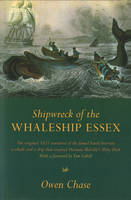
The Shipwreck of the Whaleship Essex
by Owen Chase (this edition includes 2 other reports)
The Shipwreck of the Whaleship Essex is a fascinating and easy read, despite being written nearly 200 years ago. This edition features 3 'factual' accounts of the same dreadful and thrilling event of 1819-21. Though Owen Chase's most famous account failed to set the publishing world alight when it was originally published in 1821, the story is one that takes hold of the imagination. Indeed, his narrative inspired Melville's Moby Dick and thus captured the imaginations of future generations.
The amazing facts, however, are verified by the eixtence of 2 further accounts - Captain Pollard's brief account (second hand at best) seems a true representation and the British born Thmoas Chapple's account which seems to have been used for a religious tract. This edition also includes the detailed annotated notes from Herman Melville, himself born the year the Essex sank. Missing and perhaps of use are the 14 year old cabin boy's, Thomas Gibson Nickerson's, recollections as well. Though clearly Nickerson's account had little influence on Melville - it is unlikely he saw it at all. This manuscript was lost until 1960, and was first published in 1984.
But Owen Chase's account is the main feautre of this book. It is enthralling, an easy read - though at points could benefit from clarification or footnotes from the editor - notably when explaining the confusion surrounding Henderson / Elizabeth Island that the sailors land on (they are one in the same). Though in this instance the useful map came in handy if not answering the query!
But all accounts are thrilling. It includes the heartache felt not just at the cannibalism that the crew were forced to resort to, but also the harrowing drawing of lots that preceded it. Interesting also is the fact that all the black members of the crew died first - perhaps their historic diet - or was it a more menacting sense of 19th Century priorities that was not dwelt of or even felt needed to be addressed by the surviving narrators.
Likewise - once they found land (for the first and only time) the poaching of birds eggs and even the birds who put up no resistance (presumably unused to human contact) - it is curious unanswerable question - did the actions of the protagonists gorging themselves on these actually lead in some way to the birds extinction?
But overall - if these things whetted your appetite there is so much more to follow up on this rivetting read. Are the 6 (or 8?) skeletons the marooned themselves found on the island the same 'prehistoric' (at least pre Columbian) Polynessians rediscovered in the 1990s? So many questions and so few answers - but a light easy read to offer a taster into the world of a few hardy souls who suffered and largely died penniless and cursed.
by Owen Chase (this edition includes 2 other reports)
The Shipwreck of the Whaleship Essex is a fascinating and easy read, despite being written nearly 200 years ago. This edition features 3 'factual' accounts of the same dreadful and thrilling event of 1819-21. Though Owen Chase's most famous account failed to set the publishing world alight when it was originally published in 1821, the story is one that takes hold of the imagination. Indeed, his narrative inspired Melville's Moby Dick and thus captured the imaginations of future generations.
The amazing facts, however, are verified by the eixtence of 2 further accounts - Captain Pollard's brief account (second hand at best) seems a true representation and the British born Thmoas Chapple's account which seems to have been used for a religious tract. This edition also includes the detailed annotated notes from Herman Melville, himself born the year the Essex sank. Missing and perhaps of use are the 14 year old cabin boy's, Thomas Gibson Nickerson's, recollections as well. Though clearly Nickerson's account had little influence on Melville - it is unlikely he saw it at all. This manuscript was lost until 1960, and was first published in 1984.
But Owen Chase's account is the main feautre of this book. It is enthralling, an easy read - though at points could benefit from clarification or footnotes from the editor - notably when explaining the confusion surrounding Henderson / Elizabeth Island that the sailors land on (they are one in the same). Though in this instance the useful map came in handy if not answering the query!
But all accounts are thrilling. It includes the heartache felt not just at the cannibalism that the crew were forced to resort to, but also the harrowing drawing of lots that preceded it. Interesting also is the fact that all the black members of the crew died first - perhaps their historic diet - or was it a more menacting sense of 19th Century priorities that was not dwelt of or even felt needed to be addressed by the surviving narrators.
Likewise - once they found land (for the first and only time) the poaching of birds eggs and even the birds who put up no resistance (presumably unused to human contact) - it is curious unanswerable question - did the actions of the protagonists gorging themselves on these actually lead in some way to the birds extinction?
But overall - if these things whetted your appetite there is so much more to follow up on this rivetting read. Are the 6 (or 8?) skeletons the marooned themselves found on the island the same 'prehistoric' (at least pre Columbian) Polynessians rediscovered in the 1990s? So many questions and so few answers - but a light easy read to offer a taster into the world of a few hardy souls who suffered and largely died penniless and cursed.
Mary Shelley: Frankenstein
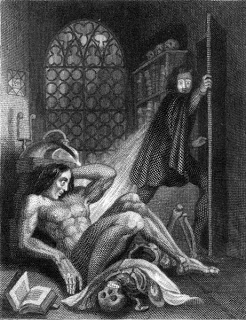
Frankenstein
Mary Shelley,
Here is a whizz of a read. A classic that doesn't come with all the heavy duty reading of many of its contemporaries and luminaries. And perhaps most important to note for those who have not read it ...yet .... this is the story of the trials and tribulations of Dr Frankenstein not his monster! That's Frankensteen to those with a comic bent!
Thanks to the 20th century advent of cinema and celluiod to immortalise everything, this book's monster has taken on a misplaced identity of its own. This book offers a great depth than could not be imagined at first glance. The overarching question is "How dangerous is the acquirement of knowledge, and much happier that man is who believes his native town to be the world, than he who aspires to become greater than his nature will allow". A conundrum we would do well to remember in this consumer and celebrity obsessed century as the Victorians did with the advent (or unprecedented progress) of industrialisation and science.
Perhaps this is less a review and more a stumbling from one quote to another becase although the much slatted and victimised bankers of the early 21st Century may come in for unjustified stick - the scientist of Mary Shelley's classic has words they and we should all heed "If the study to which you apply yourself has the tendency to weaken your affections, and destroy your taste for those simple pleasures in which no alloy can possibly mix, then that study is certainly unlawful, that is to say not benefitting the human mind." Society's greed to 'advance' and to better its lot creates monsters that it conveniently uses as a scapegoat. The upshot for Dr Frankenstein is to shun the public and any form of human contact - as result of his dabblings. The symbolism of the use of the moon - and the feminine (possibly even passive, pale and serene) offer an insight into the type of childbirth that men are guilty of.
An Oedipal theme throughout - of counting no man truly happy until he is dead - is a constant and not subtle homage, but an important one nonetheless. The fact that the 'savages' are the only one's to see and recognise the monster for what he is, perhaps points to the fact that the overly 'civilised' Western world has lost the ability to understand their own inner demons in the separation of self from 'nature'.
Mary Shelley,
Here is a whizz of a read. A classic that doesn't come with all the heavy duty reading of many of its contemporaries and luminaries. And perhaps most important to note for those who have not read it ...yet .... this is the story of the trials and tribulations of Dr Frankenstein not his monster! That's Frankensteen to those with a comic bent!
Thanks to the 20th century advent of cinema and celluiod to immortalise everything, this book's monster has taken on a misplaced identity of its own. This book offers a great depth than could not be imagined at first glance. The overarching question is "How dangerous is the acquirement of knowledge, and much happier that man is who believes his native town to be the world, than he who aspires to become greater than his nature will allow". A conundrum we would do well to remember in this consumer and celebrity obsessed century as the Victorians did with the advent (or unprecedented progress) of industrialisation and science.
Perhaps this is less a review and more a stumbling from one quote to another becase although the much slatted and victimised bankers of the early 21st Century may come in for unjustified stick - the scientist of Mary Shelley's classic has words they and we should all heed "If the study to which you apply yourself has the tendency to weaken your affections, and destroy your taste for those simple pleasures in which no alloy can possibly mix, then that study is certainly unlawful, that is to say not benefitting the human mind." Society's greed to 'advance' and to better its lot creates monsters that it conveniently uses as a scapegoat. The upshot for Dr Frankenstein is to shun the public and any form of human contact - as result of his dabblings. The symbolism of the use of the moon - and the feminine (possibly even passive, pale and serene) offer an insight into the type of childbirth that men are guilty of.
An Oedipal theme throughout - of counting no man truly happy until he is dead - is a constant and not subtle homage, but an important one nonetheless. The fact that the 'savages' are the only one's to see and recognise the monster for what he is, perhaps points to the fact that the overly 'civilised' Western world has lost the ability to understand their own inner demons in the separation of self from 'nature'.
|
|
|
Peter Padfield: Donitz: The Last Fuhrer
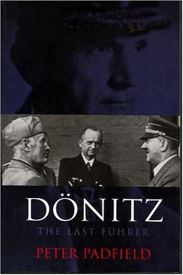
Donitz: The Last Fuhrer
Peter Padfield
1984
This well researched and thorough book, which was published just three years after the subject's death, gives a detailed picture of the life of Karl Donitz and the world he lived in. In many way it captures a snapshot of the Reich's greatest 'yes-man' but, as with many successful men, presents a picture of one of the world's best self propogandists, though clearly he was a brave and intelligent Naval officer.
.
It comprises of a selection of interviews with some of his former colleagues and close family, as well as a somewhat over-reliant use of British Intelligence files. This has led to the obvious and possibly valid accusation that "The author takes the standard British view" as one reviewer rightly noted. However, although this is an undeniably meaty biography it also gives the impression that it is missing some crucial details. Some omissions of details towards the end of the war are addressed - the Nazi's destroyed vast swaths of documents as the Allies approached Berlin, but that does not account for all the gaps. Facing obvious omissions in the source documents and in the absence of cold hard facts, Padfield resorts to logical speculation. Whilst being reasonable (and possibly even correct!) is still just conjecture. However, in his defense, the most speculative conclusions or even observations are clearly referenced and acknowledged. Observations about 'an' early life and it's possible influences on the man border on the Freudian, but can never be ruled out. It also relies perhaps too much on Donitz's own book (Memoirs: Ten Years and 20 Days) which may be stooped heavily in propoganda and correctionist revisionism on the part of a leading party member.
Overall the book faithfully captures the spirit of Karl Donitz the man. An intelligent, considered man who was also unquestionably brave himself as well as a sincere and courageous leader, but one who was either easily manipulted and led or possibly of highly questionable ethics and morals himself! This account is well written with the thorough research increasing our knowledge of a Nazi mastermind and great military leader under the Third Reich. Once he became a Nazi party member Donitz tried to council Hitler and worked hard offering him the answers he demanded, whilst also privy to the ghastly secrets of the parties activities (most obviously the Concentration Camps). This biography also serves as a reminder of the politican's pragmatism following Hitler's death and his chameleon-like ability to fall back on the 'we were only soldiers obeying orders' at Nuremburg. As Padfield shows, for Dontiz at least, this appears a complete fiction but he was able to fool or convince the many intelligent minds to the contrary, even when they were baying for blood.
Whilst researching what to write about this book which I very much enjoyed I came across a harsh and largely unjust review on the ihr.org website. Certain comments there are spot on - but overall I think it is misguided. To condemn the text as "garbled, hostile rehash of long-discredited British war propoganda" is ultimately wrong.
That said the book frustratingly slips into factual errors from time to time. But in such a tome that is to be expdected. Overall it is a great and detailed read with minor quibbles.
Rupert Matthews: Hitler
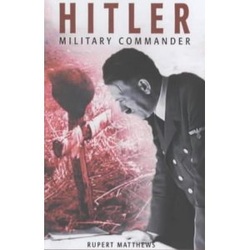
Hitler – Military Commander
Rupert Matthews
This book is a great overview of Hitler’s broad ‘career’ spanning some 30 years (1914 – 1945). But ultimately it is nothing more than that, just a brief synopsis. It offers fascinating glimpses but little deep analysis of Hitler’s decisions and the deeper psychological or even pathological rhyme and reason. It offer a tantalising and succinct look at the future Fuhrer’s role as a runner in WWI. A more thorough analysis and a more meaty narrative approach, particularly on the actual process of decisions making and there consequences would be appreciated. But what does come across is that apart from Hitler’s unflinching bravery he would have been in a minor position to make any important decisions. However as an experience the First World War fundamentally shape his entire subsequent military outlook – in some cases to the severe determent [and death] of his troops. Instead we are treated to a light overview with the relevant background. It isn’t really until over halfway through the book that we really start to see Hitler’s own identity being stamped upon crucial decisions in a military setting. Here it is captivating. We see how few operational decisions Hitler made early in the war. Once planning was done generals of the army took over. Beyond the planning “Hitler had usually stood back from the actual conduct of military campaigns”, as Matthews acknowledges, thereby perhaps making him more a military leader than a hands on Commander up until this point. That is until August 1941 when he naively diverted his undivided attention towards the ill fated Operation Barbarrossa. Because of his intransigence in, for example diverting panzers into the Ukraine when logic may have dictated otherwise, we see the 1000 Year Reich begin to fall apart. Strategically he had made some brilliant decisions up until this point but appears to have consistently got it wrong subsequently – even before delusion seems to have set in.
Overall an interesting and balanced read perhaps because of its size it prompts more questions than it gives answers. How for example did the wily Adolf manage to arrange for Finland to ‘loan’ Nazi Germany a submarine for practice in 1935? Why did he become deluded and obsessed with imaginary armies towards the end – though perhaps that is more a question for the ‘Hitler: A Psychological Analysis’! For the military commander however - pick this up for a taster but don’t expect too much more.
Rupert Matthews
This book is a great overview of Hitler’s broad ‘career’ spanning some 30 years (1914 – 1945). But ultimately it is nothing more than that, just a brief synopsis. It offers fascinating glimpses but little deep analysis of Hitler’s decisions and the deeper psychological or even pathological rhyme and reason. It offer a tantalising and succinct look at the future Fuhrer’s role as a runner in WWI. A more thorough analysis and a more meaty narrative approach, particularly on the actual process of decisions making and there consequences would be appreciated. But what does come across is that apart from Hitler’s unflinching bravery he would have been in a minor position to make any important decisions. However as an experience the First World War fundamentally shape his entire subsequent military outlook – in some cases to the severe determent [and death] of his troops. Instead we are treated to a light overview with the relevant background. It isn’t really until over halfway through the book that we really start to see Hitler’s own identity being stamped upon crucial decisions in a military setting. Here it is captivating. We see how few operational decisions Hitler made early in the war. Once planning was done generals of the army took over. Beyond the planning “Hitler had usually stood back from the actual conduct of military campaigns”, as Matthews acknowledges, thereby perhaps making him more a military leader than a hands on Commander up until this point. That is until August 1941 when he naively diverted his undivided attention towards the ill fated Operation Barbarrossa. Because of his intransigence in, for example diverting panzers into the Ukraine when logic may have dictated otherwise, we see the 1000 Year Reich begin to fall apart. Strategically he had made some brilliant decisions up until this point but appears to have consistently got it wrong subsequently – even before delusion seems to have set in.
Overall an interesting and balanced read perhaps because of its size it prompts more questions than it gives answers. How for example did the wily Adolf manage to arrange for Finland to ‘loan’ Nazi Germany a submarine for practice in 1935? Why did he become deluded and obsessed with imaginary armies towards the end – though perhaps that is more a question for the ‘Hitler: A Psychological Analysis’! For the military commander however - pick this up for a taster but don’t expect too much more.
Sebastian Haffner: Defying Hitler
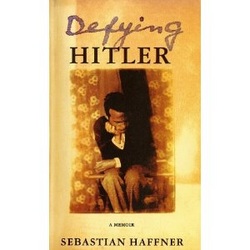
Defying Hitler
Sebastian Haffner
This book contains well written observations on growing up (a boy and man) in what became Hitler’s Germany. The only criticism of this book is that everything is told all too briefly, especially at the beginning – but perhaps that is a bit harsh – I certainly don’t remember much of my own early childhood! But that aside – this is a fascinating look into a child’s life during and after the First World War and the psychological effects this had on children of the era, the same children who were to be the backbone of Hitler’s Third Reich. The loss and disillusionment of a final defeat famously stolen from the mouth of victory has macabrely morphed into a final solution. The autobiography is given added depth by the personal story of someone (‘Aryan’) who escaped the injustices they saw, but failed to confront them.
Haffner (an assumed name) passed away in 1999 having been a successful Journalist and writer in Britain (London) during and after the war. However this all too short biography only covers to the period 1935 and not up to his departure in 1938. If he had elaborated it is unlikely the impact would have been lost, but we should remain grateful for what we have – the true and frank observations and comments of an intelligent disillusioned young man.
At times the book is self aware and even self deprecating – both in humorous and ominous ways, but all condensed into a very easy read. It explores and successfully offers an insight into the individuals and also the collective mind set that enabled both an unelected power to succeed and induce, which in turn manufactured passion and devotion across the board.
From the book -
“As Bismarck once remarked in a famous speech, Moral courage is, in any case, a rare virtue in Germany, but deserts a German completely the moment he puts on a uniform. As soldier and officer, he is indisputably and outstandingly courageous on the field of battle. He is usually even prepared to open fire on his own compatriots if ordered to do so. Yet he is timid as a lamb at the thought of opposing authority.”
Much is made of the ‘German psyche and personality’ – perhaps too much – but overall an interesting read.
Eventually Haffner himself (Raimund Pretzel) did return to post War Germany consolidating on his journalism success, but that is another story – one that unfortunately he didn’t have time (or the inclination?) to pen before his death in 1999.
Sebastian Haffner
This book contains well written observations on growing up (a boy and man) in what became Hitler’s Germany. The only criticism of this book is that everything is told all too briefly, especially at the beginning – but perhaps that is a bit harsh – I certainly don’t remember much of my own early childhood! But that aside – this is a fascinating look into a child’s life during and after the First World War and the psychological effects this had on children of the era, the same children who were to be the backbone of Hitler’s Third Reich. The loss and disillusionment of a final defeat famously stolen from the mouth of victory has macabrely morphed into a final solution. The autobiography is given added depth by the personal story of someone (‘Aryan’) who escaped the injustices they saw, but failed to confront them.
Haffner (an assumed name) passed away in 1999 having been a successful Journalist and writer in Britain (London) during and after the war. However this all too short biography only covers to the period 1935 and not up to his departure in 1938. If he had elaborated it is unlikely the impact would have been lost, but we should remain grateful for what we have – the true and frank observations and comments of an intelligent disillusioned young man.
At times the book is self aware and even self deprecating – both in humorous and ominous ways, but all condensed into a very easy read. It explores and successfully offers an insight into the individuals and also the collective mind set that enabled both an unelected power to succeed and induce, which in turn manufactured passion and devotion across the board.
From the book -
“As Bismarck once remarked in a famous speech, Moral courage is, in any case, a rare virtue in Germany, but deserts a German completely the moment he puts on a uniform. As soldier and officer, he is indisputably and outstandingly courageous on the field of battle. He is usually even prepared to open fire on his own compatriots if ordered to do so. Yet he is timid as a lamb at the thought of opposing authority.”
Much is made of the ‘German psyche and personality’ – perhaps too much – but overall an interesting read.
Eventually Haffner himself (Raimund Pretzel) did return to post War Germany consolidating on his journalism success, but that is another story – one that unfortunately he didn’t have time (or the inclination?) to pen before his death in 1999.
Geoffrey Lewis: Carson: The Man Who Divided Ireland
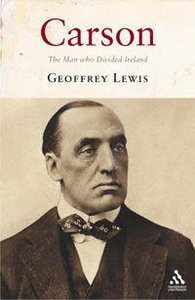
Carson: The Man Who Divided Ireland
Geoffrey Lewis
2005
Lord Edward Carson is a divisive character: Seen by many of the Irish who wished to remain part of the United Kingdom as a hero, by others as a traitor who caused a splinter that still injures the island. The Dublin man never foresaw or even imagined until late on that his unionist brethren (more prevalent in the north of the island), would hue the island in two. Given the circumstance therefore the epithet of this book ‘The Man Who Divided Ireland’ is well chosen. However, the book itself does not focus exclusively on his role in this one issue, but also in the context of a man who served the Empire until such time as the ‘Irish Question’ outweighed all other issues.
Overall this book is a balanced and well researched account of a man who’s main desire was to maintain a union that he perceived was in the best interests of his homeland. But he eventually bowed to popular pressure and acknowledged that his aim was sought only by a majority in 6 counties. In many ways more could be made of the betrayal element here – Carson chose eventually to crusade for only the Ulster counties and arguably sold his own unionist colleagues and their sizeable minorities in the other counties down the river.
Born in Harcourt Street in Dublin in 1854, Carson was perceived as one of the established elite. Despite 20th century attempts to demonise him (compounded by unflattering photos of him making him look a stern man) he seems in all his actions a fair man who consistently fought against the extremes of sectarianism on both sides of the Irish divide, as this narrative commendably illustrates. But, as if to prove how complicated the situation on the island is (and at the same time highlighting just how closely aligned unionist and republican normal day-to-day lives are) in a great irony he was also (albeit distant) a cousin to the first president of Sinn Fein (Edward Martyn).
Well informed, Geoffrey Lewis gives a balanced view of a man with admirable convictions and research. Perhaps with every biography however there are omissions:
The book deals in detail with the Oscar Wilde case (a whole chapter) but does not even mention the Cadbury Case, a libel case involving Cadbury’s use of slave labour abroad which contrasted with their ethical stance at home. There are touching insight into his second marriage and aspects of his personal life, including the regular medicinal visits to German health spas.
One accusation that could be thrown at this book is it seems, at points, to rely too heavily, and possibly even exclusively, on the letters written by Carson to Lady Londonderry – only one side of which survive. Though from this solid starting point more general suppositions can be made and the overall picture is well balanced.
In fact – to read online here is the link!
http://books.google.com/books?id=ZG63y98ucvgC&lpg=PA67&ots=KdAt7AQblp&dq=Carson%20to%20Lady%20Londonderry&pg=PP1#v=onepage&q=Carson%20to%20Lady%20Londonderry&f=false
Geoffrey Lewis
2005
Lord Edward Carson is a divisive character: Seen by many of the Irish who wished to remain part of the United Kingdom as a hero, by others as a traitor who caused a splinter that still injures the island. The Dublin man never foresaw or even imagined until late on that his unionist brethren (more prevalent in the north of the island), would hue the island in two. Given the circumstance therefore the epithet of this book ‘The Man Who Divided Ireland’ is well chosen. However, the book itself does not focus exclusively on his role in this one issue, but also in the context of a man who served the Empire until such time as the ‘Irish Question’ outweighed all other issues.
Overall this book is a balanced and well researched account of a man who’s main desire was to maintain a union that he perceived was in the best interests of his homeland. But he eventually bowed to popular pressure and acknowledged that his aim was sought only by a majority in 6 counties. In many ways more could be made of the betrayal element here – Carson chose eventually to crusade for only the Ulster counties and arguably sold his own unionist colleagues and their sizeable minorities in the other counties down the river.
Born in Harcourt Street in Dublin in 1854, Carson was perceived as one of the established elite. Despite 20th century attempts to demonise him (compounded by unflattering photos of him making him look a stern man) he seems in all his actions a fair man who consistently fought against the extremes of sectarianism on both sides of the Irish divide, as this narrative commendably illustrates. But, as if to prove how complicated the situation on the island is (and at the same time highlighting just how closely aligned unionist and republican normal day-to-day lives are) in a great irony he was also (albeit distant) a cousin to the first president of Sinn Fein (Edward Martyn).
Well informed, Geoffrey Lewis gives a balanced view of a man with admirable convictions and research. Perhaps with every biography however there are omissions:
The book deals in detail with the Oscar Wilde case (a whole chapter) but does not even mention the Cadbury Case, a libel case involving Cadbury’s use of slave labour abroad which contrasted with their ethical stance at home. There are touching insight into his second marriage and aspects of his personal life, including the regular medicinal visits to German health spas.
One accusation that could be thrown at this book is it seems, at points, to rely too heavily, and possibly even exclusively, on the letters written by Carson to Lady Londonderry – only one side of which survive. Though from this solid starting point more general suppositions can be made and the overall picture is well balanced.
In fact – to read online here is the link!
http://books.google.com/books?id=ZG63y98ucvgC&lpg=PA67&ots=KdAt7AQblp&dq=Carson%20to%20Lady%20Londonderry&pg=PP1#v=onepage&q=Carson%20to%20Lady%20Londonderry&f=false
Bruce Marshall: The White Rabbit F F S Yeo-Thomson
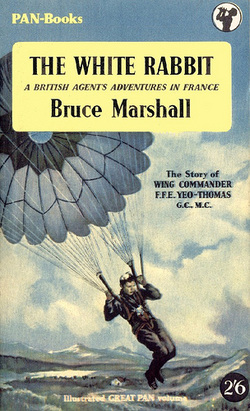
The White Rabbit F F S Yeo-Thomson
Bruce Marshall
A fascinating story. Truly gripping, edge of the seat stuff this. The true story of the quintessential European F F S Yeo-Thomson. An ‘English’ taylor living in Paris when war began, he was a charismatic and colourful individual who was suited to the espionage for which he was eventually chosen (chosen after persistent attempts!). Dropped into occupied France he rallied a disparate resistance and garnered popular support as the mythical ‘Shelley’ code name. However captured by the Gestapo he is to suffer unbearable tortures at the hands of various departments across France and Germany. Sentenced to death on more than one occasion he manages to escape (or the British SOE arrange for his file to somehow be ‘lost’). However he himself also manages to escape on many occasions – sometimes yards, other times miles from his prison before his fourth (? I lost count) escape he finally makes it across the front line and a minefield in 1945 to report his experience. His testimony proved crucial in convicting many of the brutal regime who coordinated and managed the sickening tortures on him and thousands of others not fortunate enough to survive.
Amiably written like an art form a word also needs to be said for the Scottish writer of this great text. Almost a novel (Marshall is a novelist) in its indulgences, speculation and quaint turn of phrase are not archain but adept. Thoroughly riveting stuff of boys own comics – but clearly researched and personably at all times ……….. My descriptions or praise cannot do this book justice – just read it!!
Bruce Marshall
A fascinating story. Truly gripping, edge of the seat stuff this. The true story of the quintessential European F F S Yeo-Thomson. An ‘English’ taylor living in Paris when war began, he was a charismatic and colourful individual who was suited to the espionage for which he was eventually chosen (chosen after persistent attempts!). Dropped into occupied France he rallied a disparate resistance and garnered popular support as the mythical ‘Shelley’ code name. However captured by the Gestapo he is to suffer unbearable tortures at the hands of various departments across France and Germany. Sentenced to death on more than one occasion he manages to escape (or the British SOE arrange for his file to somehow be ‘lost’). However he himself also manages to escape on many occasions – sometimes yards, other times miles from his prison before his fourth (? I lost count) escape he finally makes it across the front line and a minefield in 1945 to report his experience. His testimony proved crucial in convicting many of the brutal regime who coordinated and managed the sickening tortures on him and thousands of others not fortunate enough to survive.
Amiably written like an art form a word also needs to be said for the Scottish writer of this great text. Almost a novel (Marshall is a novelist) in its indulgences, speculation and quaint turn of phrase are not archain but adept. Thoroughly riveting stuff of boys own comics – but clearly researched and personably at all times ……….. My descriptions or praise cannot do this book justice – just read it!!
Benjamin Harris: The Recollections of Rifleman Harris
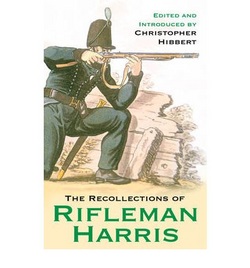
The Recollections of Rifleman Harris
Benjamin Harris As Told to Henry Curling
A memoir published in 1848 of the experiences of an enlisted soldier in the 95th Regiment of Foot in the British Army. No Grand narrative here, just working man telling his story.
Rifleman Benjamin Harris, the son of a shepherd from Dorset joined the British Army in 1803. He later transferred to the 95th Rifles, who’s smart green jacket’s impressed him, one of the few Englishmen in an Irish regiment, which at points he is painfully aware of. Some years later Harris dictated his story of service to a senior retired officer (Henry Curling). The recollections are a warmly written collection of anecdotes and stories of battle and warfare from an amiable soldier’s point of view. He is familiar and personable with some great sound bites and moral observations, both about battle and the times in between. The personal tales of drama are often the more interesting and amusing – when he is reminiscing about his observations on the fiery tempered Fluellyn Comyn and his Churchill like ability to be a turn coat to the regiment, twice! Or even when describing the gore of war: “Indeed … the froth came from his mouth …. A Musket ball, I found, had taken him sideways, and gone through both groins”
The short book includes all too real vivid images and harrowing descriptions of the dead and dying on the battlefield told in Harris’s cold observant matter (he himself acknowledges how matter of fact and nonchalant he has become to war’s results).
But the story Harris tells is enthralling and entertaining with stories of curious incidents including a cannonball killing 3 people at once (though some killed up to 10!) and how as the regiments Cobbler he had to go into town to get equipment and facilities to repair the shoes, only to nearly stumble into a bar brawl with the French who he had been fighting 24 hours earlier!
But Harris is not blind to the inhumanities and injustices of war which Harris highlights well “War is a sad blunter of the feelings of men. We felt eager to be at it again. Nay, I am afraid we longed for blood”
Military life of the early 19th century is hard for the modern reader to imagine, but this gives a great picture of what it was like to serve as a ‘squaddie’. Modern soldier’s would appear pampered (but equally exposed) by comparison – the modern British solder seldom collapse in their hundreds of starvation. This book is not alone in being written about the period – but the majority are memoirs from officers who often ‘overlooked’ such privations.
Rifleman Harris is a proud member of his regiment, a regiment that can still be traced through (not surprisingly!) to the modern day Green Jackets!
His affectionate and charming manner make this book an essential read for everyone, even those without an interest in military history: This is a book of pacifism as well as informative piece of personal history.
Benjamin Harris As Told to Henry Curling
A memoir published in 1848 of the experiences of an enlisted soldier in the 95th Regiment of Foot in the British Army. No Grand narrative here, just working man telling his story.
Rifleman Benjamin Harris, the son of a shepherd from Dorset joined the British Army in 1803. He later transferred to the 95th Rifles, who’s smart green jacket’s impressed him, one of the few Englishmen in an Irish regiment, which at points he is painfully aware of. Some years later Harris dictated his story of service to a senior retired officer (Henry Curling). The recollections are a warmly written collection of anecdotes and stories of battle and warfare from an amiable soldier’s point of view. He is familiar and personable with some great sound bites and moral observations, both about battle and the times in between. The personal tales of drama are often the more interesting and amusing – when he is reminiscing about his observations on the fiery tempered Fluellyn Comyn and his Churchill like ability to be a turn coat to the regiment, twice! Or even when describing the gore of war: “Indeed … the froth came from his mouth …. A Musket ball, I found, had taken him sideways, and gone through both groins”
The short book includes all too real vivid images and harrowing descriptions of the dead and dying on the battlefield told in Harris’s cold observant matter (he himself acknowledges how matter of fact and nonchalant he has become to war’s results).
But the story Harris tells is enthralling and entertaining with stories of curious incidents including a cannonball killing 3 people at once (though some killed up to 10!) and how as the regiments Cobbler he had to go into town to get equipment and facilities to repair the shoes, only to nearly stumble into a bar brawl with the French who he had been fighting 24 hours earlier!
But Harris is not blind to the inhumanities and injustices of war which Harris highlights well “War is a sad blunter of the feelings of men. We felt eager to be at it again. Nay, I am afraid we longed for blood”
Military life of the early 19th century is hard for the modern reader to imagine, but this gives a great picture of what it was like to serve as a ‘squaddie’. Modern soldier’s would appear pampered (but equally exposed) by comparison – the modern British solder seldom collapse in their hundreds of starvation. This book is not alone in being written about the period – but the majority are memoirs from officers who often ‘overlooked’ such privations.
Rifleman Harris is a proud member of his regiment, a regiment that can still be traced through (not surprisingly!) to the modern day Green Jackets!
His affectionate and charming manner make this book an essential read for everyone, even those without an interest in military history: This is a book of pacifism as well as informative piece of personal history.
F. W. Winterbotham: The Nazi Connection

The Nazi Connection
F W Winterbotham
This is a thoroughly riveting read, indeed it reads almost like a novel in its amiably written style. However this is a history book. An Intelligent and honestly written autobiography by one of the main players in the ‘spy game’ between the UK and Germany in the mid 1930s. (Who also went on to play a key role in the Enigma and Ultra codebreakers of Bletchley Park). Obviously written with the undoubted benefit of hindsight, which adds value, but could also compromise it tells the stories of Winterbotham infiltrating of the nazi regime through arguably the weakest link – the ‘intellectual’ theorist Alfred Rosenberg. Rosenberg invited him into their inner circle, introducing him to Hitler and ushering him into the clubs and societies of the military and specifically air force groups that went on to form the Luftwaffe. Connections he was more than willing and more importantly able to milk, until he was ‘rumbled’ by growing connections of Nazi Germany with Italy as war loomed.
Drawing on experience in his service in the first world war in the royal Flying Corps (later to become the RAF) according to his own account he was instrumental in ensuring British companies, as well as those politicians with the inclination, were kept informed of Germany’s progress - from Versailles Treaty tied to expansionist Nazi Empire. He portrays himself as dealing with the business sales of engines plus the recruiting of Australian genius Sidney Cotton to carry out peaceful but intrusive aerial reconnaissance over Germany in 1939-40 in a ‘private’ aircraft. (A modified Lockheed 12A). His fascinating study and analysis of all the characters involved and his fears specifically of Goering, are colourful and illuminating.
There is also fascinating speculation albeit brief, that one senior Nazi (Erhard Milch) may have been one of the apparently random connections that sprung up supplying Winterbotham with crucial information about Luftwaffe numbers and capabilities. He also amassed a wealth of information on German political and military intentions – often highlighting how very misguided or misinformed they were, as well as how misguided or trusting the British authorities were.
Ultimately though this is written with the benefit of hindsight and portrays Winterbotham as a forward thinking with vision bordering on the genius (or luck as he concedes) - you trust the writer and his judgement.
But there are slight inaccuracies – the swastika does not have origins in the middle ages – but a lot earlier. Such trivial errors are just that though. The overall effect and impact of this book is fascinating. As well as being a thorough enthralling look at infiltration and the very fluid set up across Europe at the time which facilitated access – but also war.
This is in effect the prequel to his own (and the first) account of the Enigma cipher – in his 1974 book Ultra, which, although it has its critics, was pivotal in paving the way for future information and discussion on the ‘war wining’ topic.
F W Winterbotham
This is a thoroughly riveting read, indeed it reads almost like a novel in its amiably written style. However this is a history book. An Intelligent and honestly written autobiography by one of the main players in the ‘spy game’ between the UK and Germany in the mid 1930s. (Who also went on to play a key role in the Enigma and Ultra codebreakers of Bletchley Park). Obviously written with the undoubted benefit of hindsight, which adds value, but could also compromise it tells the stories of Winterbotham infiltrating of the nazi regime through arguably the weakest link – the ‘intellectual’ theorist Alfred Rosenberg. Rosenberg invited him into their inner circle, introducing him to Hitler and ushering him into the clubs and societies of the military and specifically air force groups that went on to form the Luftwaffe. Connections he was more than willing and more importantly able to milk, until he was ‘rumbled’ by growing connections of Nazi Germany with Italy as war loomed.
Drawing on experience in his service in the first world war in the royal Flying Corps (later to become the RAF) according to his own account he was instrumental in ensuring British companies, as well as those politicians with the inclination, were kept informed of Germany’s progress - from Versailles Treaty tied to expansionist Nazi Empire. He portrays himself as dealing with the business sales of engines plus the recruiting of Australian genius Sidney Cotton to carry out peaceful but intrusive aerial reconnaissance over Germany in 1939-40 in a ‘private’ aircraft. (A modified Lockheed 12A). His fascinating study and analysis of all the characters involved and his fears specifically of Goering, are colourful and illuminating.
There is also fascinating speculation albeit brief, that one senior Nazi (Erhard Milch) may have been one of the apparently random connections that sprung up supplying Winterbotham with crucial information about Luftwaffe numbers and capabilities. He also amassed a wealth of information on German political and military intentions – often highlighting how very misguided or misinformed they were, as well as how misguided or trusting the British authorities were.
Ultimately though this is written with the benefit of hindsight and portrays Winterbotham as a forward thinking with vision bordering on the genius (or luck as he concedes) - you trust the writer and his judgement.
But there are slight inaccuracies – the swastika does not have origins in the middle ages – but a lot earlier. Such trivial errors are just that though. The overall effect and impact of this book is fascinating. As well as being a thorough enthralling look at infiltration and the very fluid set up across Europe at the time which facilitated access – but also war.
This is in effect the prequel to his own (and the first) account of the Enigma cipher – in his 1974 book Ultra, which, although it has its critics, was pivotal in paving the way for future information and discussion on the ‘war wining’ topic.
Ewen Montagu : The Man Who Never Was
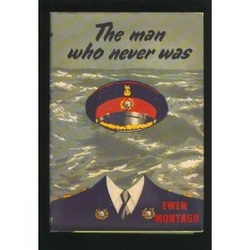
The Man Who Never Was
Ewen Montagu
2 million copies sold! 2 million readers can't be wrong?
The false papers and false person who fooled everyone from the Spanish informant to Hitler himself. The classic true story straight from the man who masterminded the deception that facilitated the invasion of Sicily.
This is a frank, affable story of the plan and the actions behind the ‘campaign of deception’ about the location of the allied invasion of mainland Europe. The story is laid out in a very school text book way – with clear aim and method and execution. … Then a wallowing in how it was fallen for hook, line and sinker by the Axis powers.
Short and succinct (some 40,000 words at most) this tells the story of the man whose body was used to spin a lie to the German high command in 1942. And perhaps miraculously, given the circumstances, the ruse succeeded, crucially diverting Nazi resources from the most obvious target of Sicily, as a stepping stone into Italy, moments before the attack on the Island.
A story of classic spy cloak and dagger subterfuge, trying to cross every T and dot every I in an attempt to give a fictional character real identity and dupe the Germans into believe the documents in his possession were the real McCoy. It is fascinating the way Montagu, in his simple style, analyses and frankly details where the strings led and were followed up (or tied up in a truss) – but more amazing is the way in which all surviving records of everyone up to Hitler, point to a refusal to accept that it was a decoy even after events unfolding point the opposite direction. The mastery and dedication with which the decoy was instilled was such that the main protagonists even seem to believe that the person existed! The fiancés love letters and the Bank’s overdraft demand letters add a personal touch to the deception. Truly this was one of the most crucial Trojan Horses of the modern Era. Not necessarily in winning the war but certainly in limiting allied deaths in conflict, whilst Axis troops twiddled their thumbs in Sardinia and Greece! A knock on, not looked into, however is the effect upon Special Forces across the Baltic – who were plagued with more pressure consequently!
Originally written in 1954, in the interests of protecting his identity, Ewen Montagu did not name the welsh miners son who’s body was used as the decoy. We have no such qualms nowadays and perhaps for an updated perspective the newer Operation Mincemeat by Ben Macintyre may add an extra depth. Overall though – start here – an easy read and a whizz through the facts improved by the affable way Montagu tells them.
Ewen Montagu
2 million copies sold! 2 million readers can't be wrong?
The false papers and false person who fooled everyone from the Spanish informant to Hitler himself. The classic true story straight from the man who masterminded the deception that facilitated the invasion of Sicily.
This is a frank, affable story of the plan and the actions behind the ‘campaign of deception’ about the location of the allied invasion of mainland Europe. The story is laid out in a very school text book way – with clear aim and method and execution. … Then a wallowing in how it was fallen for hook, line and sinker by the Axis powers.
Short and succinct (some 40,000 words at most) this tells the story of the man whose body was used to spin a lie to the German high command in 1942. And perhaps miraculously, given the circumstances, the ruse succeeded, crucially diverting Nazi resources from the most obvious target of Sicily, as a stepping stone into Italy, moments before the attack on the Island.
A story of classic spy cloak and dagger subterfuge, trying to cross every T and dot every I in an attempt to give a fictional character real identity and dupe the Germans into believe the documents in his possession were the real McCoy. It is fascinating the way Montagu, in his simple style, analyses and frankly details where the strings led and were followed up (or tied up in a truss) – but more amazing is the way in which all surviving records of everyone up to Hitler, point to a refusal to accept that it was a decoy even after events unfolding point the opposite direction. The mastery and dedication with which the decoy was instilled was such that the main protagonists even seem to believe that the person existed! The fiancés love letters and the Bank’s overdraft demand letters add a personal touch to the deception. Truly this was one of the most crucial Trojan Horses of the modern Era. Not necessarily in winning the war but certainly in limiting allied deaths in conflict, whilst Axis troops twiddled their thumbs in Sardinia and Greece! A knock on, not looked into, however is the effect upon Special Forces across the Baltic – who were plagued with more pressure consequently!
Originally written in 1954, in the interests of protecting his identity, Ewen Montagu did not name the welsh miners son who’s body was used as the decoy. We have no such qualms nowadays and perhaps for an updated perspective the newer Operation Mincemeat by Ben Macintyre may add an extra depth. Overall though – start here – an easy read and a whizz through the facts improved by the affable way Montagu tells them.
Nigel Cawthorne: A History Of Pirates: Blood and Thunder on the High Seas.
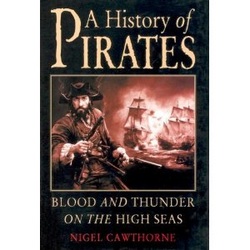
Pirates
A History Of Pirates: Blood and Thunder on the High Seas. Nigel Cawthorne
A fascinating, albeit it brief, overview of the lives and times of pirates at the height of their ‘fame’ in the late 17th early 18th Century. Offering a cross section of views, from the recorded events that took place to the weapons used. Some are a bit thin and feel like they are to fatten the book out. The ‘Weapons’ chapter has a lazy photo simply called ‘A Selection of Pirate Weaponry’ with no references, whilst the subsections are simple observations and over views on the weapons themselves. However the detail about the transformation from Privateers to Buccaneers and pirates is fascinating, well researched and interesting overview of events.
The word itself though ‘pirate’ is derived from the Latin pirata and Greek ‘peiratēs’, and pirates have existed for as long as man has taken to shipping goods by sea. However as the stakes became higher, so we see the real success of state backed Piracy. Governments and turncoats of mixed and dubious loyalty under government coercion or interference or even in some instances specific commissions are seen to perpetrate acts of terrorism against other countries ships! Though, as is so often the case, because of ‘official’ backing they were often classified privateers as opposed to pirates!
There is a fascinating story of how the first English Empire was based upon privateering (or state condoned piracy – depending on your point of view!). More generally it is fascinating that so many famous people have been captured by Pirates. How different things might have been if Julius Ceasar had not been held ransom in 78BC. Or we may never have had Don Quixote if Miguel De Cervantes had not been released in 1575. Both the Roman and British Empires (and all in between) have tried to take on and in various degrees undermined the piracy trade. But piracy never went away and at present is making a resurgence in the media.
But the first ever solidifying of the the pirates image in the public consciousness came with Daniel Defoe’s (?) 1724 book A General History of Robbers, dealing with many of the most notorious pirates (Capt Charles Johnson.)
Dick Turpin of the sea’s seldom became the Robin Hood of the high seas. Theirs was a bacchanalian existence, often quite literally short lived, but concerns for their fellow man seldom went further than their egalitarian shipmates. Amazingly they lived largely democratically and based upon merit and success. The romantic image was very different from reality of necessity and often short lived ‘careers’ – when they could either be caught or cheated by their shipmates.
A thoroughly fascinating and easy read.
A History Of Pirates: Blood and Thunder on the High Seas. Nigel Cawthorne
A fascinating, albeit it brief, overview of the lives and times of pirates at the height of their ‘fame’ in the late 17th early 18th Century. Offering a cross section of views, from the recorded events that took place to the weapons used. Some are a bit thin and feel like they are to fatten the book out. The ‘Weapons’ chapter has a lazy photo simply called ‘A Selection of Pirate Weaponry’ with no references, whilst the subsections are simple observations and over views on the weapons themselves. However the detail about the transformation from Privateers to Buccaneers and pirates is fascinating, well researched and interesting overview of events.
The word itself though ‘pirate’ is derived from the Latin pirata and Greek ‘peiratēs’, and pirates have existed for as long as man has taken to shipping goods by sea. However as the stakes became higher, so we see the real success of state backed Piracy. Governments and turncoats of mixed and dubious loyalty under government coercion or interference or even in some instances specific commissions are seen to perpetrate acts of terrorism against other countries ships! Though, as is so often the case, because of ‘official’ backing they were often classified privateers as opposed to pirates!
There is a fascinating story of how the first English Empire was based upon privateering (or state condoned piracy – depending on your point of view!). More generally it is fascinating that so many famous people have been captured by Pirates. How different things might have been if Julius Ceasar had not been held ransom in 78BC. Or we may never have had Don Quixote if Miguel De Cervantes had not been released in 1575. Both the Roman and British Empires (and all in between) have tried to take on and in various degrees undermined the piracy trade. But piracy never went away and at present is making a resurgence in the media.
But the first ever solidifying of the the pirates image in the public consciousness came with Daniel Defoe’s (?) 1724 book A General History of Robbers, dealing with many of the most notorious pirates (Capt Charles Johnson.)
Dick Turpin of the sea’s seldom became the Robin Hood of the high seas. Theirs was a bacchanalian existence, often quite literally short lived, but concerns for their fellow man seldom went further than their egalitarian shipmates. Amazingly they lived largely democratically and based upon merit and success. The romantic image was very different from reality of necessity and often short lived ‘careers’ – when they could either be caught or cheated by their shipmates.
A thoroughly fascinating and easy read.
David Miles: The Tribes of Britain
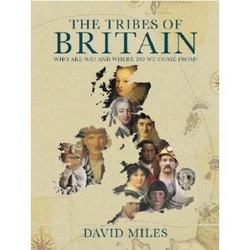
The Tribes of Britain
David Miles
This is a thorough book. Well written and well presented, covering quite literally the full span of Britain – using archaeology through to government data to offer a picture of the changing face of this archipelago (mainly England, Scotland, Wales and Ireland). But the book is also fascinating in its ability to answers many of those questions asked by non natives or curious natives to which we cannot definitely answer. Namely where does burgh or pool etc come from at the end of village and town names. Or how does that surname relate to ones identity. As well as the English language’s ability to absorb more than any other because it has been moveable more than perhaps any other – for example the County system from the continent. Whilst words such as sister or many of our physical attributes (Skin, neck, or leg) and by some shorter and punchier words (Ugly, fat) all have Scandinavian roots. French words in English on the other hand are more fancy – or based around institutions and religion. Despite often assumed - Sheriffs are not Scottish and we could have taken the saxon nach or sassanch route as opposed to the Angles who are still growing.
Shampooing popularised by an Indian immigrant (via Cork) to Brighton in early 19th Century. Such fascinating facts abound about both British Romans, Normans, Saxons, Angles and even ‘British’ French Hugenots. There is also an interesting write up about the Jewish presence in Britain – without holding back on the guilt of the ‘locals’!
An interesting fact pointed out in the book is that there was no native speaking king in England between the years 1066 – 1400 – and this is the crux of the book. Not so much those dates, but the realities of our ever changing make up mean this book should be compulsory reading for any racist! (We can but dream) – as it runs through how every century (right up to 21st) is an amalgam of hybrid peoples who have co existed to create what we are today. Thoroughly researched from a life immersed in history and archaeology.
David Miles
This is a thorough book. Well written and well presented, covering quite literally the full span of Britain – using archaeology through to government data to offer a picture of the changing face of this archipelago (mainly England, Scotland, Wales and Ireland). But the book is also fascinating in its ability to answers many of those questions asked by non natives or curious natives to which we cannot definitely answer. Namely where does burgh or pool etc come from at the end of village and town names. Or how does that surname relate to ones identity. As well as the English language’s ability to absorb more than any other because it has been moveable more than perhaps any other – for example the County system from the continent. Whilst words such as sister or many of our physical attributes (Skin, neck, or leg) and by some shorter and punchier words (Ugly, fat) all have Scandinavian roots. French words in English on the other hand are more fancy – or based around institutions and religion. Despite often assumed - Sheriffs are not Scottish and we could have taken the saxon nach or sassanch route as opposed to the Angles who are still growing.
Shampooing popularised by an Indian immigrant (via Cork) to Brighton in early 19th Century. Such fascinating facts abound about both British Romans, Normans, Saxons, Angles and even ‘British’ French Hugenots. There is also an interesting write up about the Jewish presence in Britain – without holding back on the guilt of the ‘locals’!
An interesting fact pointed out in the book is that there was no native speaking king in England between the years 1066 – 1400 – and this is the crux of the book. Not so much those dates, but the realities of our ever changing make up mean this book should be compulsory reading for any racist! (We can but dream) – as it runs through how every century (right up to 21st) is an amalgam of hybrid peoples who have co existed to create what we are today. Thoroughly researched from a life immersed in history and archaeology.
Kathleen Burk: Old World, New World: The Story of Britain and America
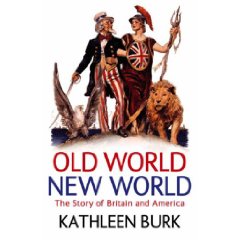
Old World, New World: The Story of Britain and America
Kathleen Burk
2007
A fascinating and detailed tome which covers the history of Britain and the US and their relationship. Dealing with hypocrisy and deception on both sides but also the abiding and unavoidable close relationship forged from a shared cultural background.
The detail and depth of this tome are truly amazing. However with that running at well over 800 pages this book is not for the feint hearted!
Very lucid, well written and despite its size – because of the time frames involved it is only really an over view with some fascinating facts and insights into two power houses and the shift of power between them (and to and from them). Covering, as it does from 1607 (a full 400 years) it is not surprising that each chapter is like reading a book in itself (and an important note - one can do this without losing the overall value of the book). But it also manages to bring the reader along as a full narrative, updating and leading the reader through a larger picture whilst still feeling able to relate to each period in isolation. For example - there is enough detail on occurrences like the annexation of Texas in the mid 19th century – a subject I knew little (or nothing!) about – without swamping the reader. During this period it also focuses interestingly on the political and cultural (marriages) – often to the detriment of perhaps more pragmatic business links
Factual and grammatical errors are to be expected in this size book, but they are few and far between.
The one recurring theme is an aspect of distrust within the US at what are perceived as predetermined actions from across the water, and the brashness of the younger
country’s actions. But it also highlights Britain’s lack of empathy and tactlessness, both on an individual and consequently national basis in their coverage and dealings with the burgeoning US. The obvious role reversal over past centuries is highlighted, but not dwelt on too deeply and the crippling effect on Britain of being completely involved in two world wars in the early 20th Century is dealt with in accurate detail.
Perhaps the real success of this book is that (despite some reviewers errors) Burk never confuses England and Great Britain – presenting with clarity where it is relevant (Scots influence particularly).
Clearly due to the nature and subject a lot has been missed out – but as an overview of a vast breadth of time it is almost faultless (typo’s excluding!)
Kathleen Burk
2007
A fascinating and detailed tome which covers the history of Britain and the US and their relationship. Dealing with hypocrisy and deception on both sides but also the abiding and unavoidable close relationship forged from a shared cultural background.
The detail and depth of this tome are truly amazing. However with that running at well over 800 pages this book is not for the feint hearted!
Very lucid, well written and despite its size – because of the time frames involved it is only really an over view with some fascinating facts and insights into two power houses and the shift of power between them (and to and from them). Covering, as it does from 1607 (a full 400 years) it is not surprising that each chapter is like reading a book in itself (and an important note - one can do this without losing the overall value of the book). But it also manages to bring the reader along as a full narrative, updating and leading the reader through a larger picture whilst still feeling able to relate to each period in isolation. For example - there is enough detail on occurrences like the annexation of Texas in the mid 19th century – a subject I knew little (or nothing!) about – without swamping the reader. During this period it also focuses interestingly on the political and cultural (marriages) – often to the detriment of perhaps more pragmatic business links
Factual and grammatical errors are to be expected in this size book, but they are few and far between.
The one recurring theme is an aspect of distrust within the US at what are perceived as predetermined actions from across the water, and the brashness of the younger
country’s actions. But it also highlights Britain’s lack of empathy and tactlessness, both on an individual and consequently national basis in their coverage and dealings with the burgeoning US. The obvious role reversal over past centuries is highlighted, but not dwelt on too deeply and the crippling effect on Britain of being completely involved in two world wars in the early 20th Century is dealt with in accurate detail.
Perhaps the real success of this book is that (despite some reviewers errors) Burk never confuses England and Great Britain – presenting with clarity where it is relevant (Scots influence particularly).
Clearly due to the nature and subject a lot has been missed out – but as an overview of a vast breadth of time it is almost faultless (typo’s excluding!)
Rose Doyle: Heroes of Jadotville
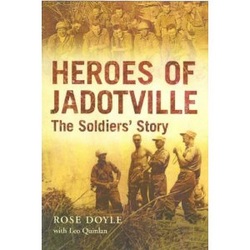
Heroes of Jadotville: The Soldier’s Story
Rose Doyle (with Leo Quinlan)
This is a well structured fascinating book for those with an interest in military history – or politics, although it loses its way slightly part way through. Divided into 3 clear sections, a kind of before, during and after of the events of the Katanga conflict in the Congo that took place over 4 days in 1961. Using interviews and eye witness accounts
Doyle makes no secret of her heavy reliance on the insight and balanced judgement of the commanding officer Commandant Pat Quinlan. Portrayed afterwards as cowards, (surrendering to the rebels) the facts point more to the futility of the situation and the calm considered attitude adopted by the commander. This book helps to highlight the absurdity of the task in front of them once they had been deserted by international politics (or indeed their own government). But it also captures the confusion and lack of information filtering its way home to families of all the soldiers – who at one point were reported as slaughtered. Easy to read – but as mentioned loses its way and gets a bit ‘boring’ / repetitive towards the end.
Rose Doyle (with Leo Quinlan)
This is a well structured fascinating book for those with an interest in military history – or politics, although it loses its way slightly part way through. Divided into 3 clear sections, a kind of before, during and after of the events of the Katanga conflict in the Congo that took place over 4 days in 1961. Using interviews and eye witness accounts
Doyle makes no secret of her heavy reliance on the insight and balanced judgement of the commanding officer Commandant Pat Quinlan. Portrayed afterwards as cowards, (surrendering to the rebels) the facts point more to the futility of the situation and the calm considered attitude adopted by the commander. This book helps to highlight the absurdity of the task in front of them once they had been deserted by international politics (or indeed their own government). But it also captures the confusion and lack of information filtering its way home to families of all the soldiers – who at one point were reported as slaughtered. Easy to read – but as mentioned loses its way and gets a bit ‘boring’ / repetitive towards the end.
Harvey/White: The Barracks.
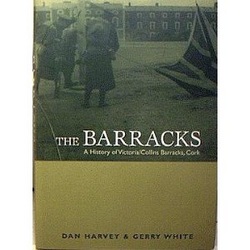
The Barracks,: A History of Victoria/Collins Barracks
Dan Harvey & Gerry White
The Barracks is an interesting, detailed book but, as the authors concede themselves, in no way the definitive book on the history of the Cork Barracks, (variously known as Victoria Barracks and Collins Barracks). One major criticism is this book is perhaps too focused on a lot of what was going on outside the barracks, which clearly had an influence on the barracks themselves, but at the expense on day to day or viewing of the barracks life. The IRB and other periphery maintain the focus as perhaps the politics of the two authors gives way as opposed to the interesting life of the institution.
Dan Harvey & Gerry White
The Barracks is an interesting, detailed book but, as the authors concede themselves, in no way the definitive book on the history of the Cork Barracks, (variously known as Victoria Barracks and Collins Barracks). One major criticism is this book is perhaps too focused on a lot of what was going on outside the barracks, which clearly had an influence on the barracks themselves, but at the expense on day to day or viewing of the barracks life. The IRB and other periphery maintain the focus as perhaps the politics of the two authors gives way as opposed to the interesting life of the institution.
Edward Abbey: Hayduke Live
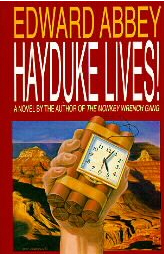
Hayduke lives
Edward Abbey
Following on from the iconic and controversial satire the Monkey Wrench gang this (as the title gives away) pairs together the same motley crew in one last escapade. Edward abbey’s usual well written selection of snippets. Short punchy chapters. Cliched in the extreme, but insightful and witty always. Sometimes a little simplistic, but always funny. A little predictable and caricatured in its writing and presentation this is still an amusing book with glimpses of the wry humour that Edward Abbey so well encapsulates for many of his readers (Armchair anarchists almost to a man).
As always he captures brilliantly the contradictory apathy and action of the ineffectual nature of said armchair activist – passive supporter – but realistic consumer and end user – greedy, lazy, but ultimately caring!
A mass melee of contradictory sense and actions and feelings and opinions that we all are – but either don’t allow ourselves to see or seldom acknowledge – the seldom seen ability we all have for noble action, but the overwhelming sloth like inaction that strikes us all. All limitlessly talented but all wastefully lounging!
Edward Abbey
Following on from the iconic and controversial satire the Monkey Wrench gang this (as the title gives away) pairs together the same motley crew in one last escapade. Edward abbey’s usual well written selection of snippets. Short punchy chapters. Cliched in the extreme, but insightful and witty always. Sometimes a little simplistic, but always funny. A little predictable and caricatured in its writing and presentation this is still an amusing book with glimpses of the wry humour that Edward Abbey so well encapsulates for many of his readers (Armchair anarchists almost to a man).
As always he captures brilliantly the contradictory apathy and action of the ineffectual nature of said armchair activist – passive supporter – but realistic consumer and end user – greedy, lazy, but ultimately caring!
A mass melee of contradictory sense and actions and feelings and opinions that we all are – but either don’t allow ourselves to see or seldom acknowledge – the seldom seen ability we all have for noble action, but the overwhelming sloth like inaction that strikes us all. All limitlessly talented but all wastefully lounging!
Michael Wood: In Search Of The Trojan War
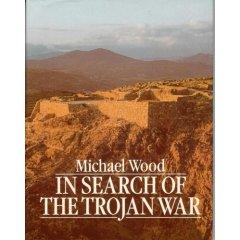
In Search Of The Trojan War
Michael Wood.
1985
Written back in 1984 for one of Michael Woods earliest TV series (he is now instantly recognisable for many other Ancient History programmes) this book puts forward a compelling set of chapters for the argument in favour of Troy existing and even the battle involving the famous Trojan horse taking place at its steps. This book also, by necessity, deals with the modern myth of Troy. From Schliemann’s ‘finds’ and their authenticity back to older myth making that has sprung up around these events of well over 10,000 years ago. Whatever the facts surely now they have been lost to the ground? Beyond that the conjecture is compelling and well researched – both with contemporary information and Victorian initial research. The book is an easy read and well structured. Chapters are complete in themselves but all fit together well. From speculation about the key players both in the battle and the world of the time, plus the key players in looking for evidence – be they Thucydides and Herodotus or Schliemann and Elgin.
An interesting introduction to the study of a fascinating event and the subsequent industry and interest that has sprung up around a possible myth of epic Chinese whispers.
Michael Wood.
1985
Written back in 1984 for one of Michael Woods earliest TV series (he is now instantly recognisable for many other Ancient History programmes) this book puts forward a compelling set of chapters for the argument in favour of Troy existing and even the battle involving the famous Trojan horse taking place at its steps. This book also, by necessity, deals with the modern myth of Troy. From Schliemann’s ‘finds’ and their authenticity back to older myth making that has sprung up around these events of well over 10,000 years ago. Whatever the facts surely now they have been lost to the ground? Beyond that the conjecture is compelling and well researched – both with contemporary information and Victorian initial research. The book is an easy read and well structured. Chapters are complete in themselves but all fit together well. From speculation about the key players both in the battle and the world of the time, plus the key players in looking for evidence – be they Thucydides and Herodotus or Schliemann and Elgin.
An interesting introduction to the study of a fascinating event and the subsequent industry and interest that has sprung up around a possible myth of epic Chinese whispers.
Peter Haydon: Beer and Britannia: An Inebriated History of Britain
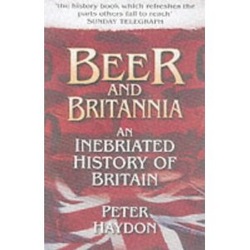
Beer and Britannia: An Inebriated History of Britain
Peter Haydon
The beer Britainnia is only for the clever alliteration this is about Drink in England.
This book is an ‘Ok’ written expedition into English beer, despite the misnomer of the title. Do not be deceived by a desire to make a round peg fit a square hole. …. Clearly the author Peter Haydon found a quote about Beer and Britannia and in slight laziness made it apply to England, which is the subject of this book. As the prologue makes clear We do not hear discussion of the 60/70/80 shilling beers of Scotland
Nor is Guinness given more than passing reference (though English Porter is given an interesting coverage and it is fascinating to see how a product now so closely associated with Ireland held on in its original hometown - London)
Perhaps the most important and interesting aspect is that we do see how finance driven and economies of success are from the 18th Century onwards. Breweries and take over’s feature heavily as economies of scale and increased travel for the product that is beer.
The book itself is good and an interesting read - but it does overlook a couple of important ‘facts’ – Now compared with previous centuries –water is generally drinkable and awareness of the long term damage of drink secondly the real important factor in some declines is bottled beer, its consistent quality and the home drinking phenomenon.
Also sweeping assumptions of knowledge are made about beer, the brewing process and even differences between Ale, Beer and beer that are actually worthy of explanation. Though it does blow out the myth about lager being a 1960’s ‘invention’
The book also makes assumptions about English History more broadly, but these are trivial, overall it is worth a read.
Stated at one point “The 19th Century was a hotch potch of influences and changes. So many different forces were at work within society that trends and patterns must be heavily qualified” and this book is a light read – not a pint of heavy that’s for sure! More like an enjoyable summer shandy!
It is fascinating to see how influential the Dutch import of Gin was from the 17th Century onwards – right up until the 19th Century. King Billy, hero to millions, may have been poisoning his subjects!
Well written and an interesting book. Thoroughly researched and well presented – but overly simplistic at points. It also paints a sad picture of ‘progress’ such as demand and playing on assumption that change is always bad (which it is but indisputably increases revenue!).
Peter Haydon
The beer Britainnia is only for the clever alliteration this is about Drink in England.
This book is an ‘Ok’ written expedition into English beer, despite the misnomer of the title. Do not be deceived by a desire to make a round peg fit a square hole. …. Clearly the author Peter Haydon found a quote about Beer and Britannia and in slight laziness made it apply to England, which is the subject of this book. As the prologue makes clear We do not hear discussion of the 60/70/80 shilling beers of Scotland
Nor is Guinness given more than passing reference (though English Porter is given an interesting coverage and it is fascinating to see how a product now so closely associated with Ireland held on in its original hometown - London)
Perhaps the most important and interesting aspect is that we do see how finance driven and economies of success are from the 18th Century onwards. Breweries and take over’s feature heavily as economies of scale and increased travel for the product that is beer.
The book itself is good and an interesting read - but it does overlook a couple of important ‘facts’ – Now compared with previous centuries –water is generally drinkable and awareness of the long term damage of drink secondly the real important factor in some declines is bottled beer, its consistent quality and the home drinking phenomenon.
Also sweeping assumptions of knowledge are made about beer, the brewing process and even differences between Ale, Beer and beer that are actually worthy of explanation. Though it does blow out the myth about lager being a 1960’s ‘invention’
The book also makes assumptions about English History more broadly, but these are trivial, overall it is worth a read.
Stated at one point “The 19th Century was a hotch potch of influences and changes. So many different forces were at work within society that trends and patterns must be heavily qualified” and this book is a light read – not a pint of heavy that’s for sure! More like an enjoyable summer shandy!
It is fascinating to see how influential the Dutch import of Gin was from the 17th Century onwards – right up until the 19th Century. King Billy, hero to millions, may have been poisoning his subjects!
Well written and an interesting book. Thoroughly researched and well presented – but overly simplistic at points. It also paints a sad picture of ‘progress’ such as demand and playing on assumption that change is always bad (which it is but indisputably increases revenue!).
Tim O’Brien: If I die in a combat zone

Tim O’Brien
If I die in a combat zone
Well written gritty realistic short over view of Tim O’Brien own time in a war zone – from the initial draft to the journey home (not in a casket).
Capturing war, in its graphic detail, its boredom, its fears, about soldiers and officers Capturing in all his characters the human identities – some are flawed others are brave but neither is mutually exclusive. O’Brien is a thinker and the reader is offered the inside view on war. He is not ‘brave’ enough to run away conforming to societies demands and not willing to let down his family (or spend the rest of his life in Sweden!)
This book is, I believe, an autobiography of sorts – but is very similar to an amazing ‘fictional’ short story he wrote elsewhere in a collection. The short story is called ’The Things they carried’ and is a compact version of the story that is far more intense and worth consulting first.
Mark Oliver Everett: Things the Grandchildren should know
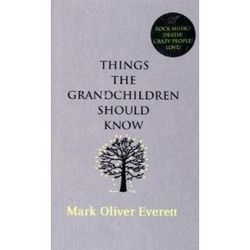
Things the Grandchildren Should Know
Mark Oliver Everett
Immediately disarming this book is amiably written with a personal and intimate approach. Mark Everett was and is the lead singer and main man behind the successful band The Eels. And he has managed, in the telling of his story, to create a disarming, charming but very real picture over harrowing events that took place in his life – from family crises to surreal, but ever so real, events such as a plane crash on his front lawn!
Such events are dealt with in a very light weight and simplistic manner – but in doing so they achieve and highlight the fragile honesty with which Everett deals with life.
You do not need to be a fan of the Eels or their music - The music is only really dealt with in passing, but it is the life of the protagonist that we follow – as he stumbles from one episode to another – seemingly unable to escape an unfortunate set of circumstance that befell his family. (Father collapses on his bed, dead, sister gang raped, mother dies slowly from Cancer). In isolation these events do not make the story so compelling – but it is well written and structured. Not genius, or maybe it is, but definitely intersting and compelling.
Mark Oliver Everett
Immediately disarming this book is amiably written with a personal and intimate approach. Mark Everett was and is the lead singer and main man behind the successful band The Eels. And he has managed, in the telling of his story, to create a disarming, charming but very real picture over harrowing events that took place in his life – from family crises to surreal, but ever so real, events such as a plane crash on his front lawn!
Such events are dealt with in a very light weight and simplistic manner – but in doing so they achieve and highlight the fragile honesty with which Everett deals with life.
You do not need to be a fan of the Eels or their music - The music is only really dealt with in passing, but it is the life of the protagonist that we follow – as he stumbles from one episode to another – seemingly unable to escape an unfortunate set of circumstance that befell his family. (Father collapses on his bed, dead, sister gang raped, mother dies slowly from Cancer). In isolation these events do not make the story so compelling – but it is well written and structured. Not genius, or maybe it is, but definitely intersting and compelling.
Angela Carter: The Bloody Chamber
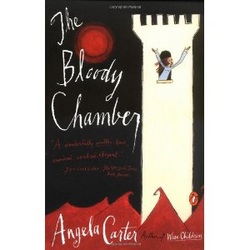
Angela Carter
The Bloody chamber
A collection of 10 short stories – or interpretations of classic fables – not all of which are immediately recognisable to those brought up in the English language culture
But all are colourfully written in expressive powerful floral language and tell the colourful stories of women and their lusts and the theme of loss of virginity or tasting of the apple in abundance. – in the face of the over powering male powers……
Some are Suffocating, others slight – but all are captivatingly written by a wordsmith. Magnificent and worth your time.
The Bloody chamber
A collection of 10 short stories – or interpretations of classic fables – not all of which are immediately recognisable to those brought up in the English language culture
But all are colourfully written in expressive powerful floral language and tell the colourful stories of women and their lusts and the theme of loss of virginity or tasting of the apple in abundance. – in the face of the over powering male powers……
Some are Suffocating, others slight – but all are captivatingly written by a wordsmith. Magnificent and worth your time.

